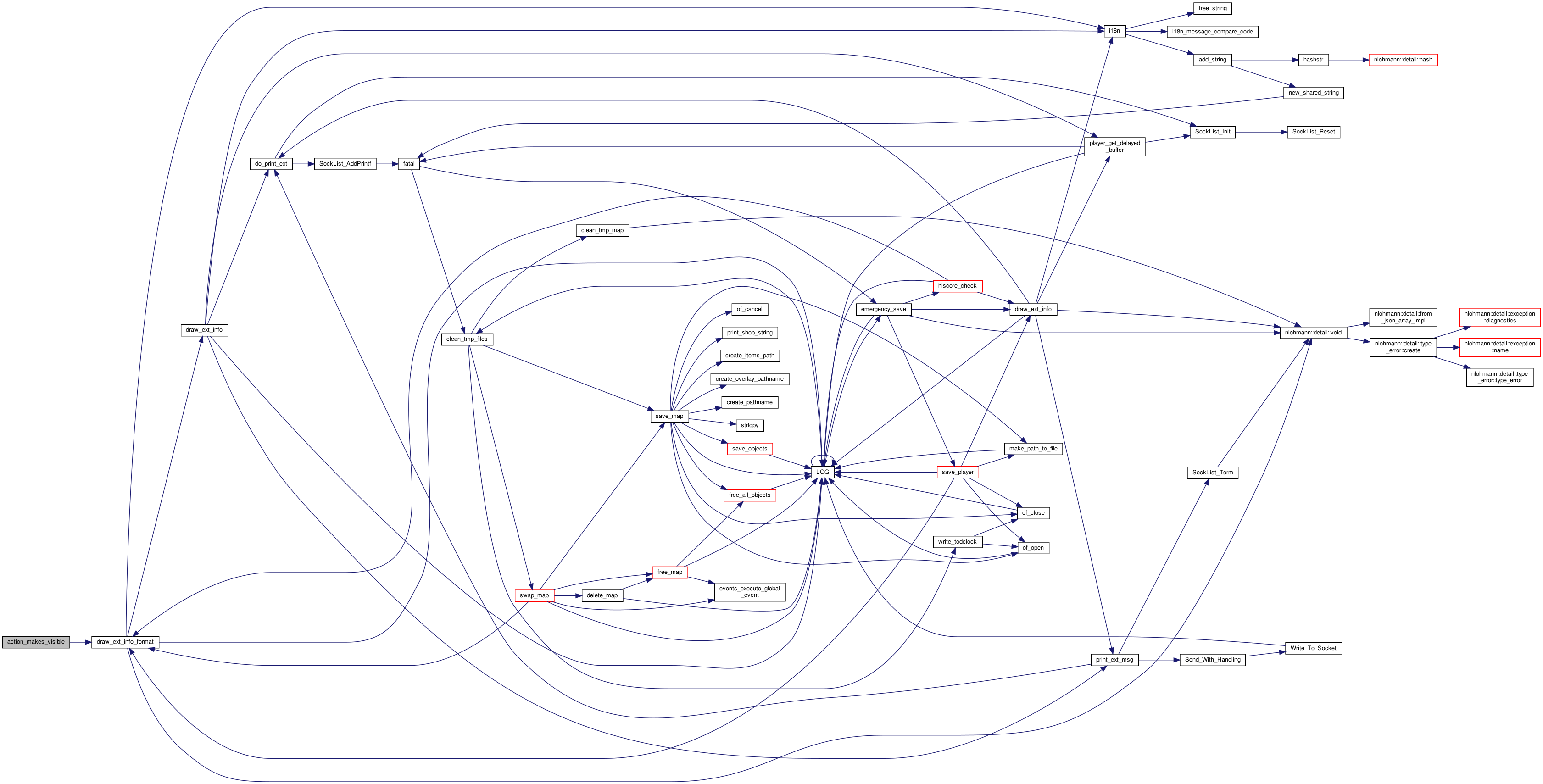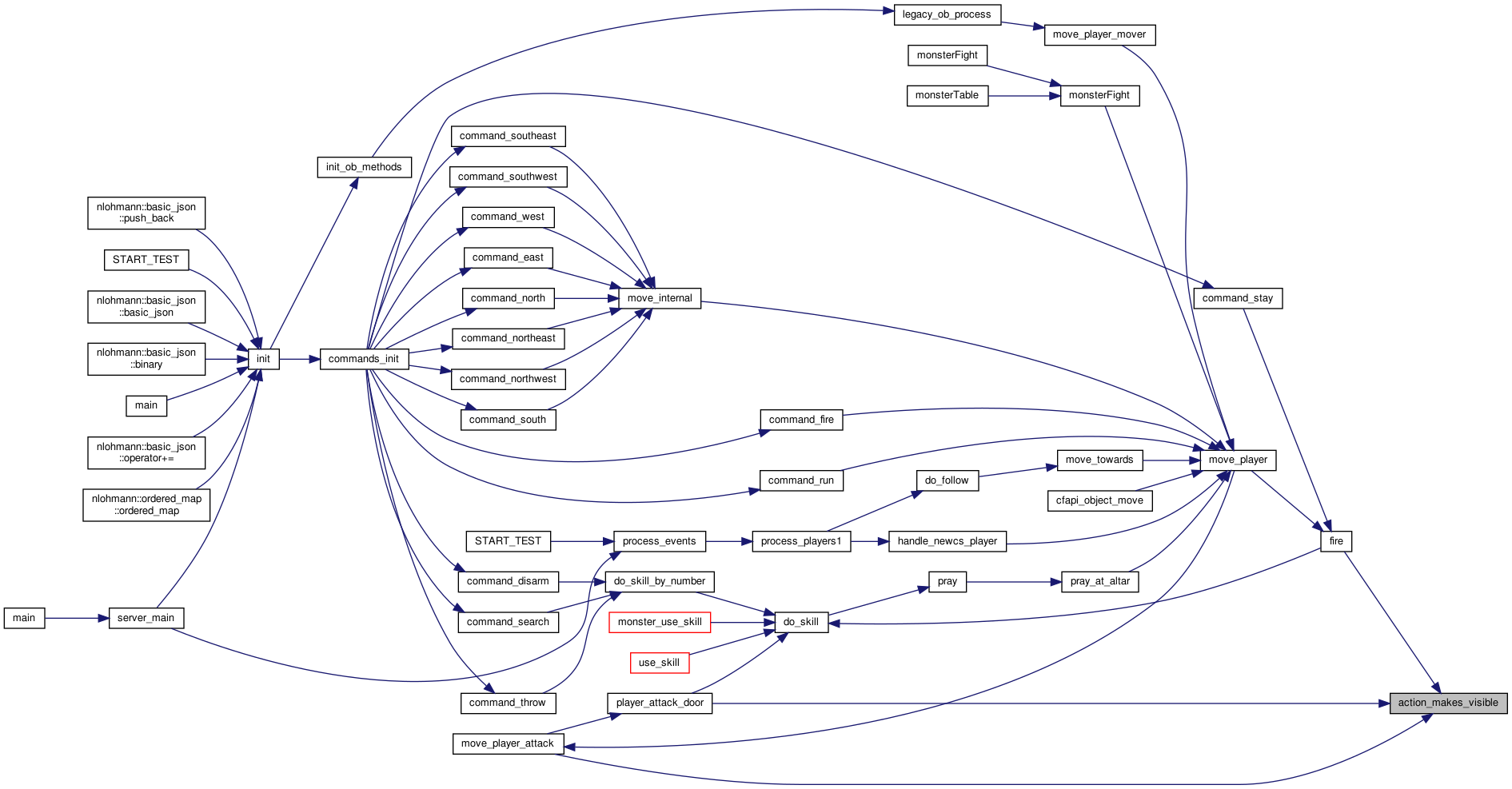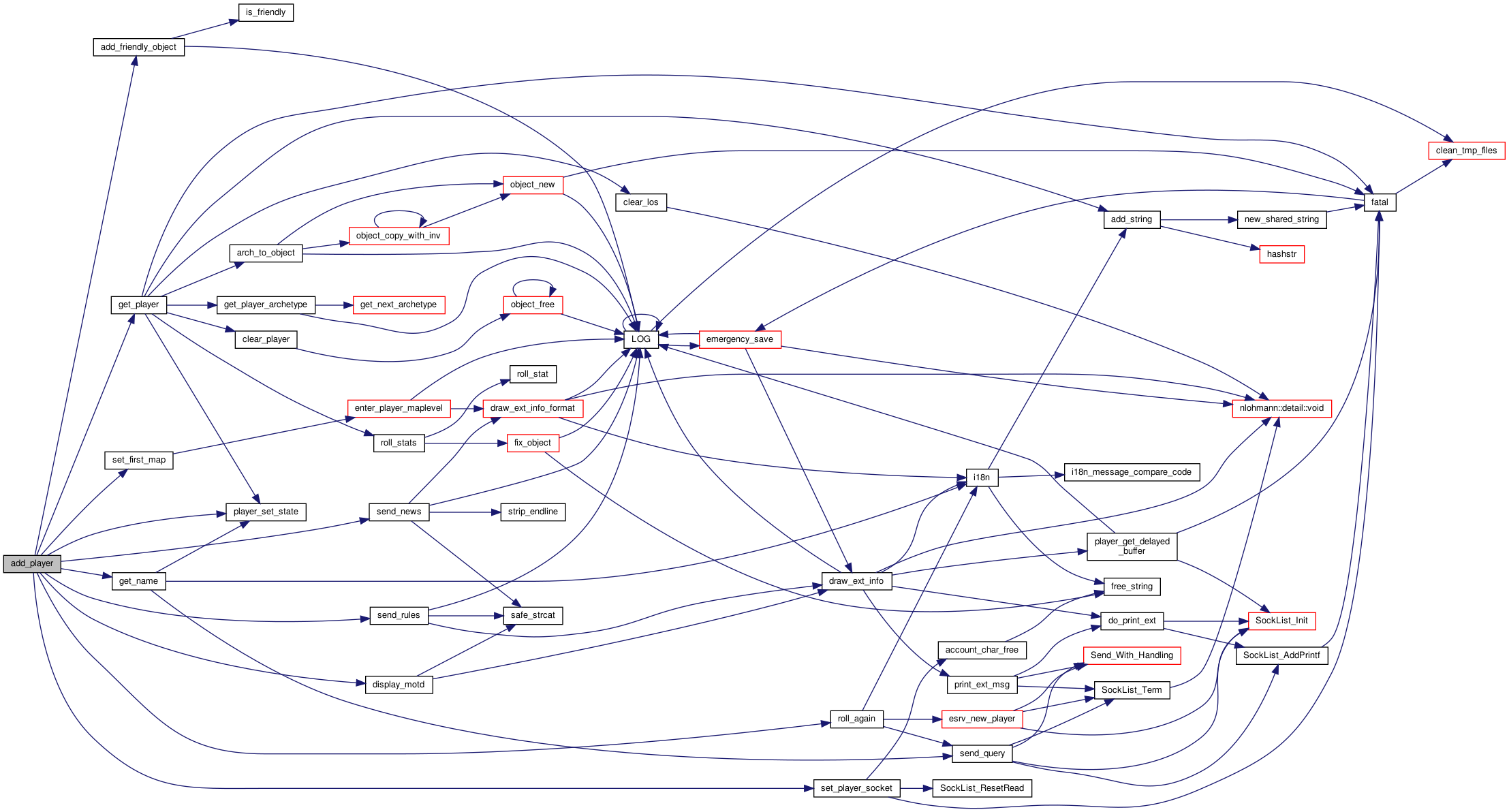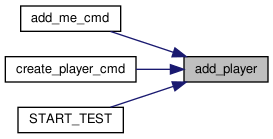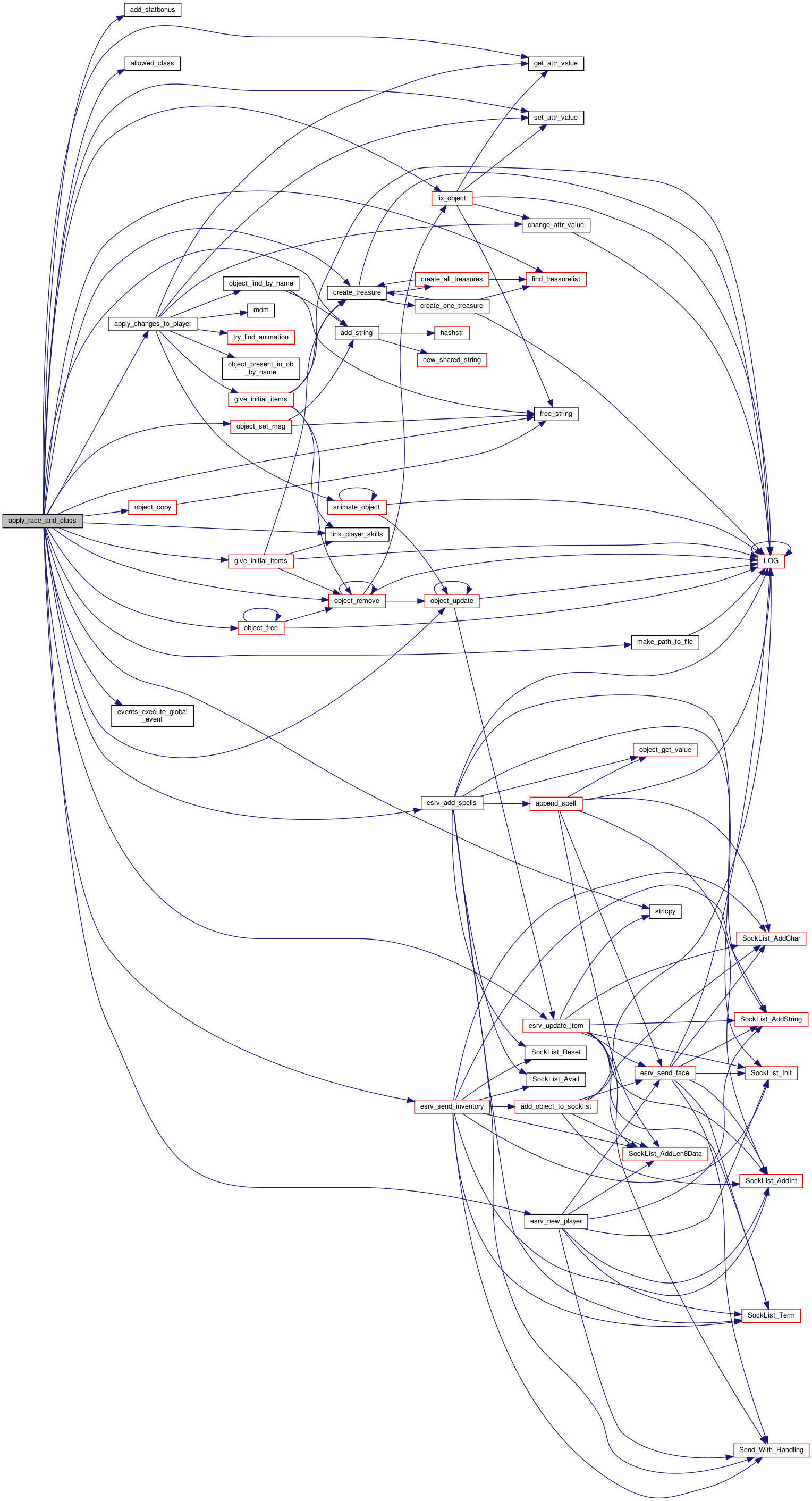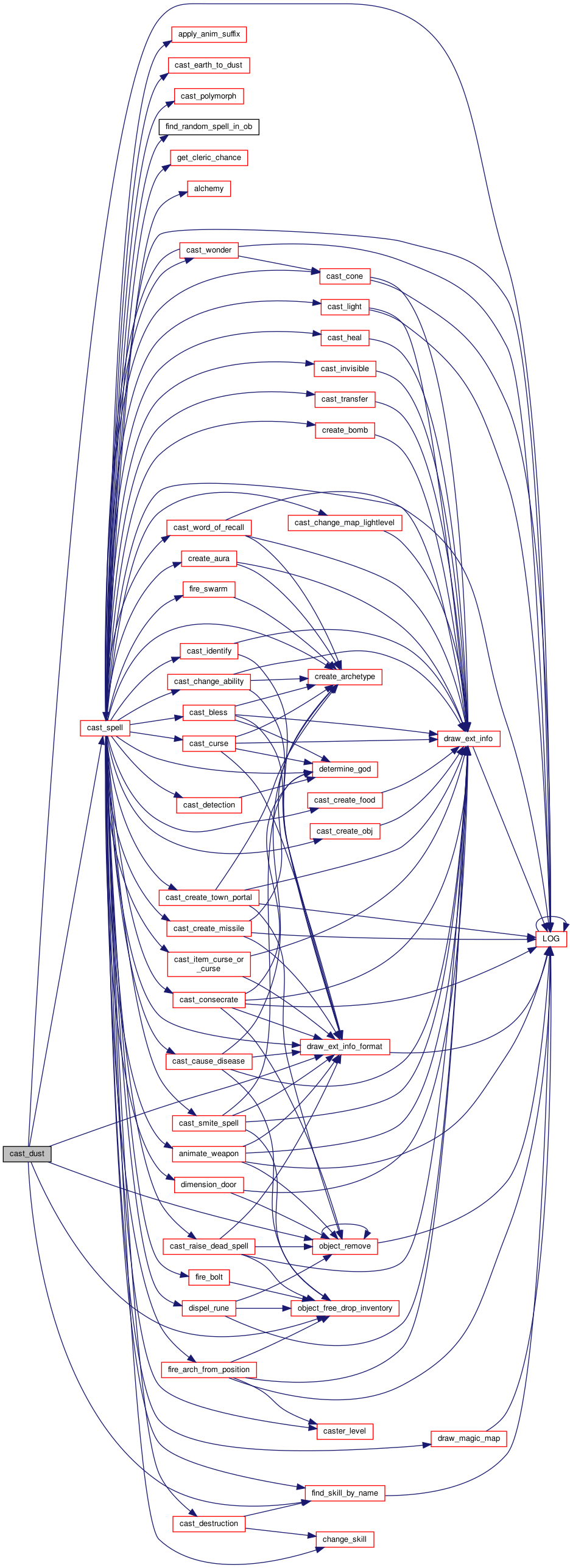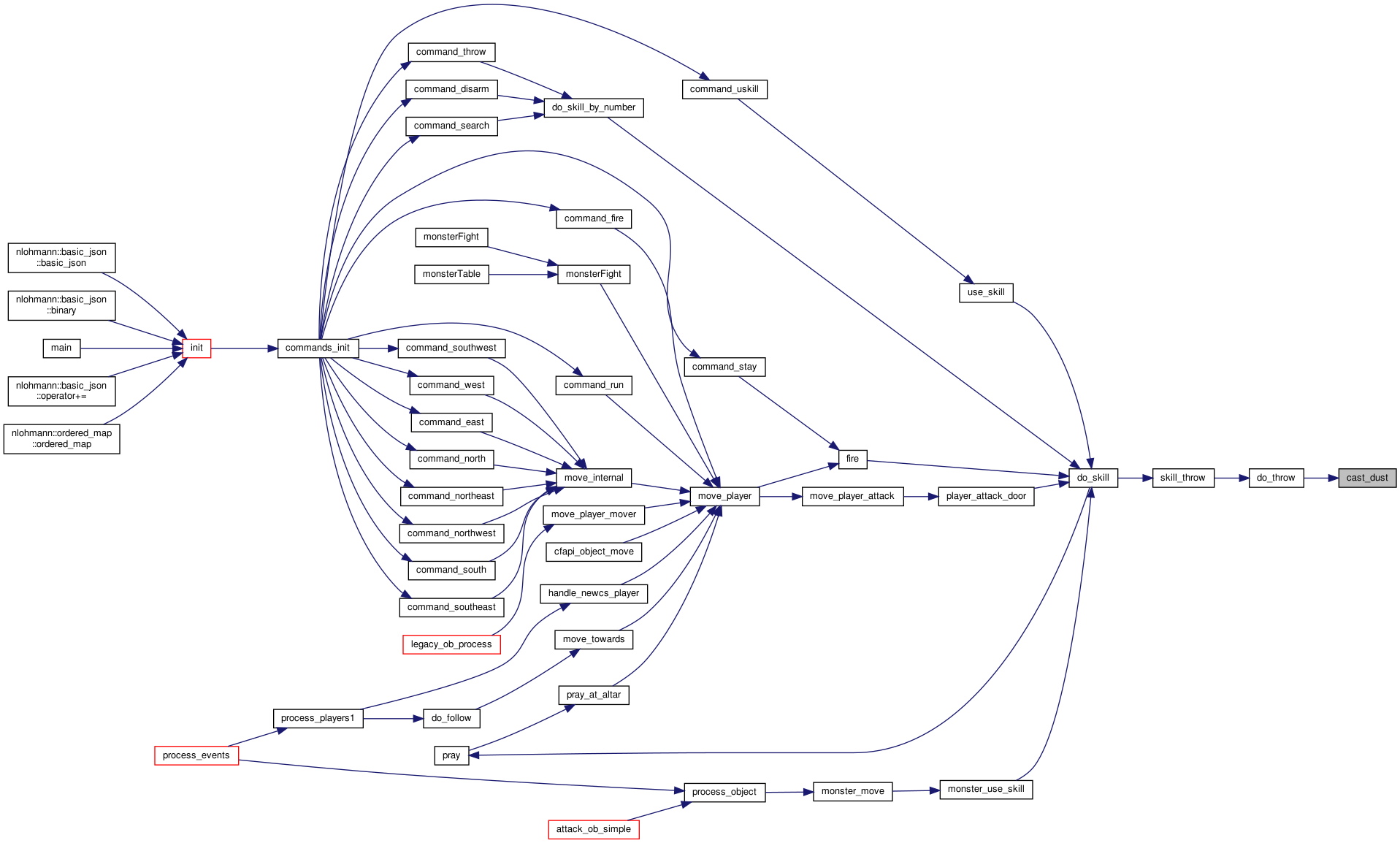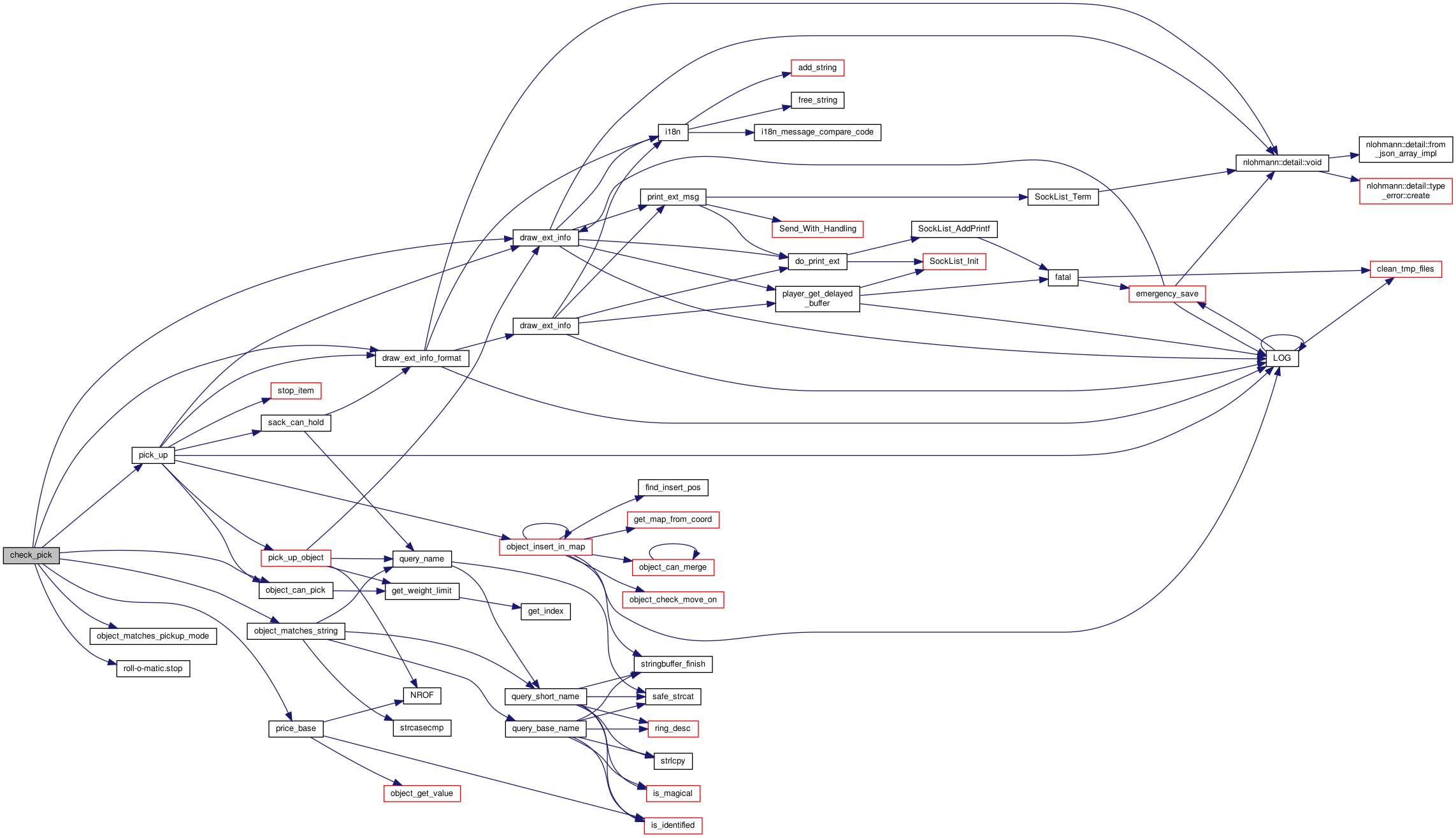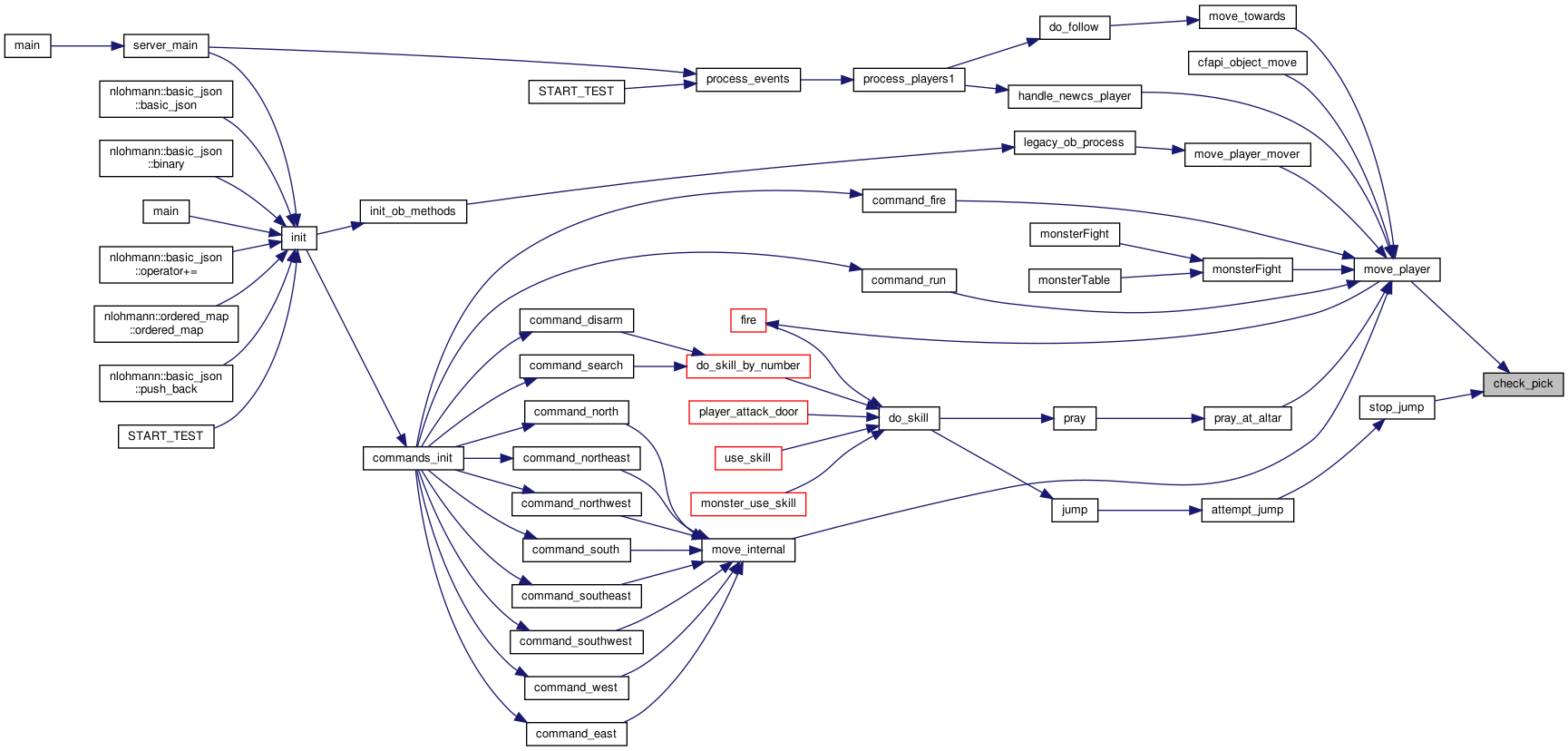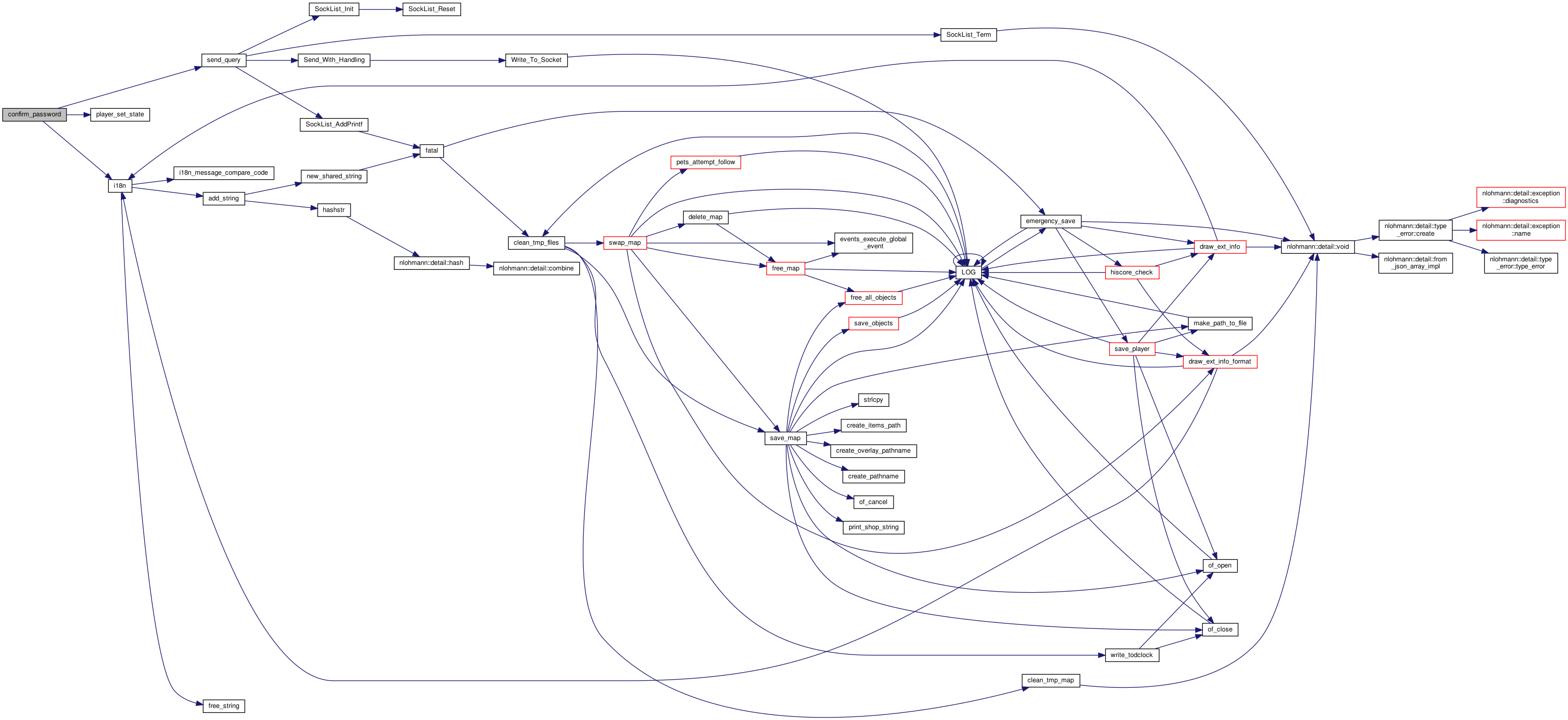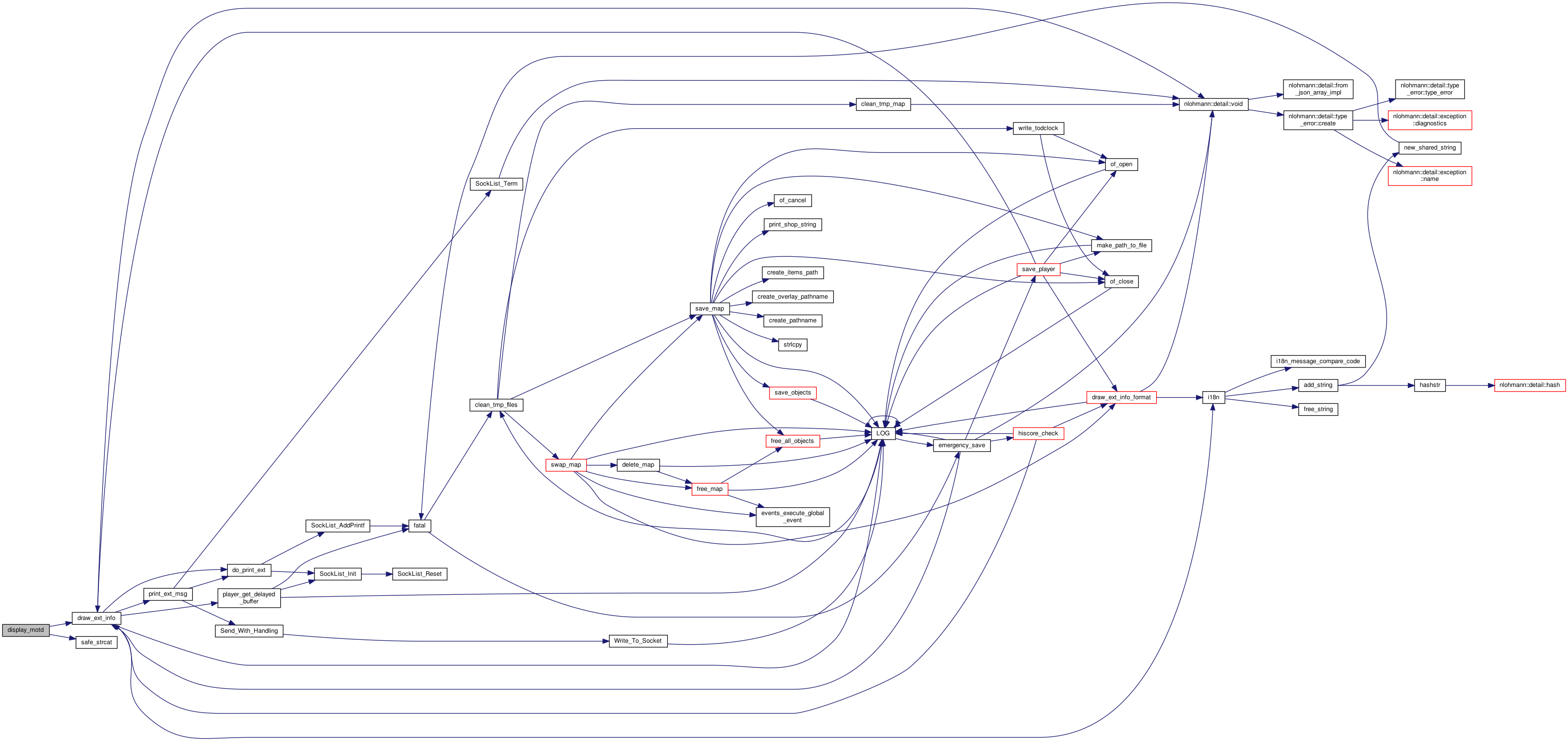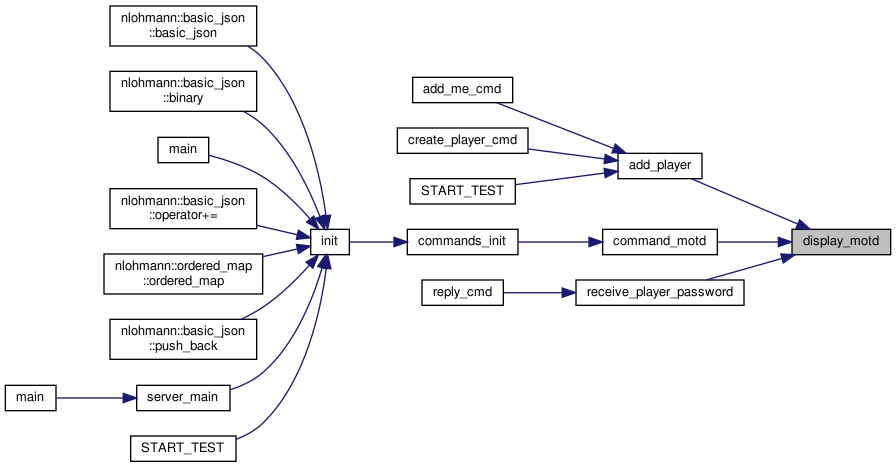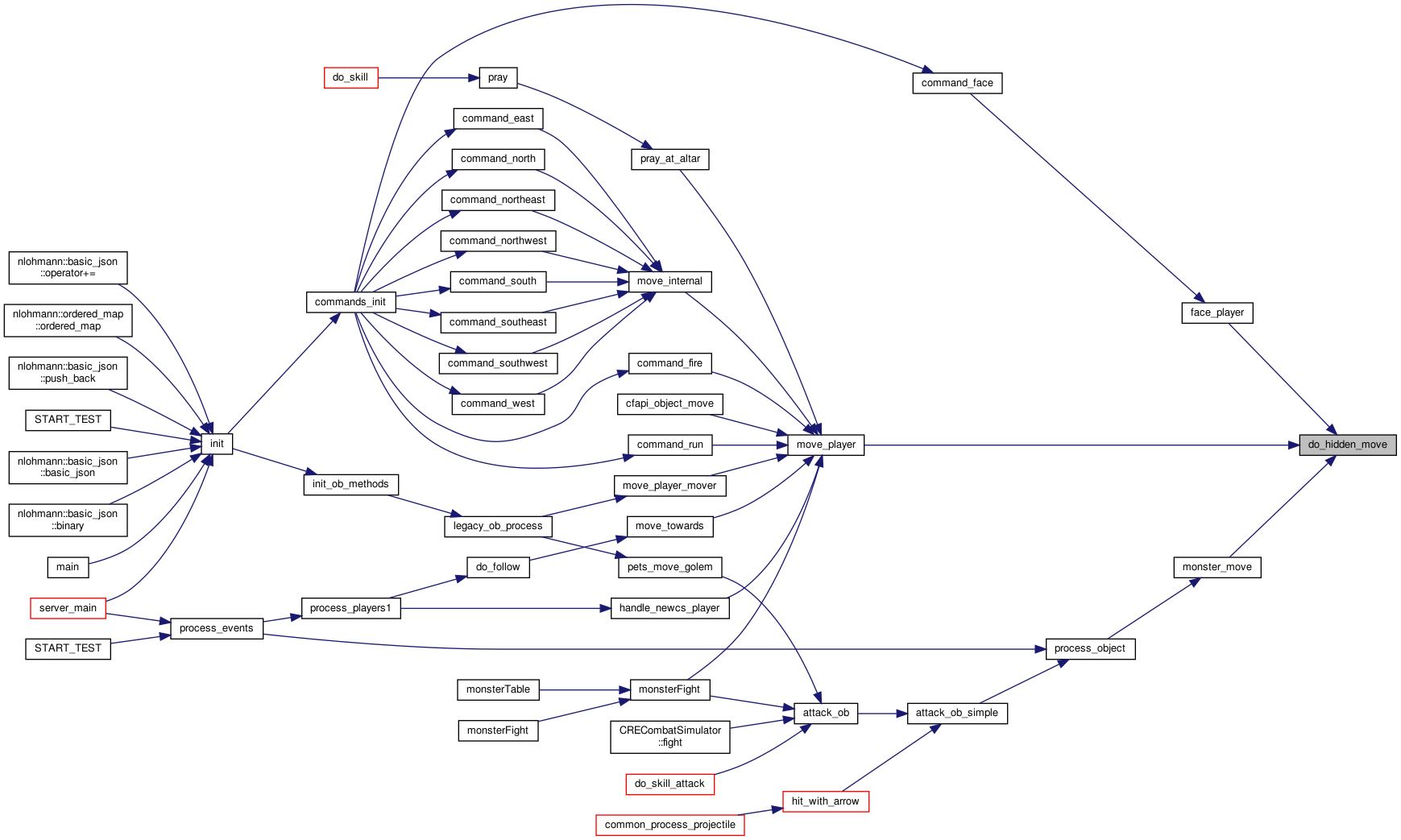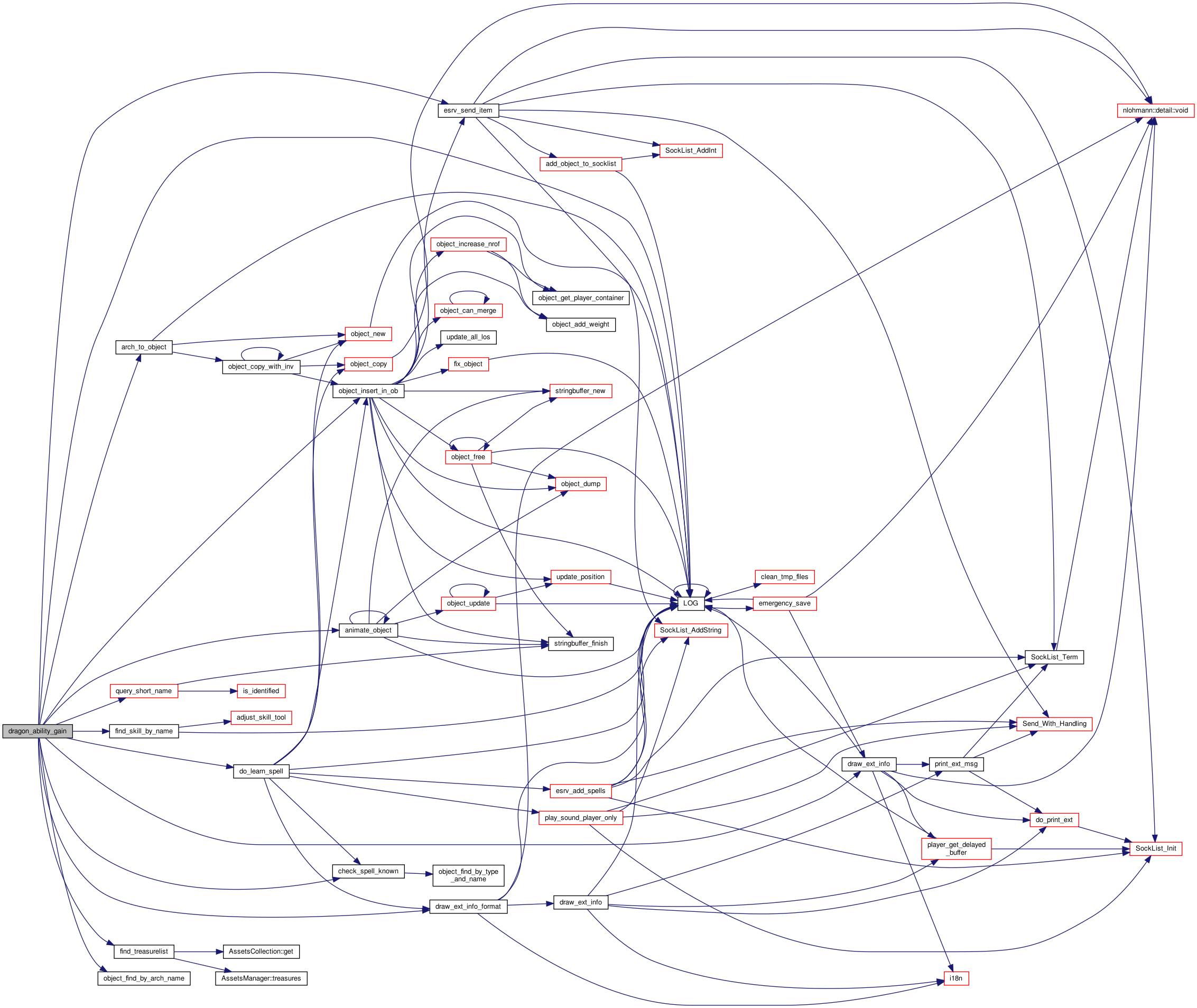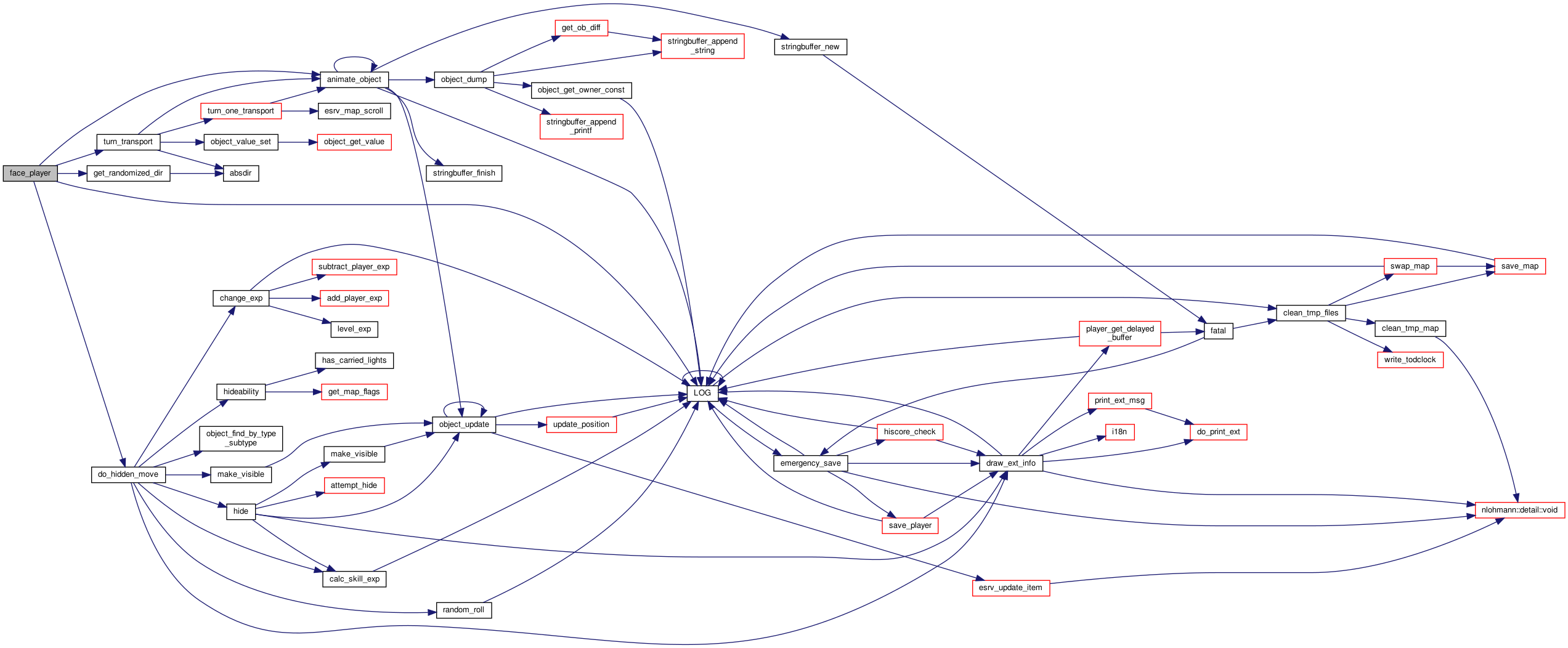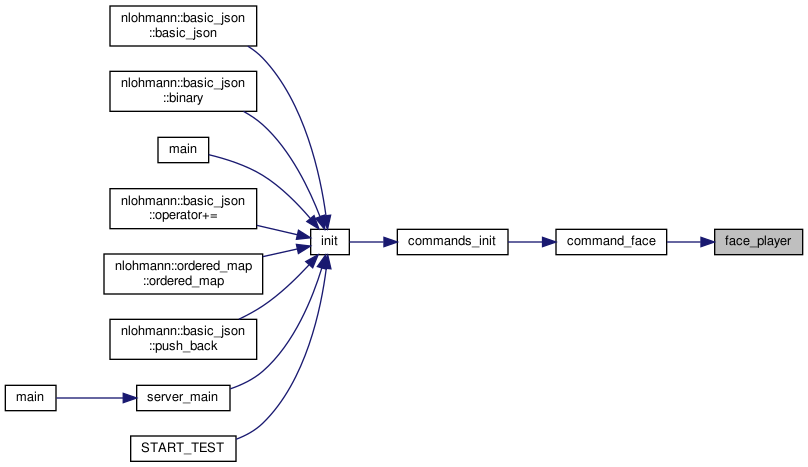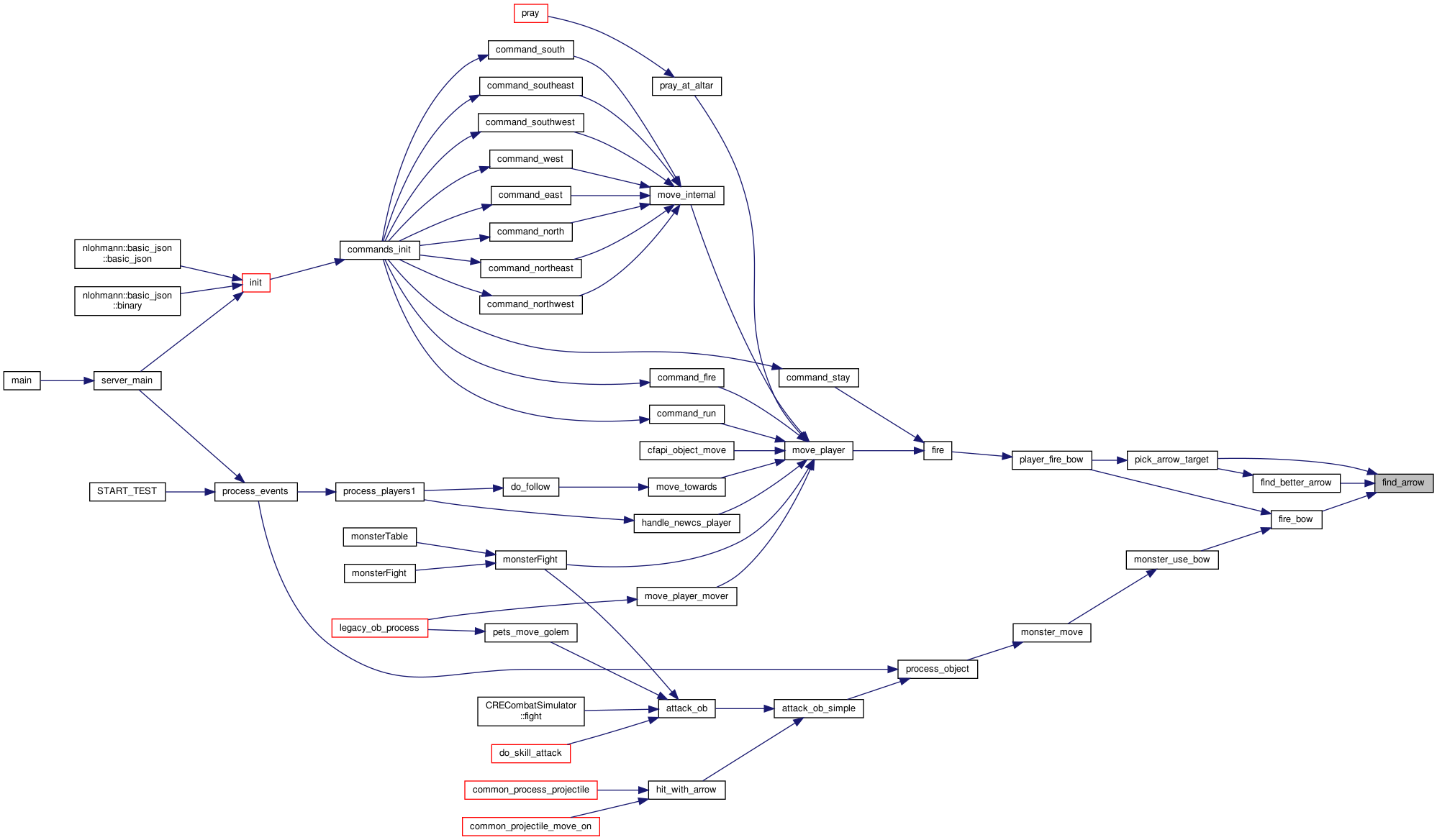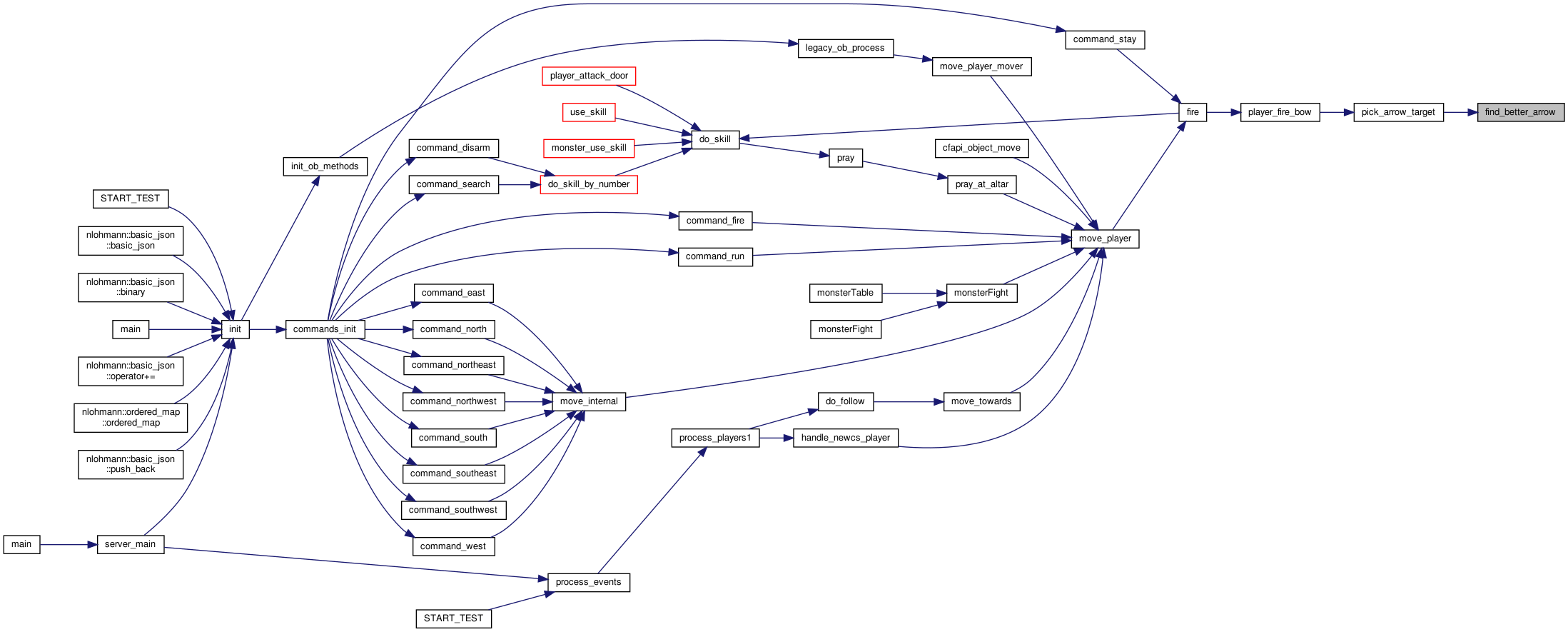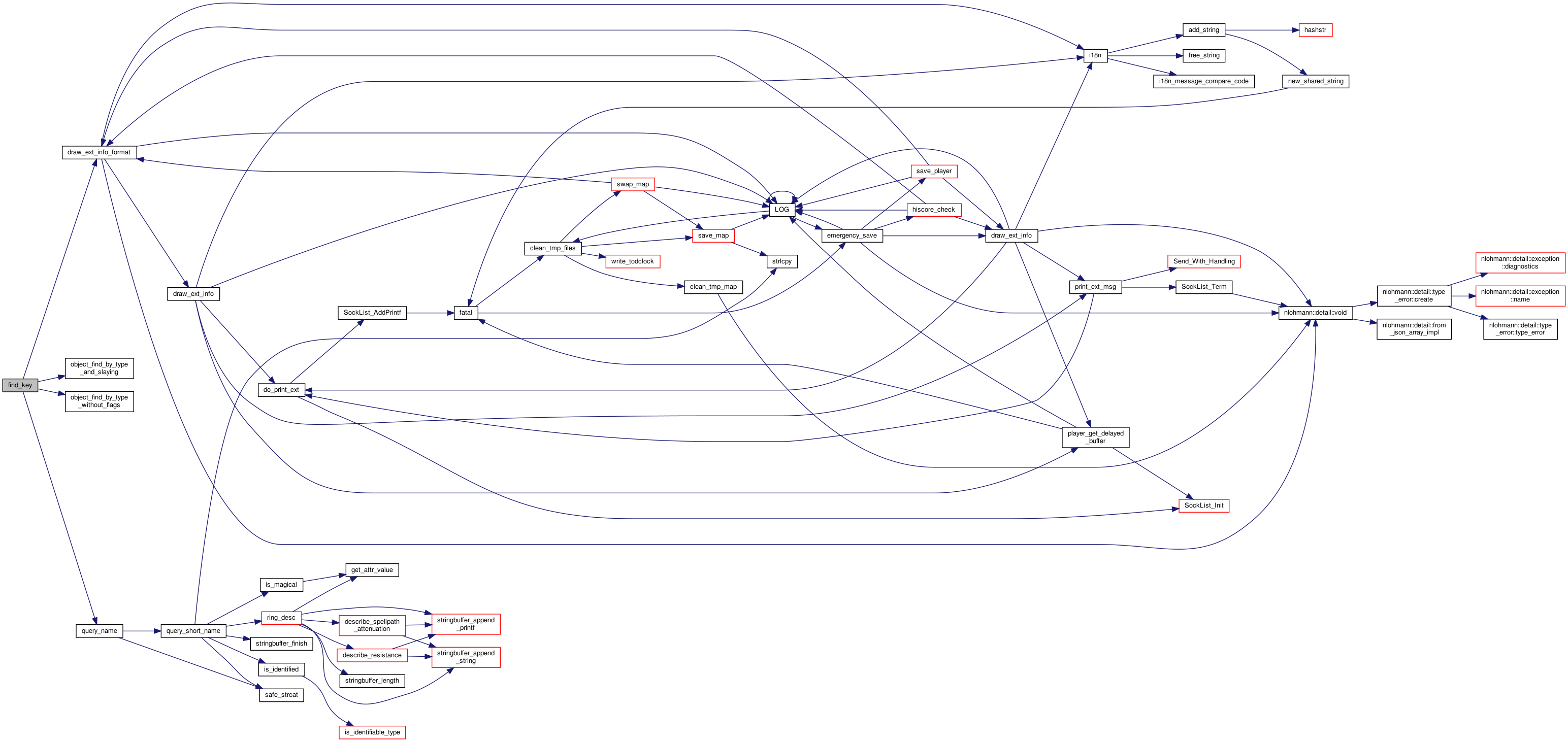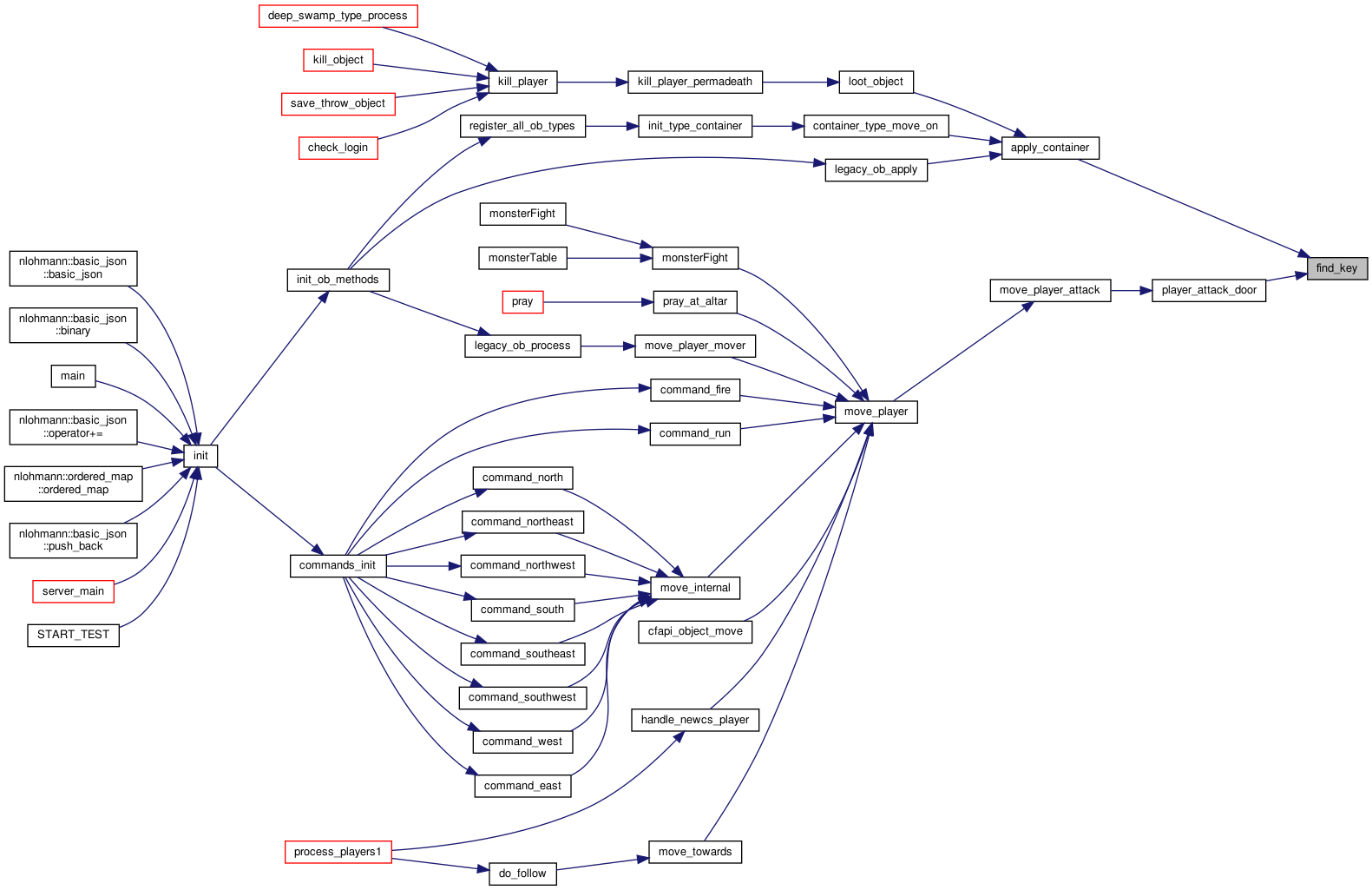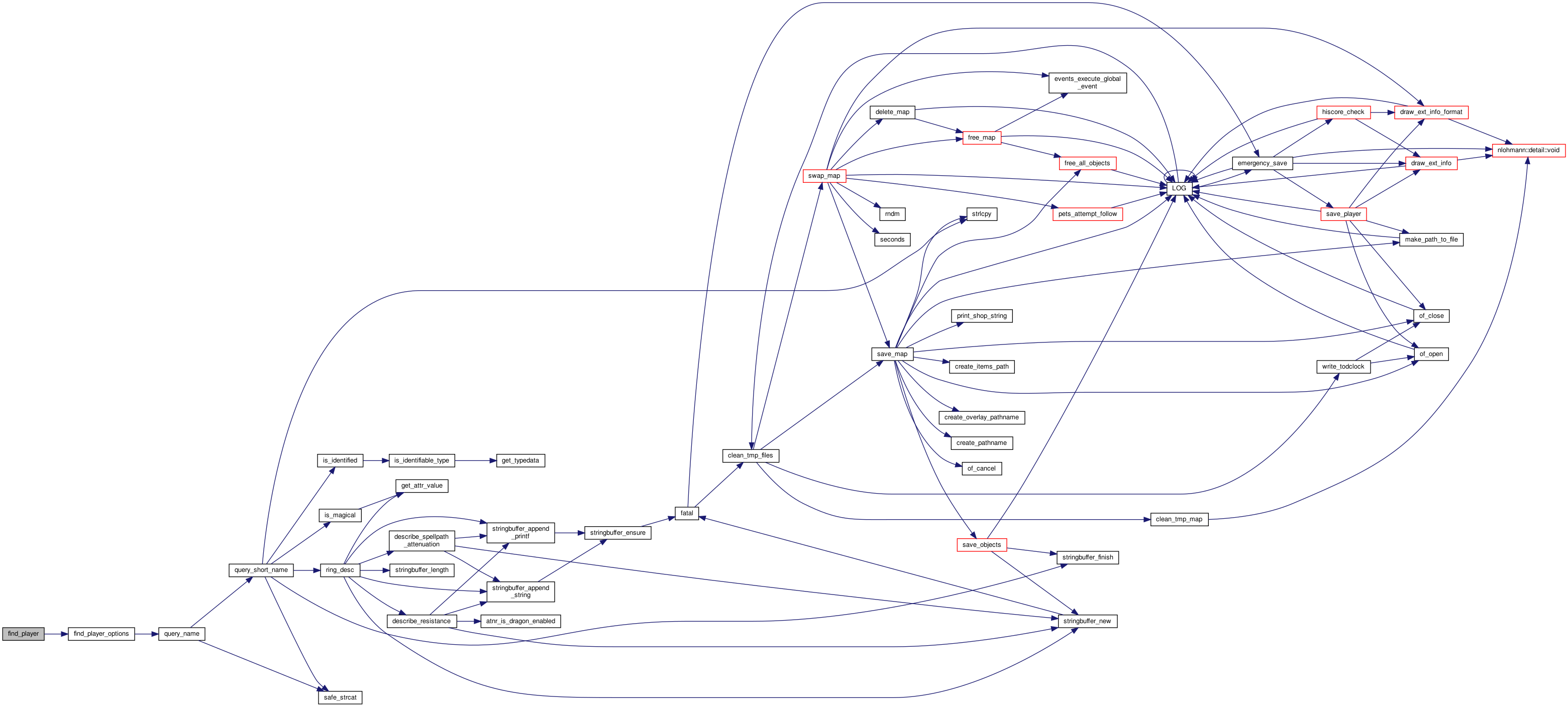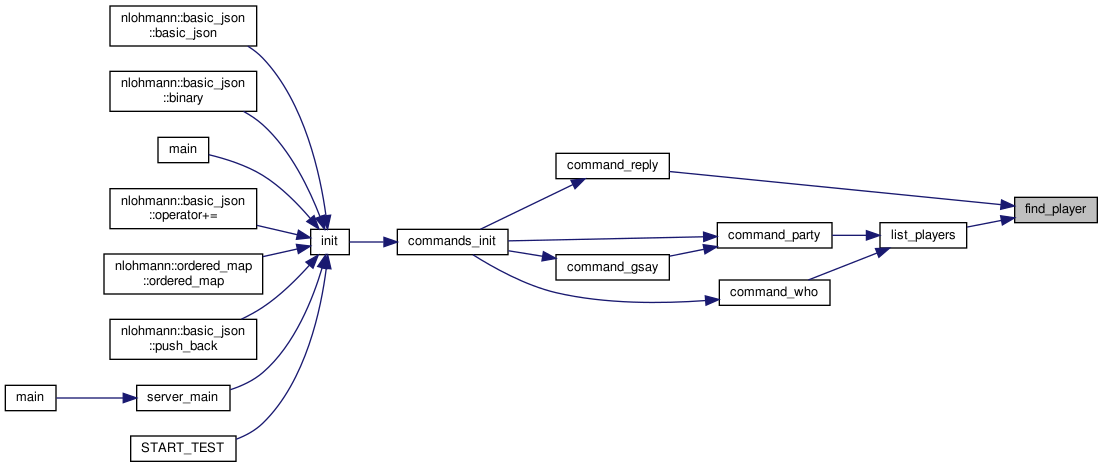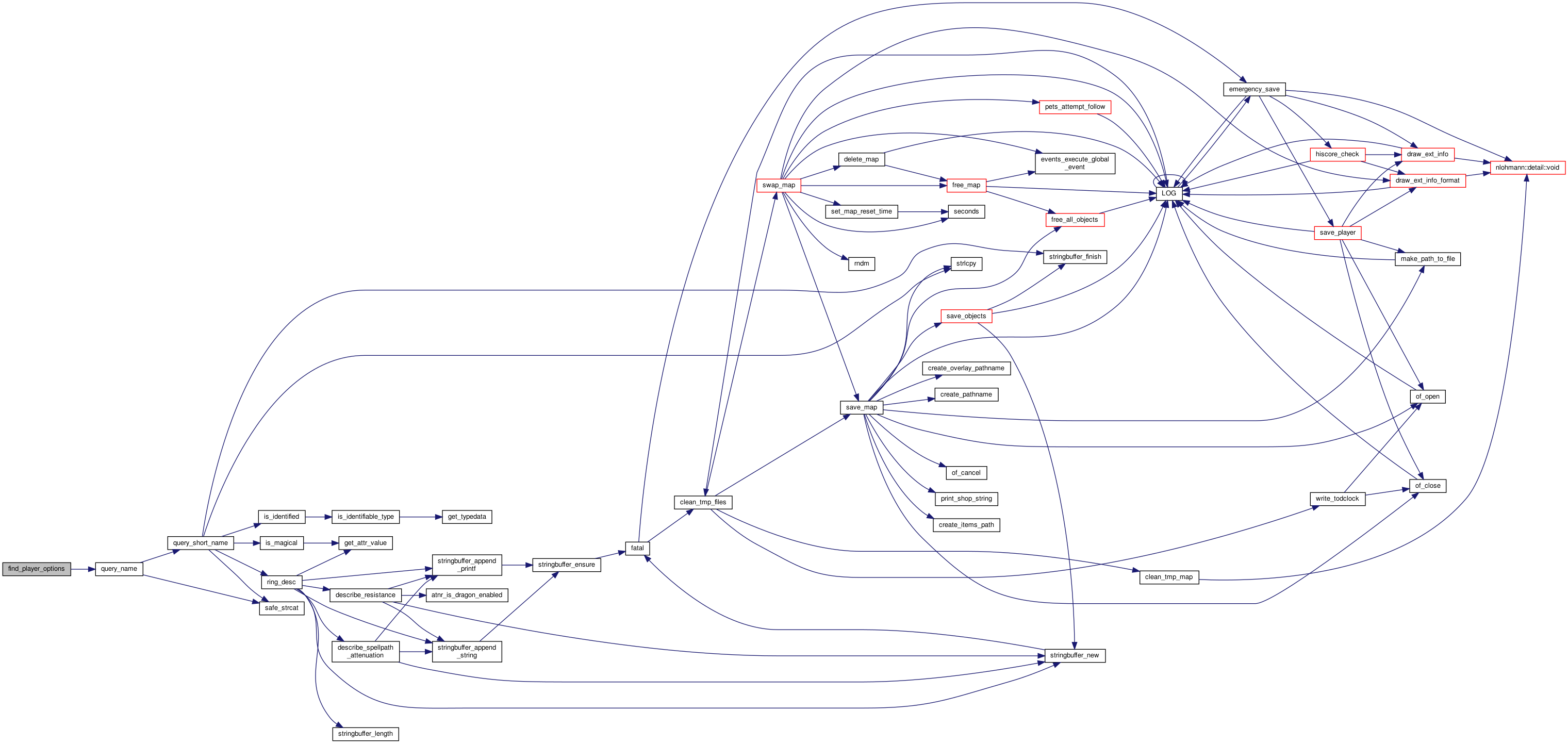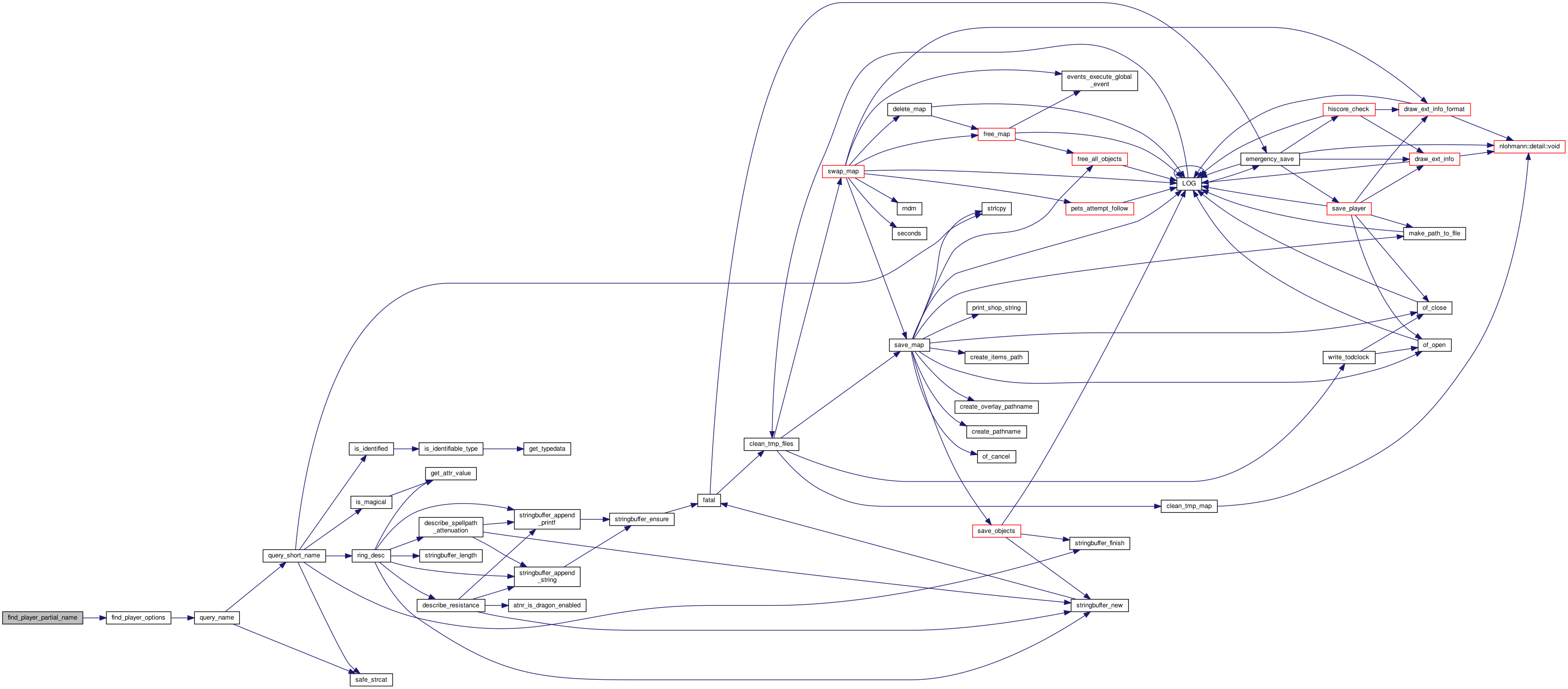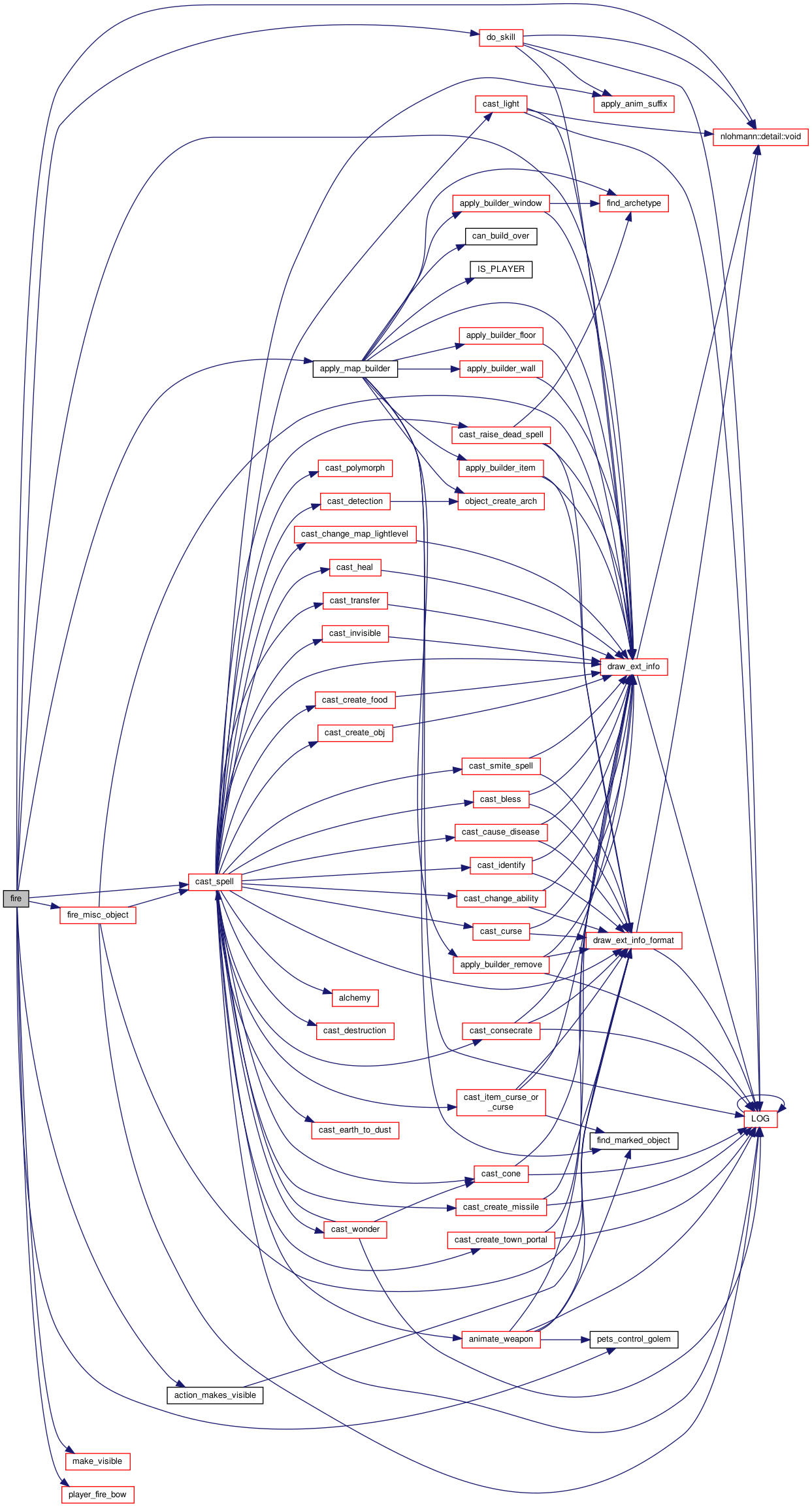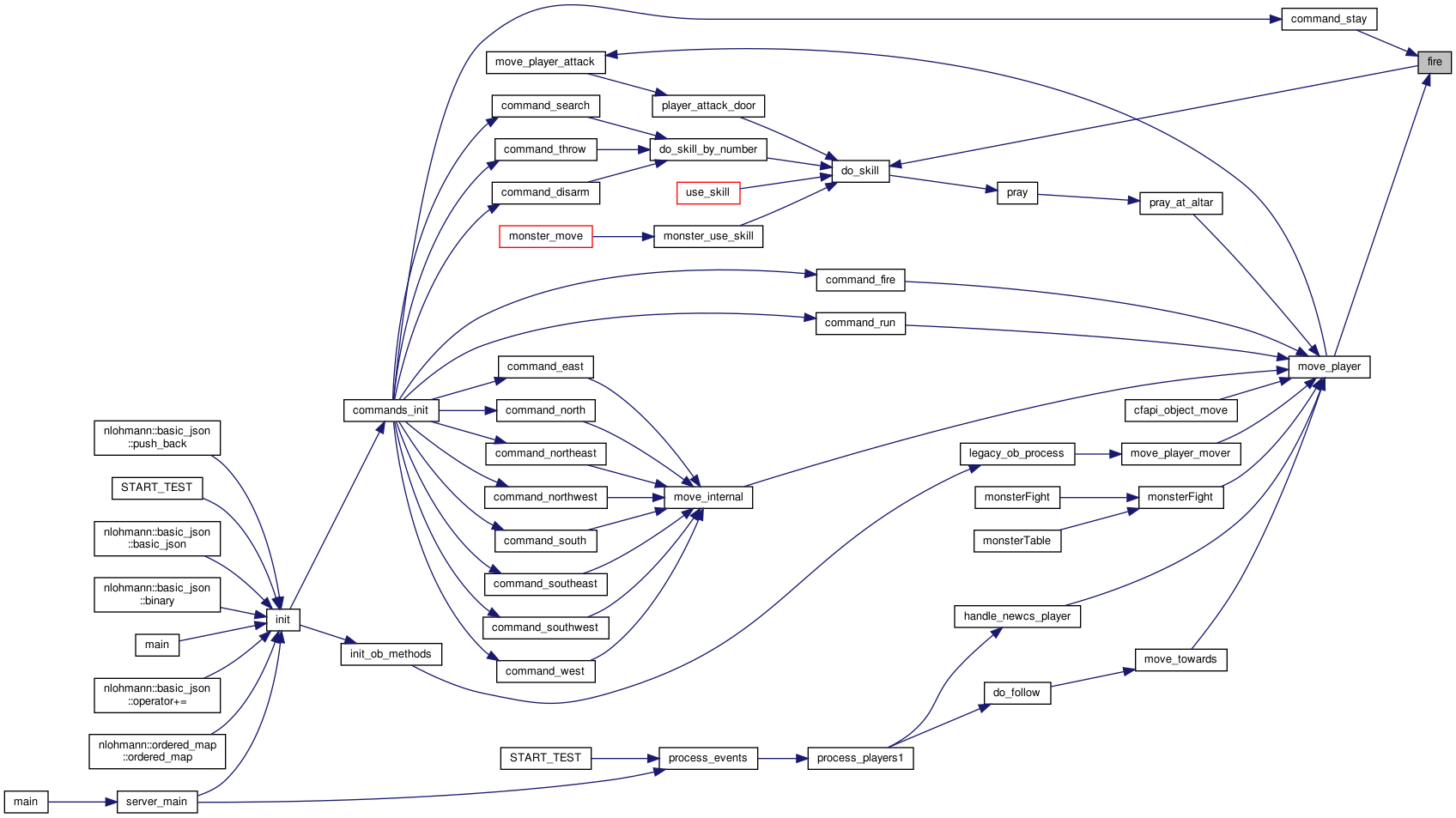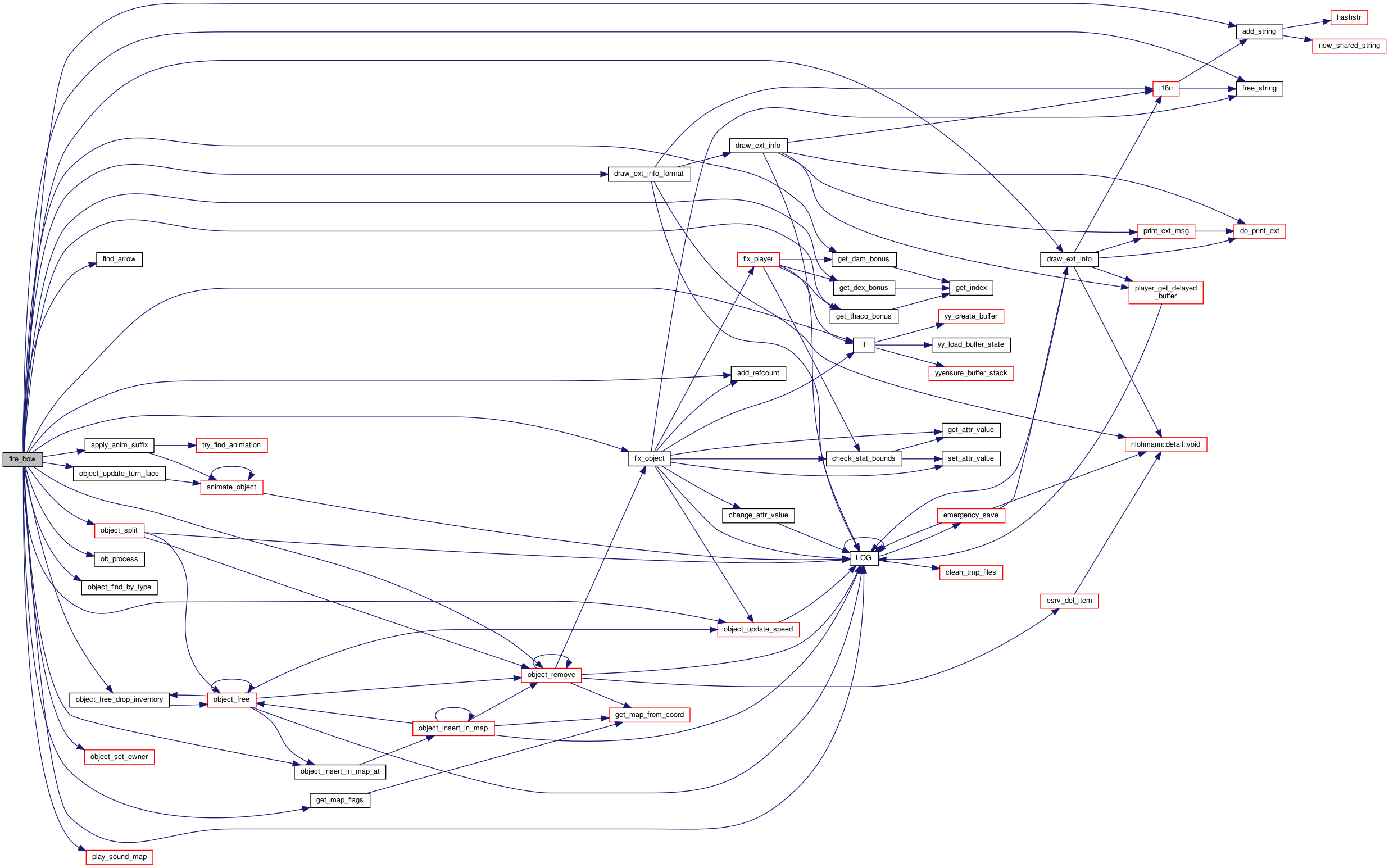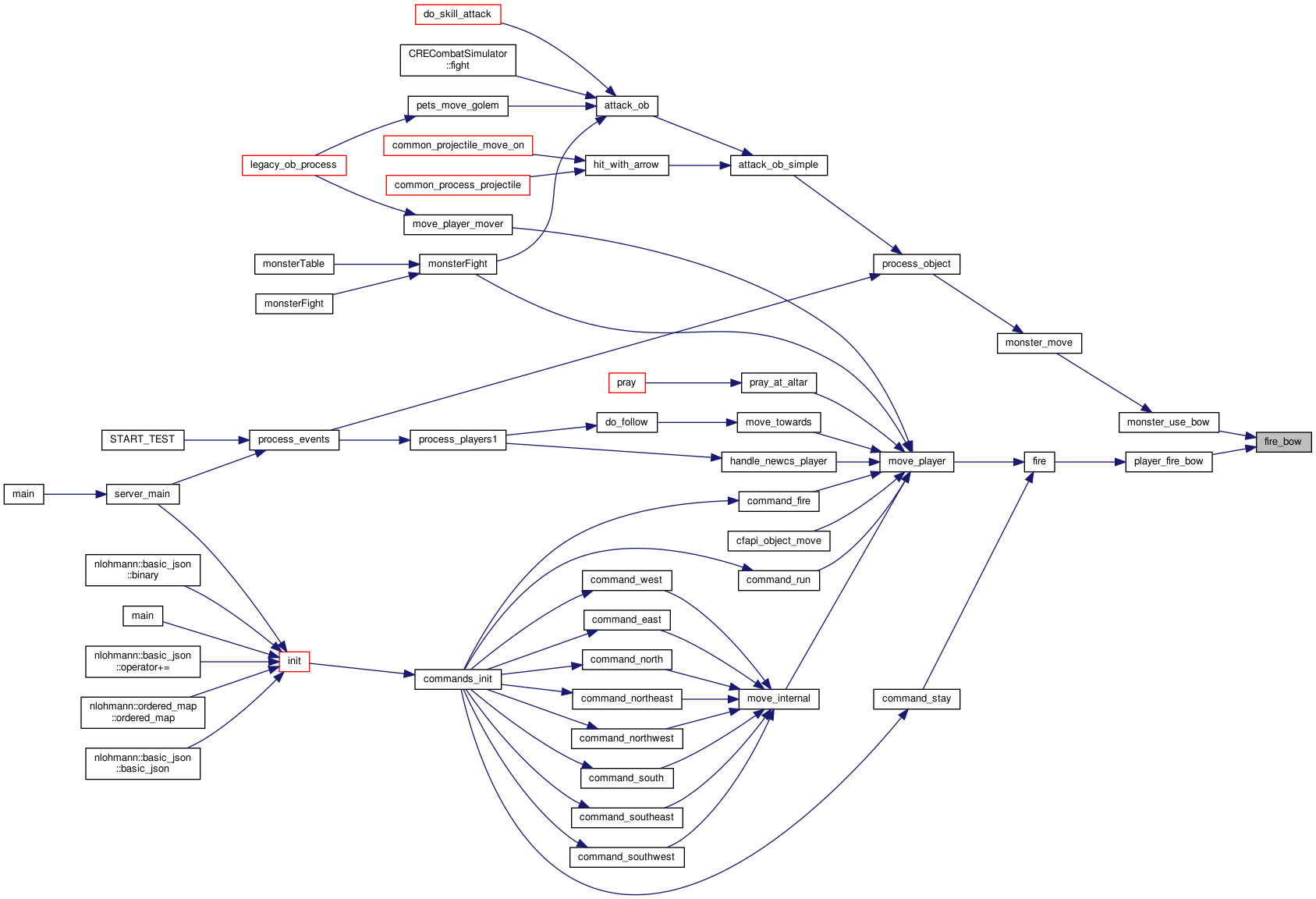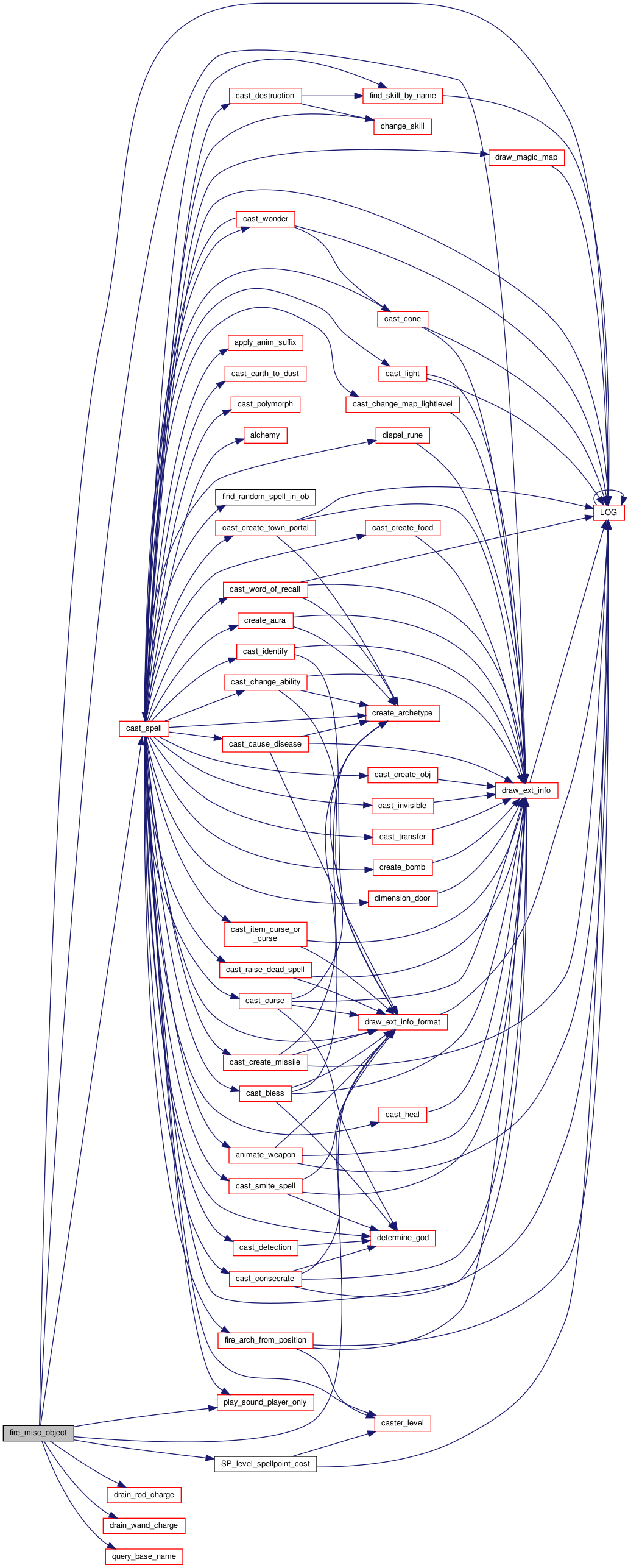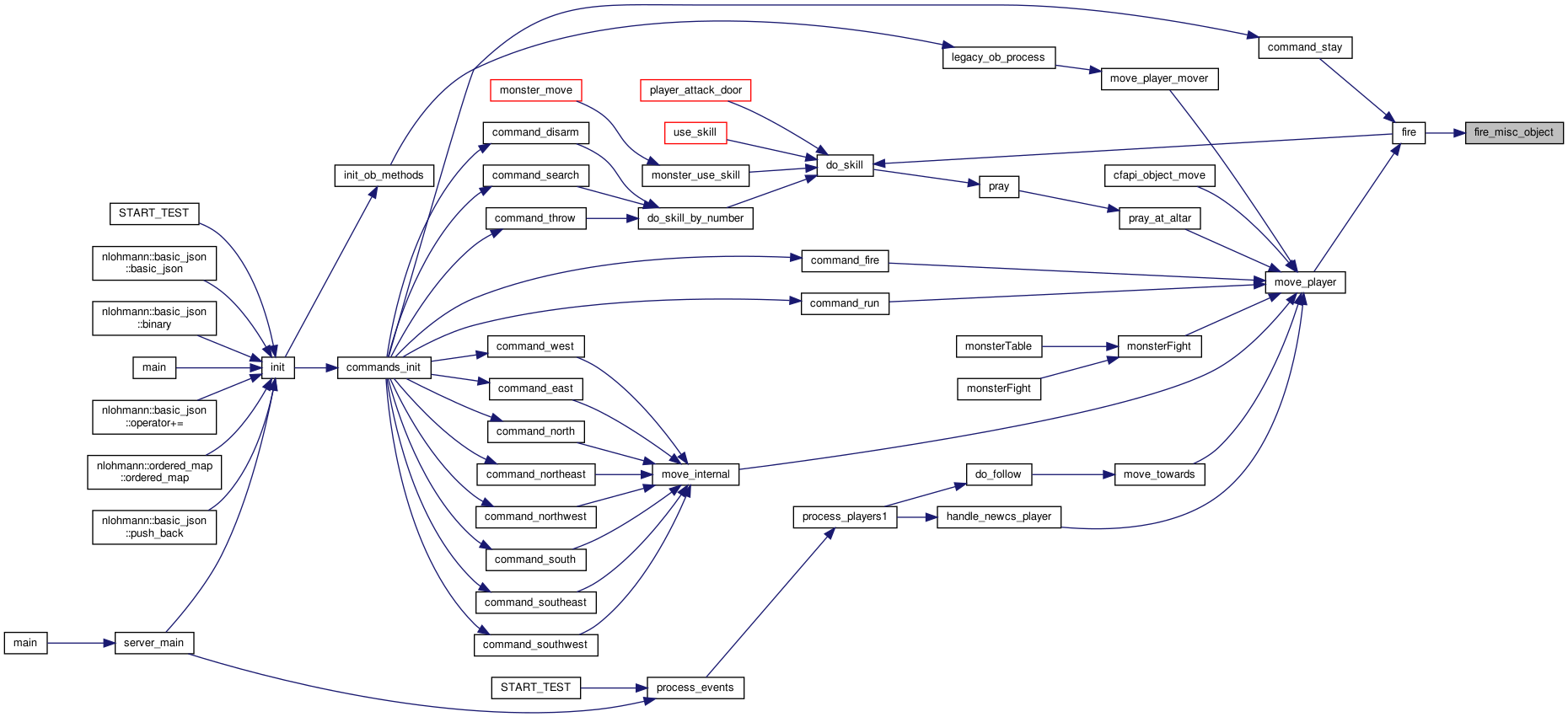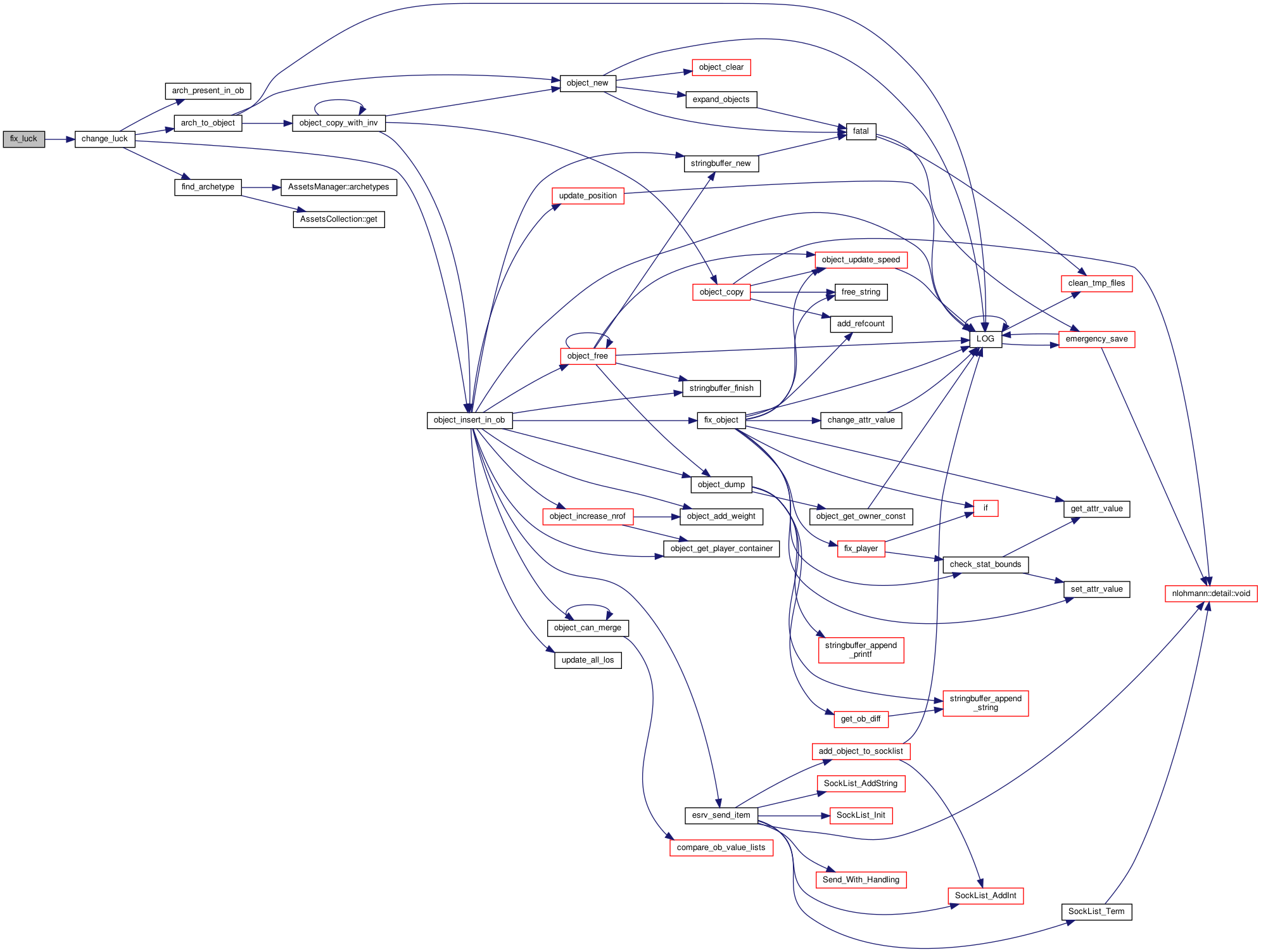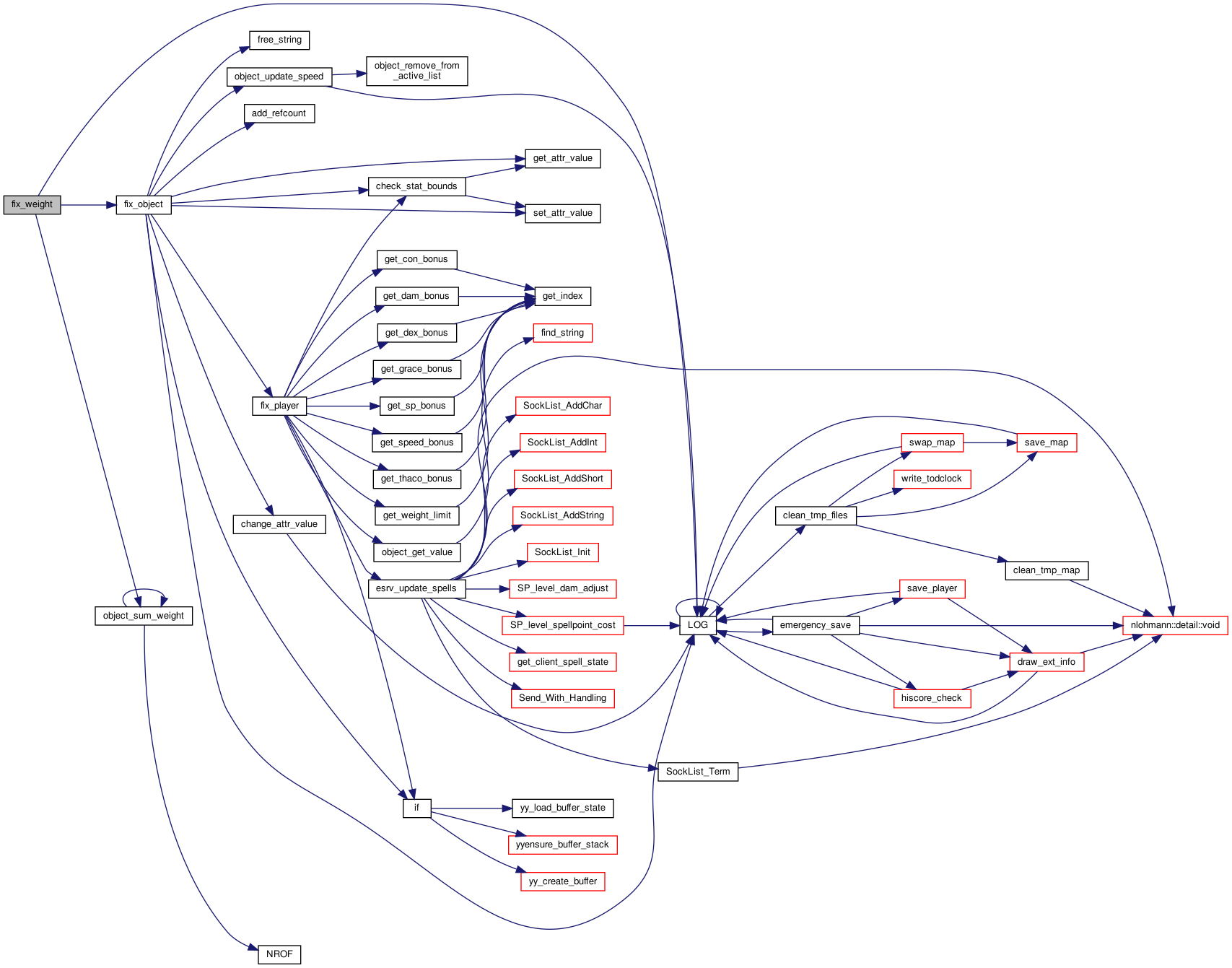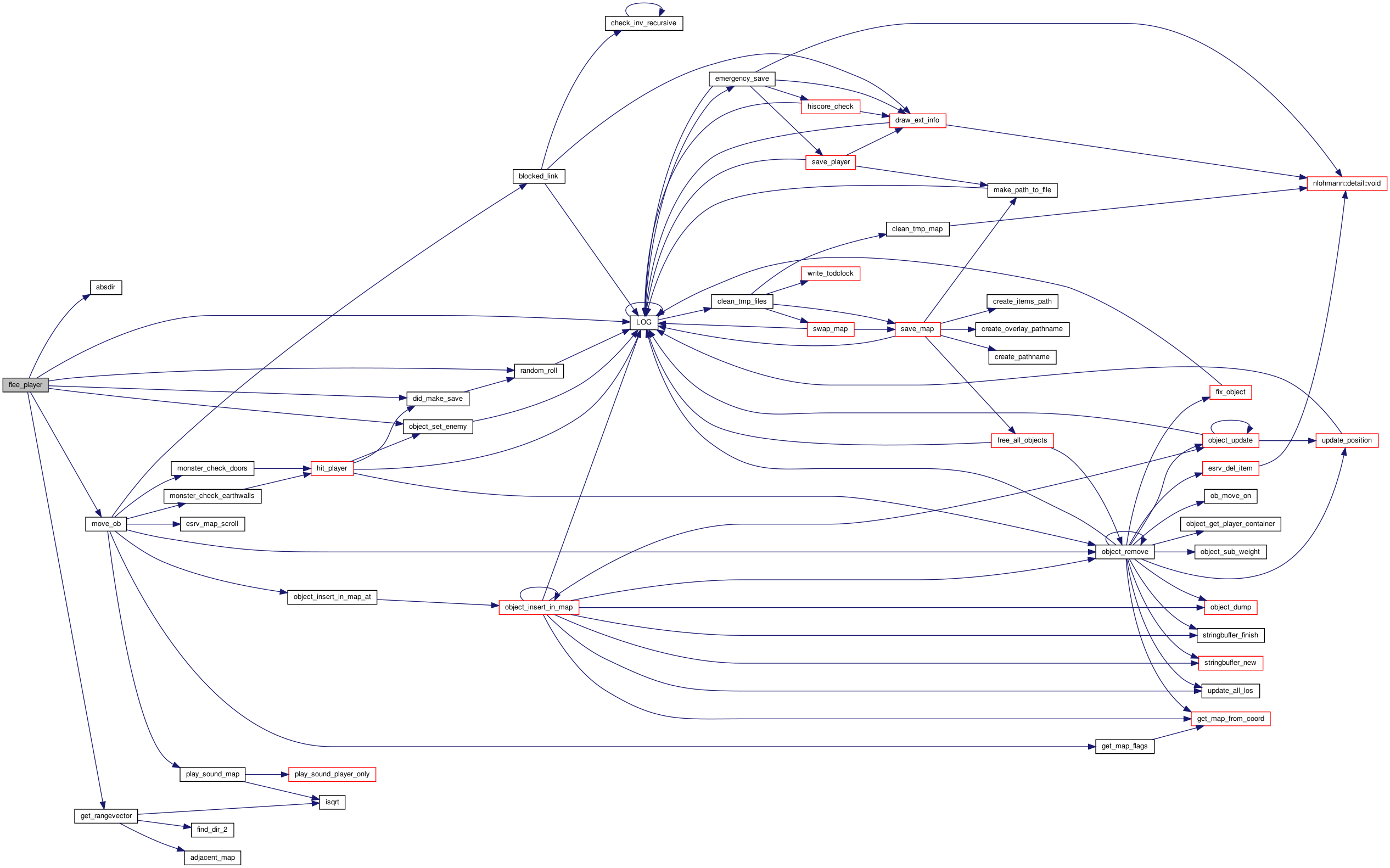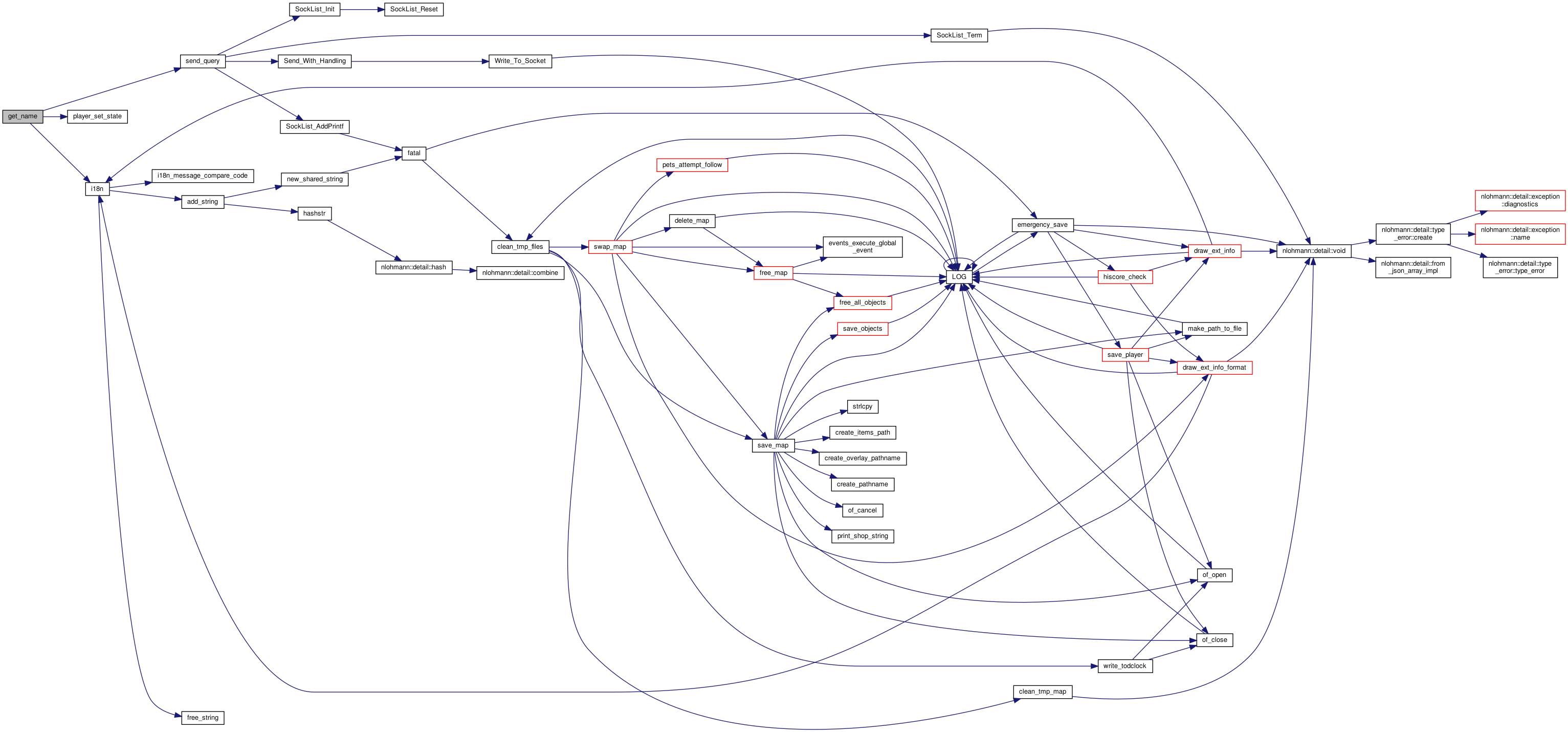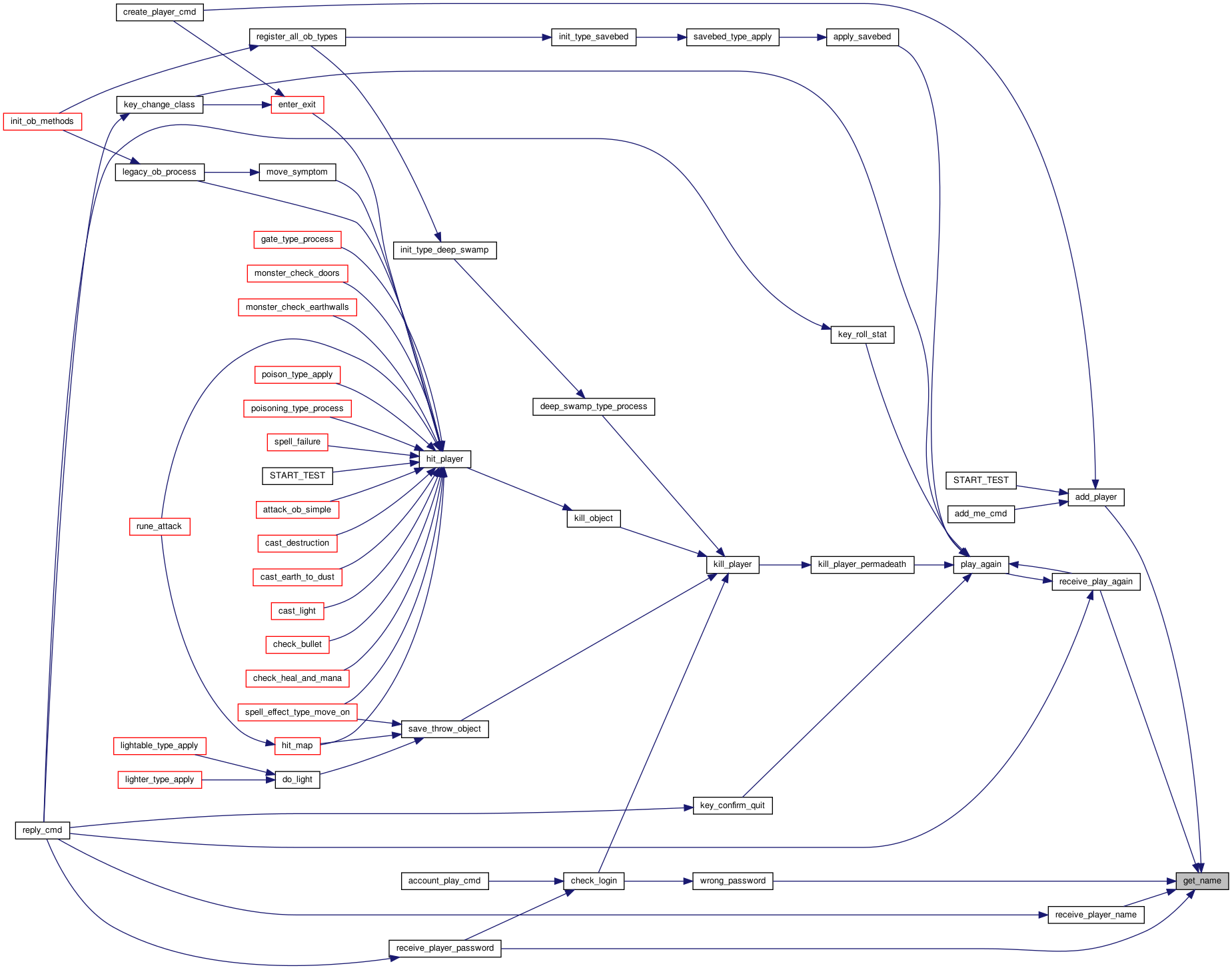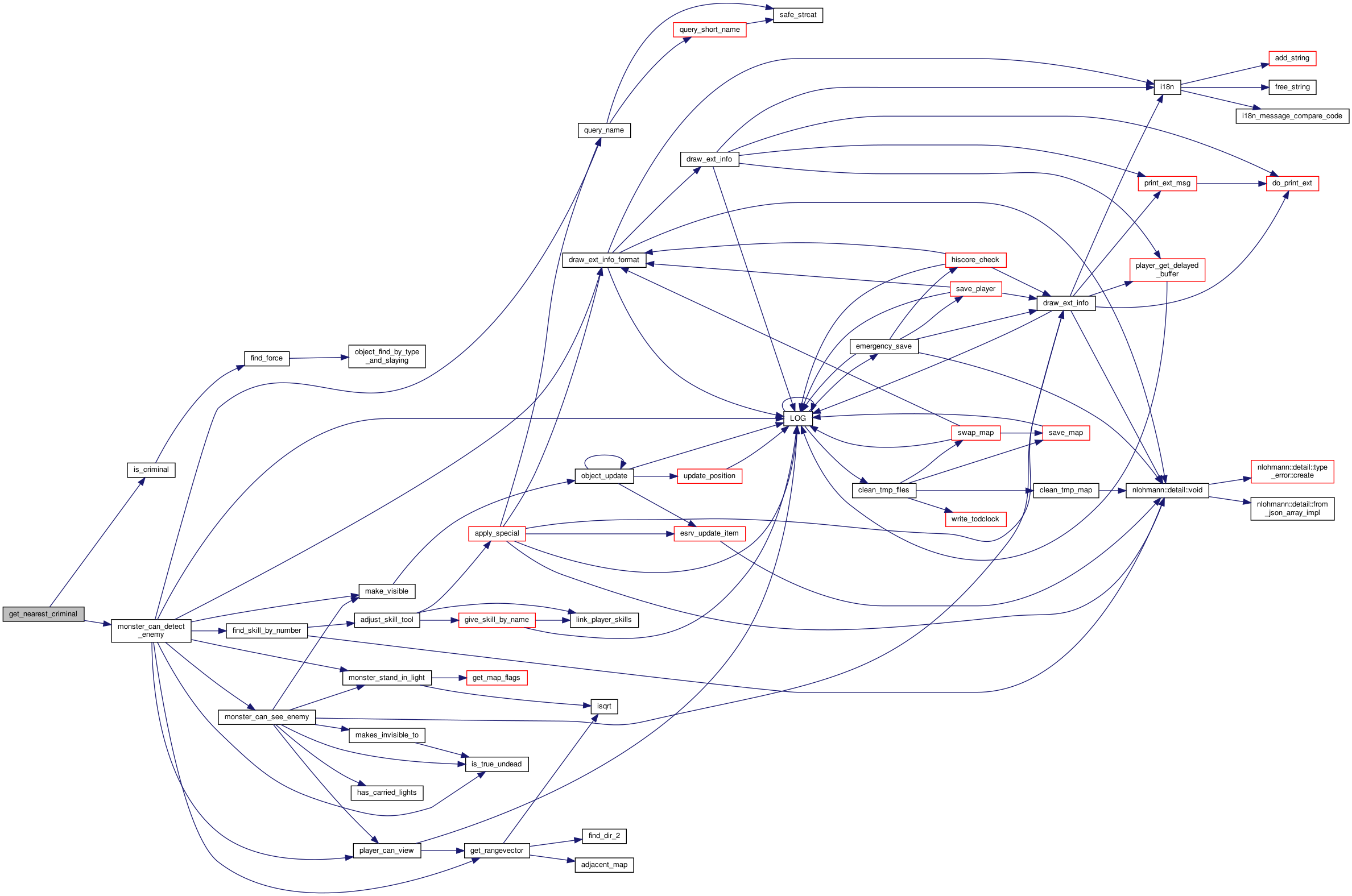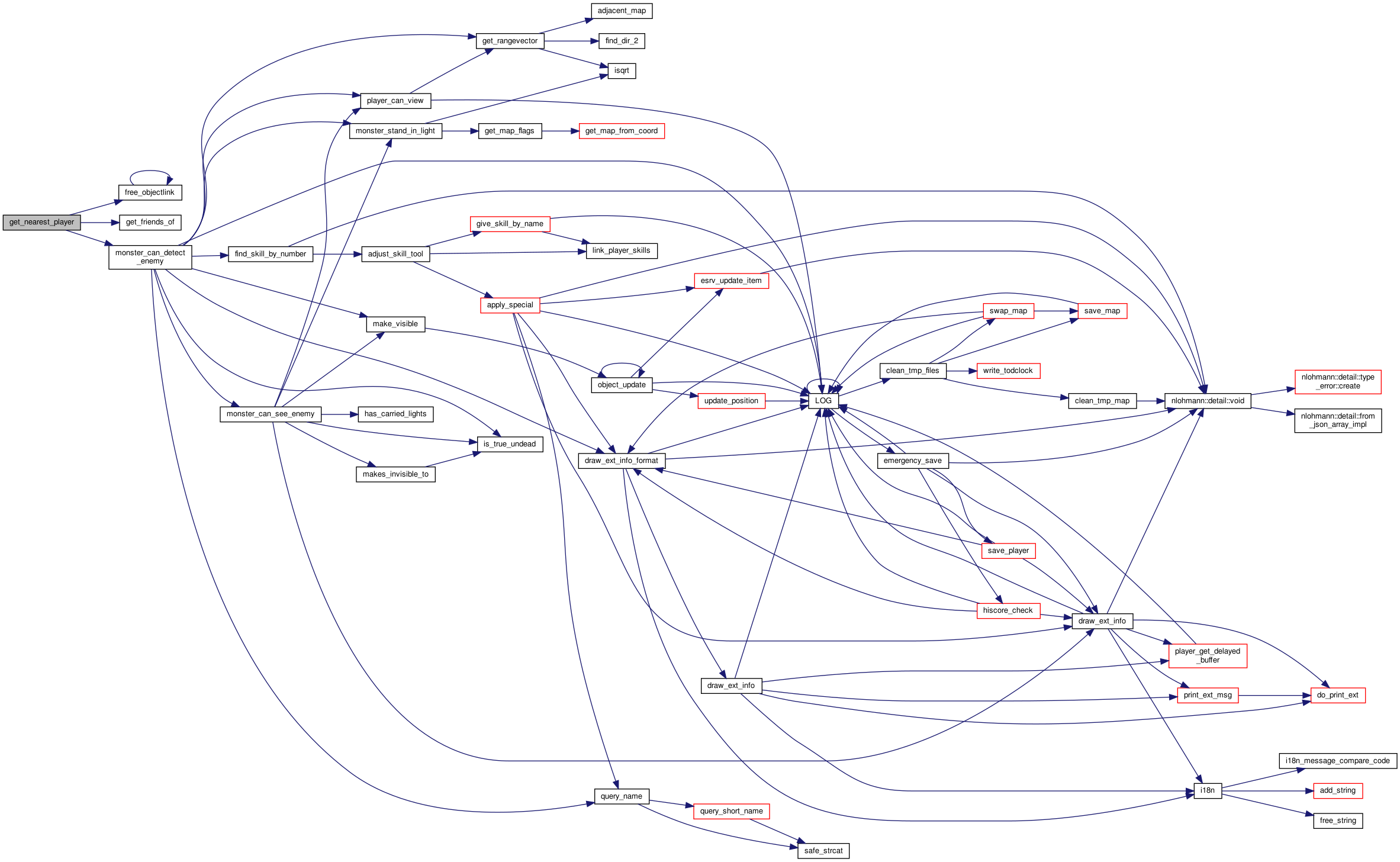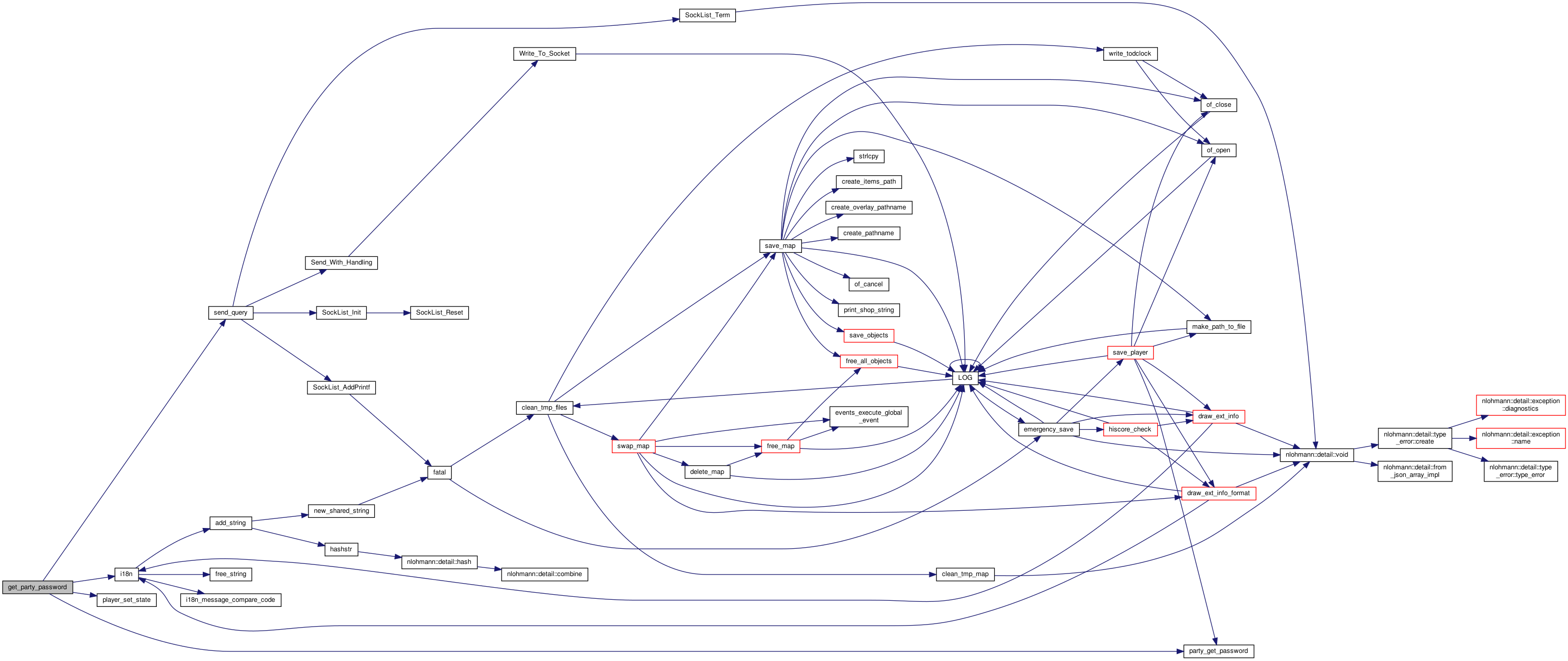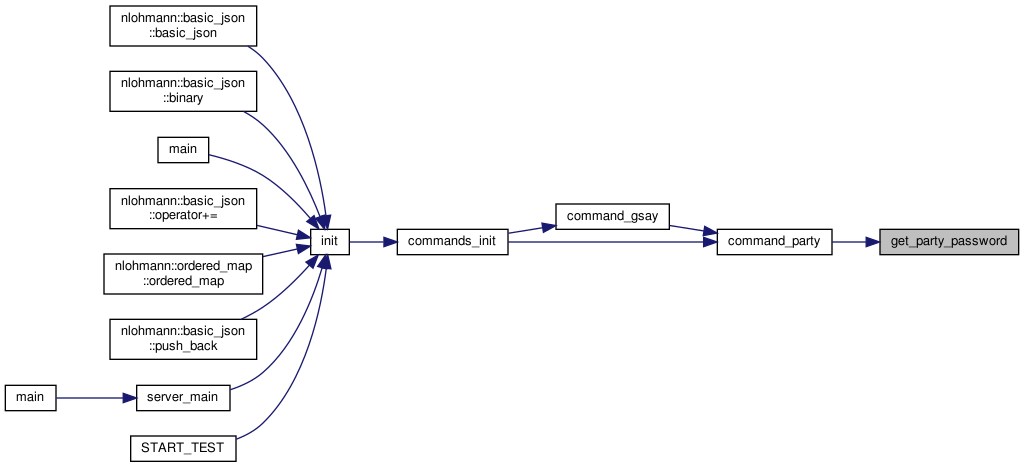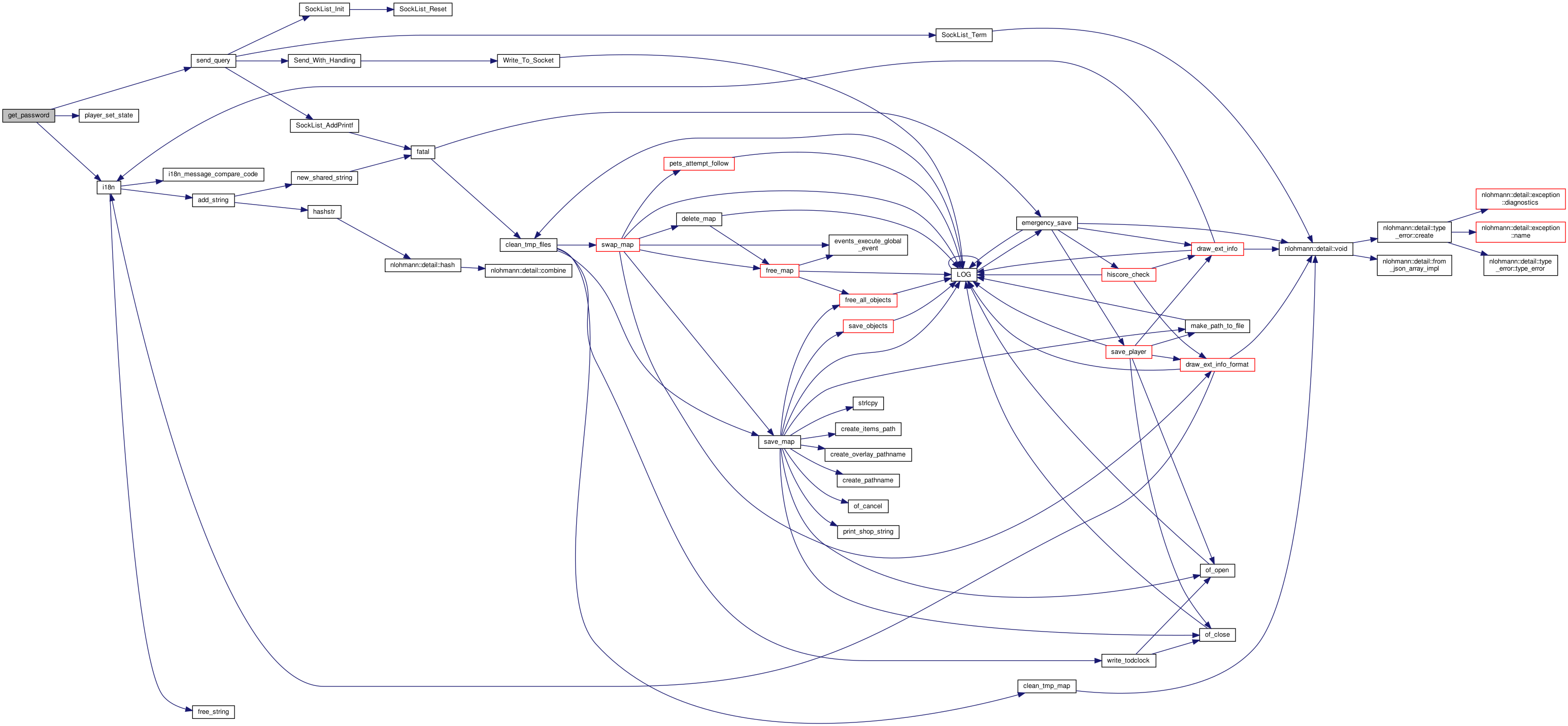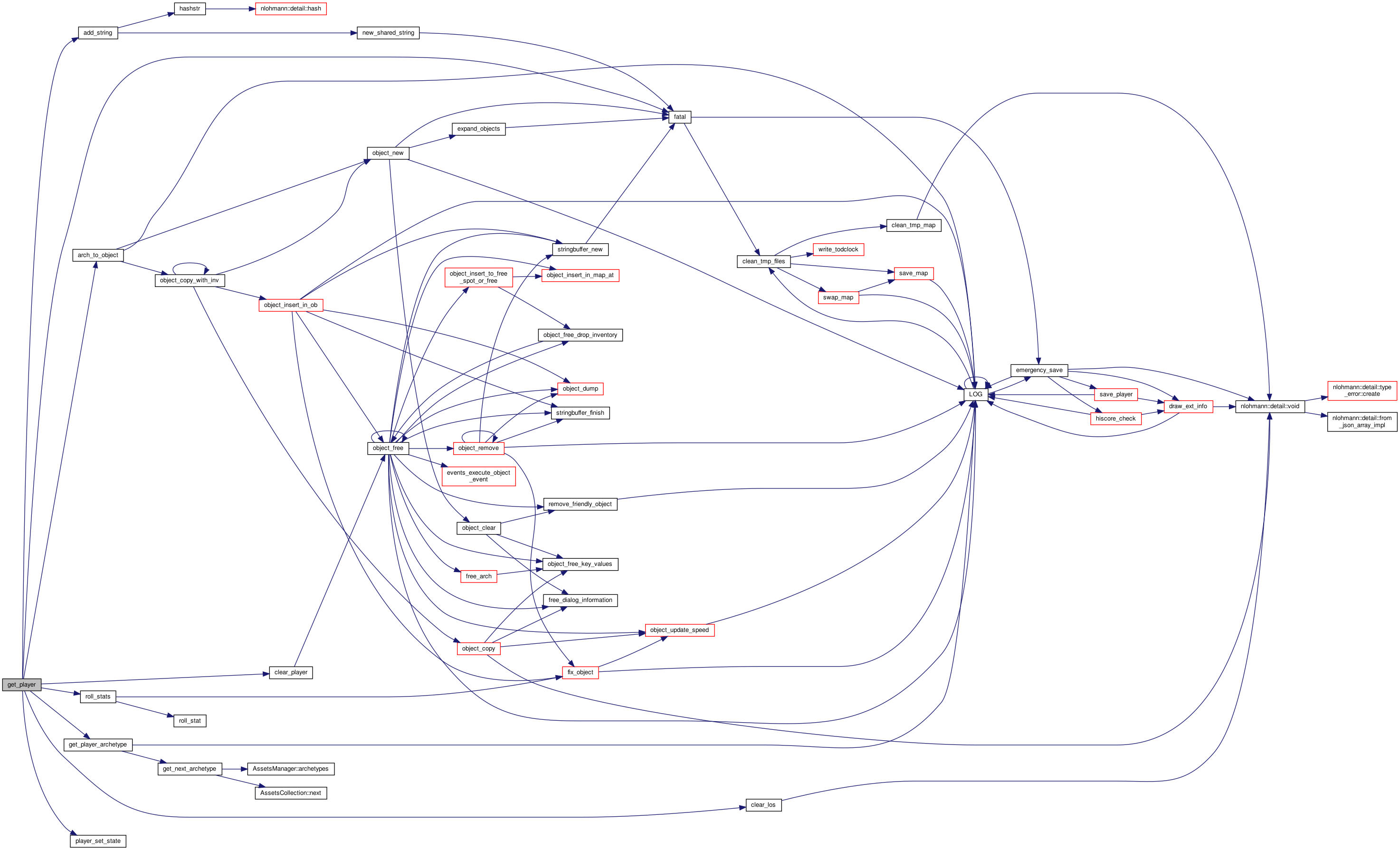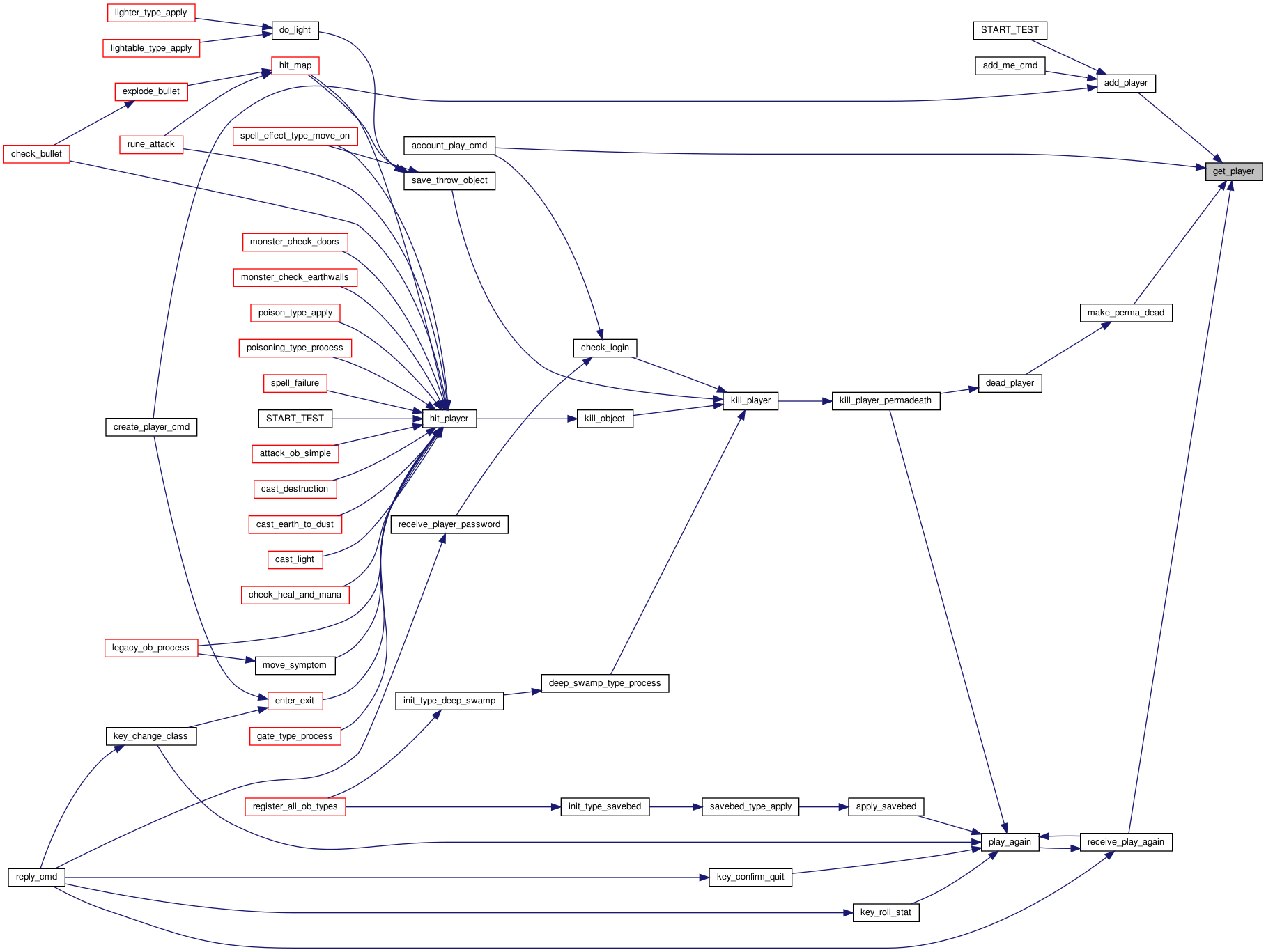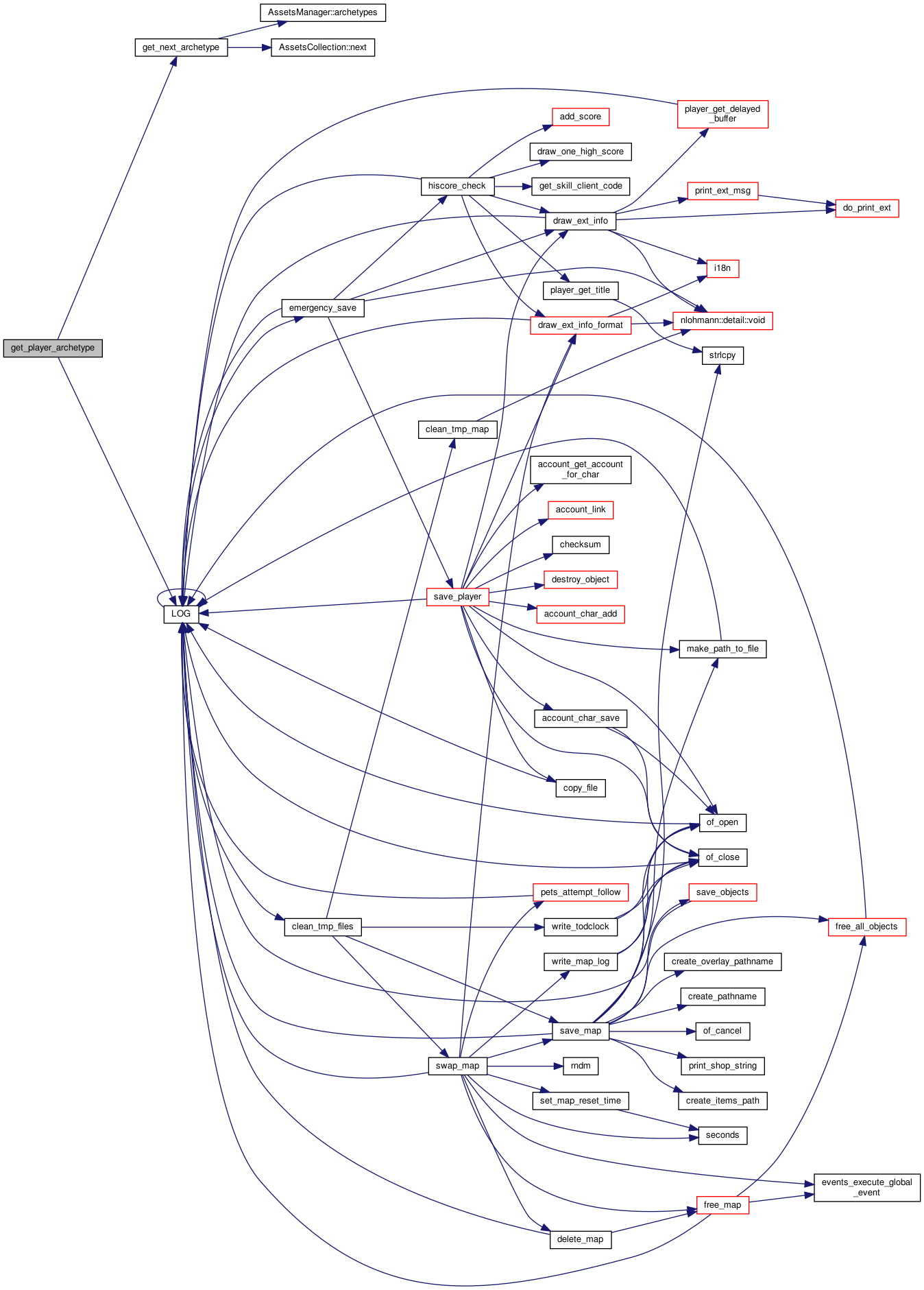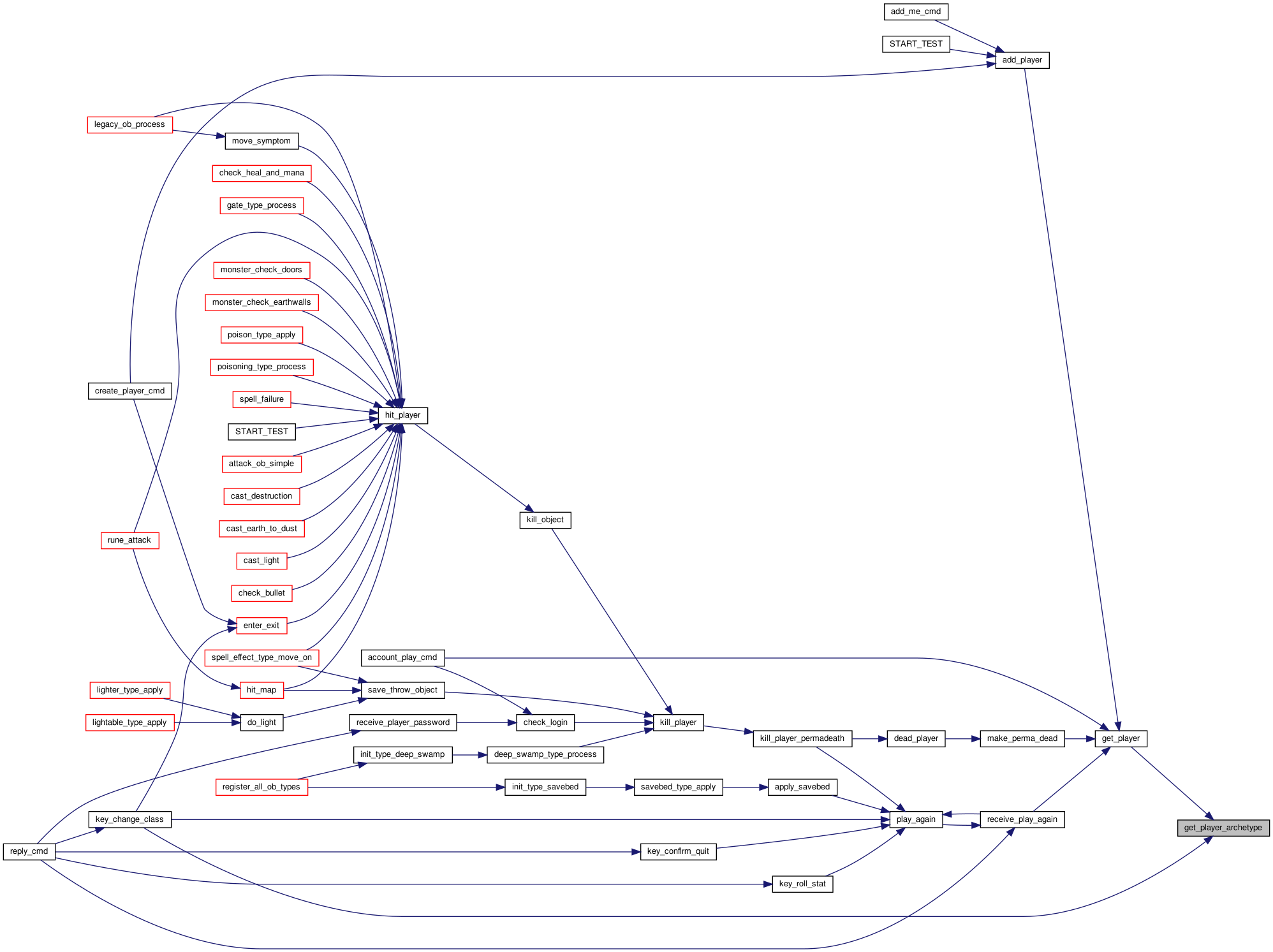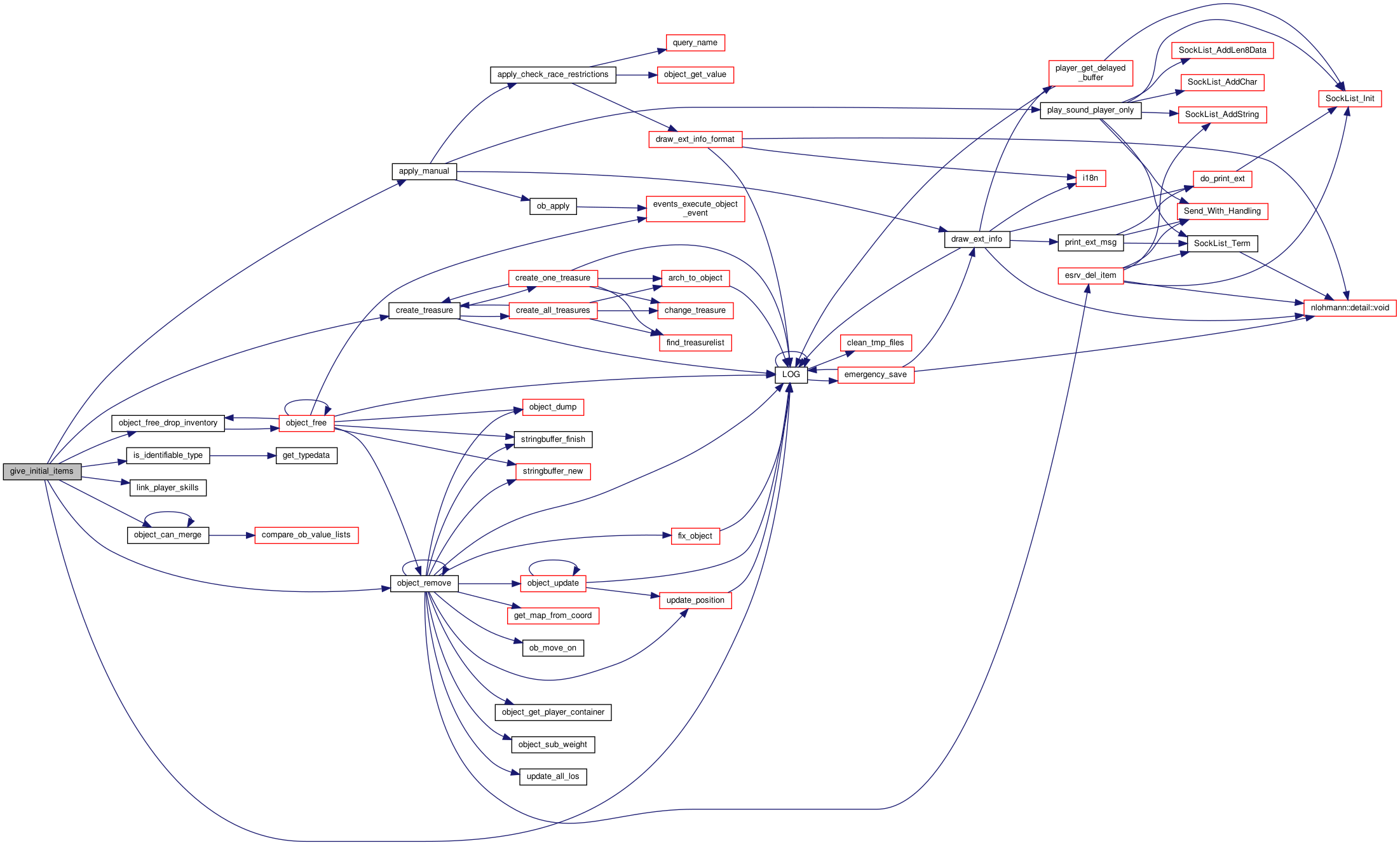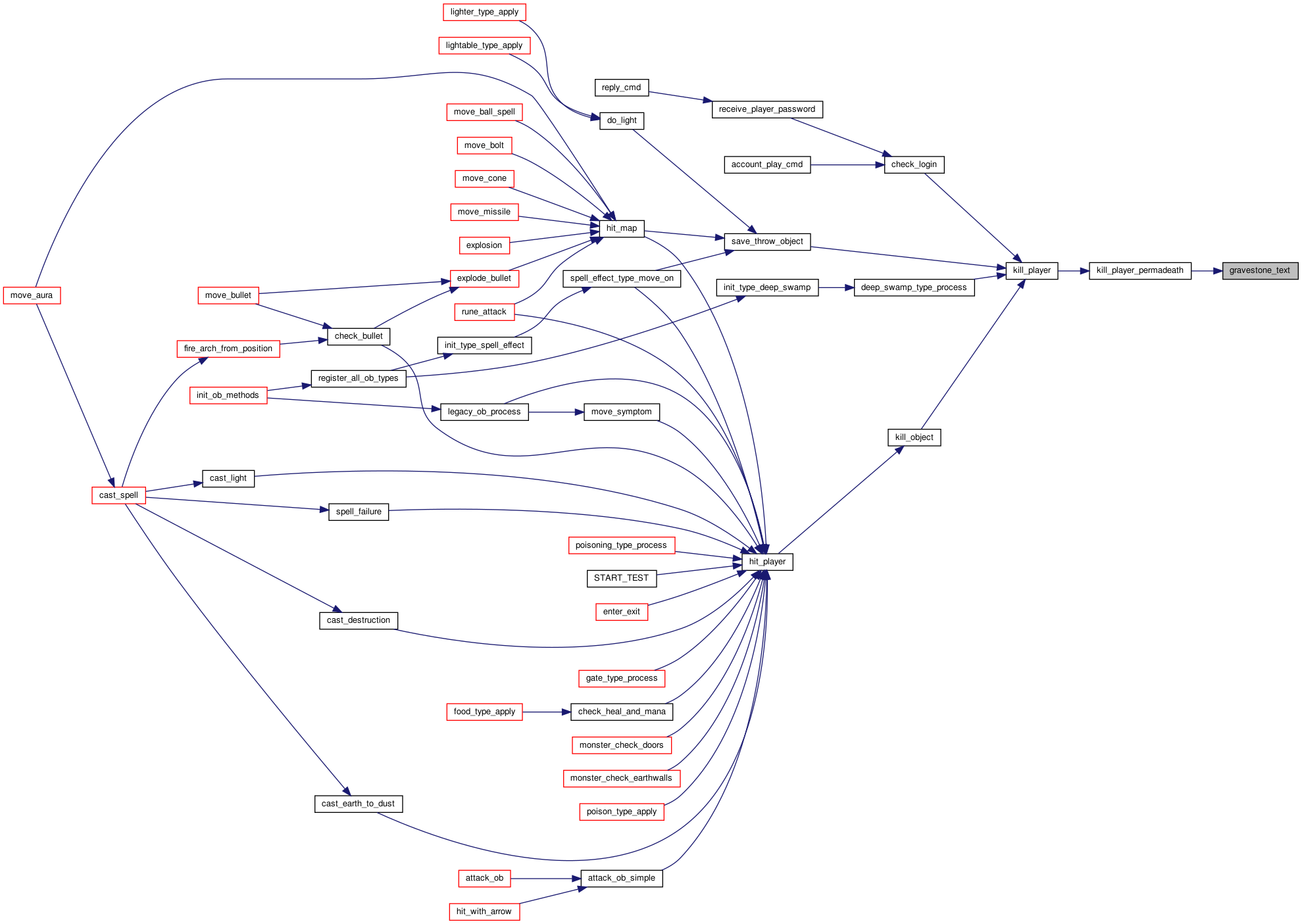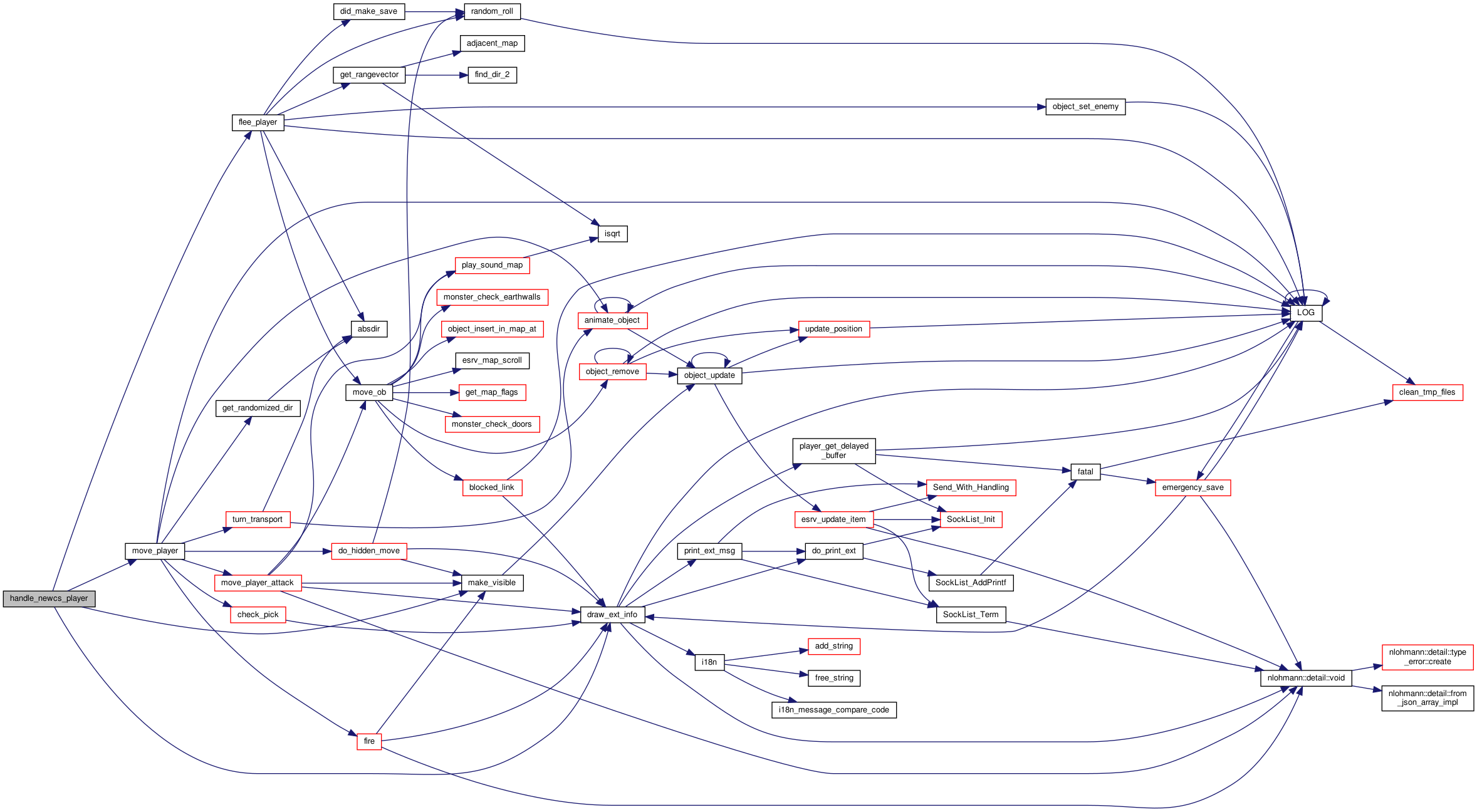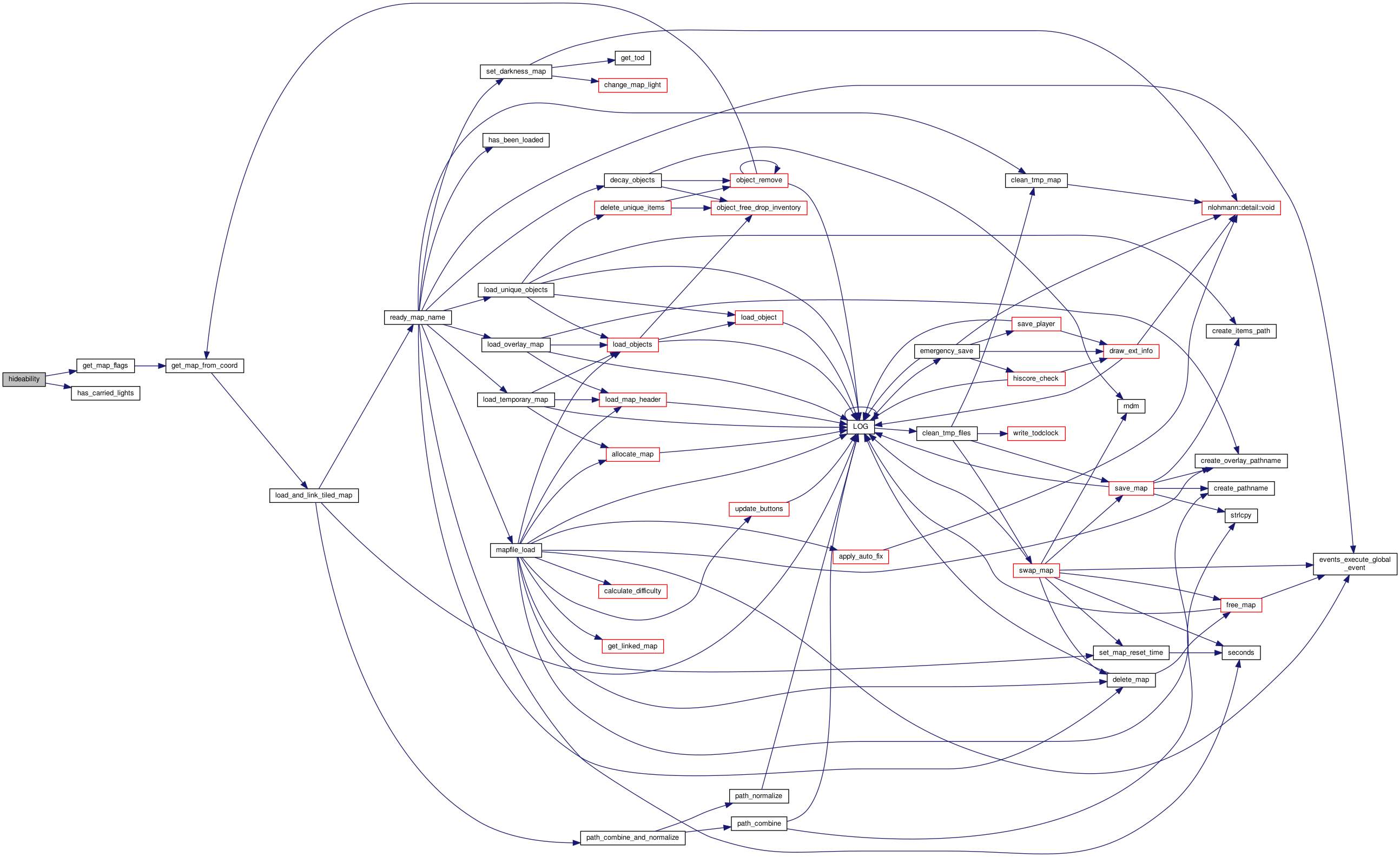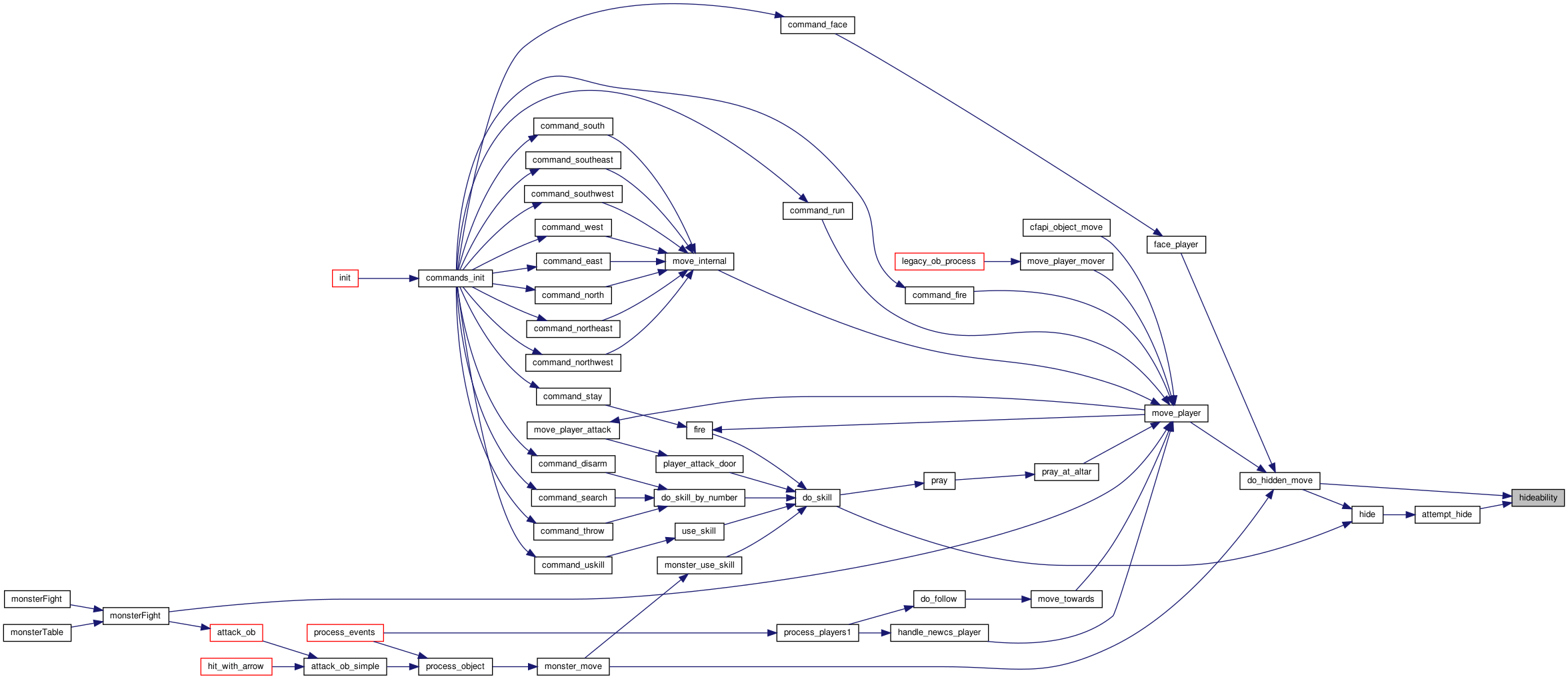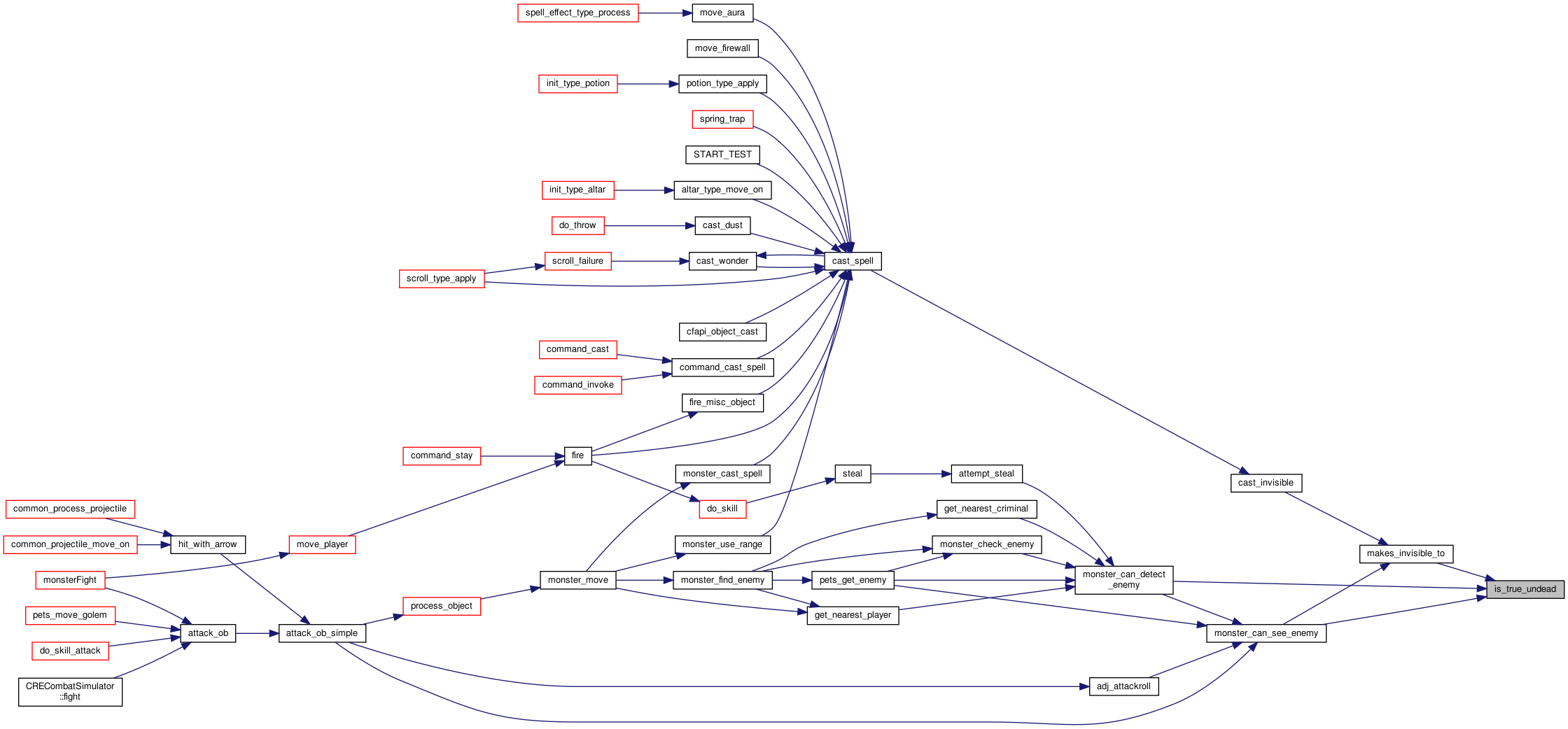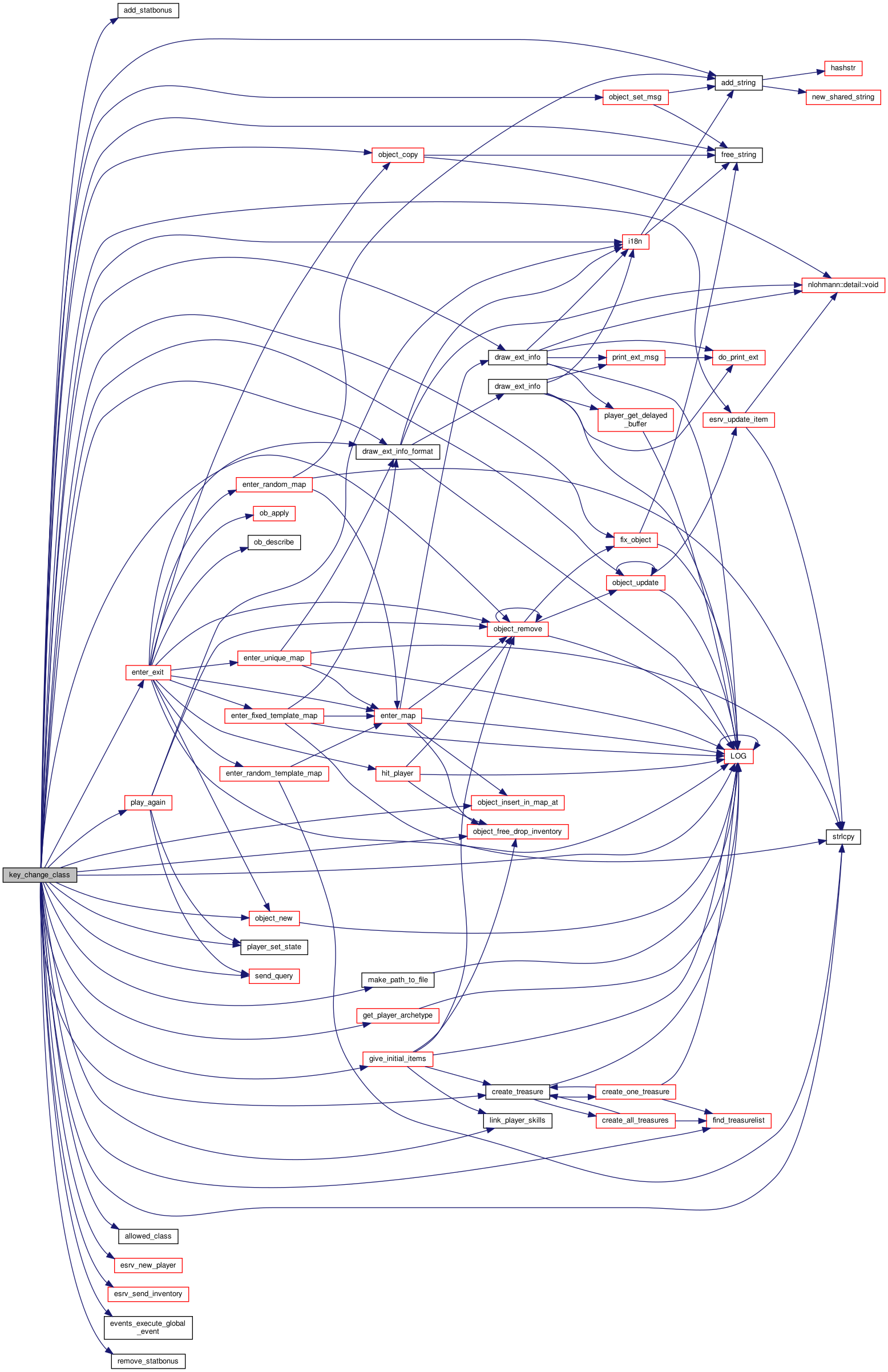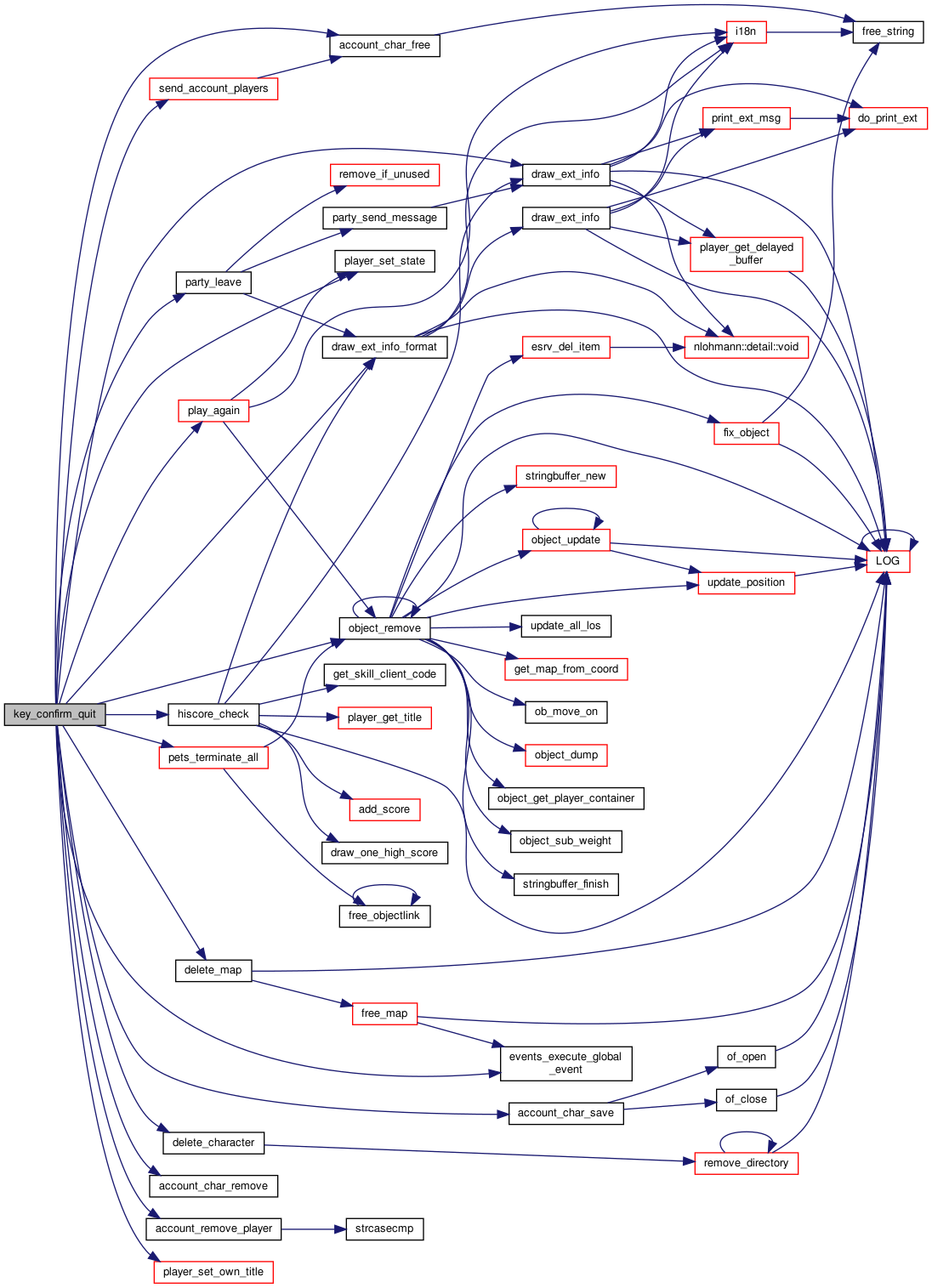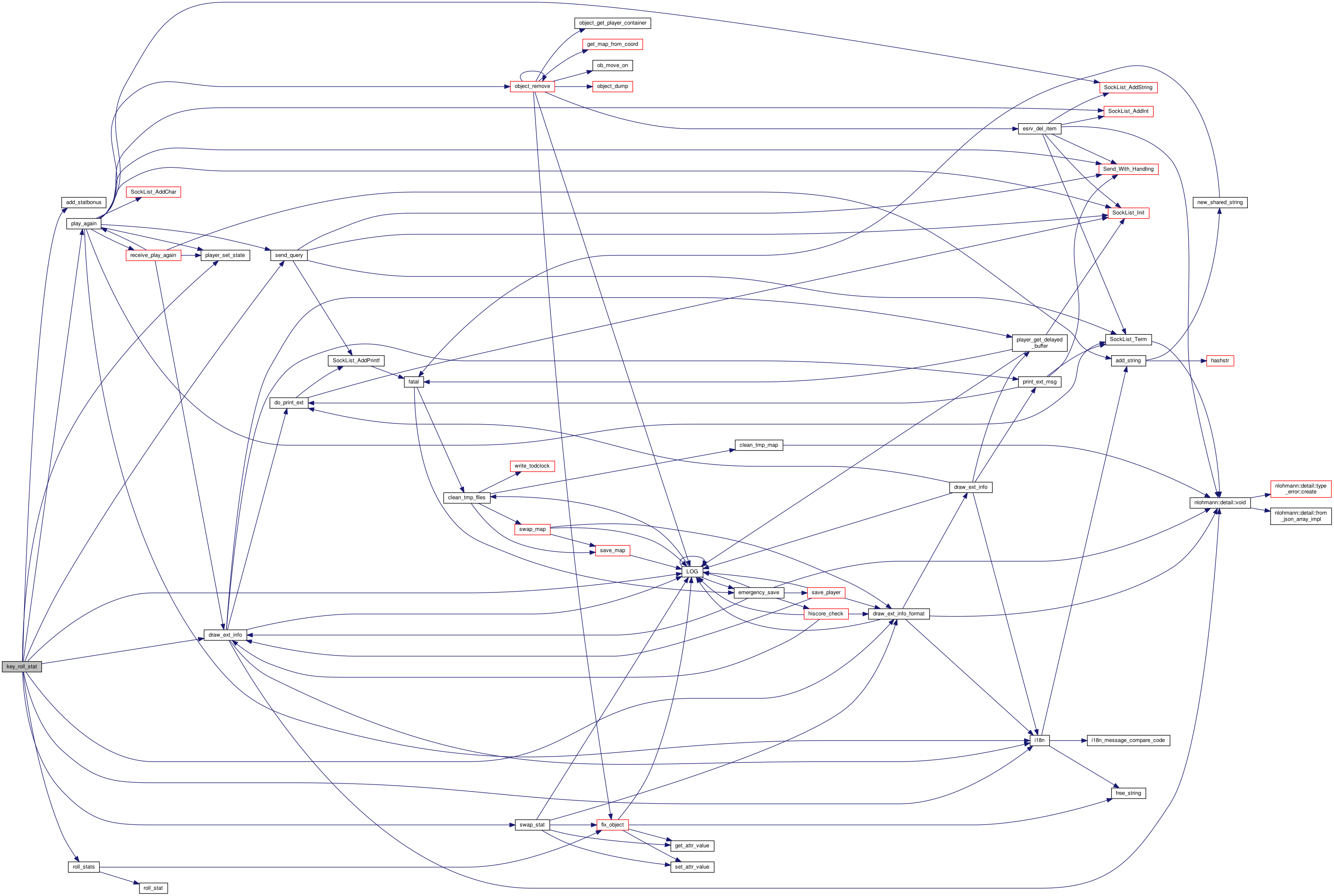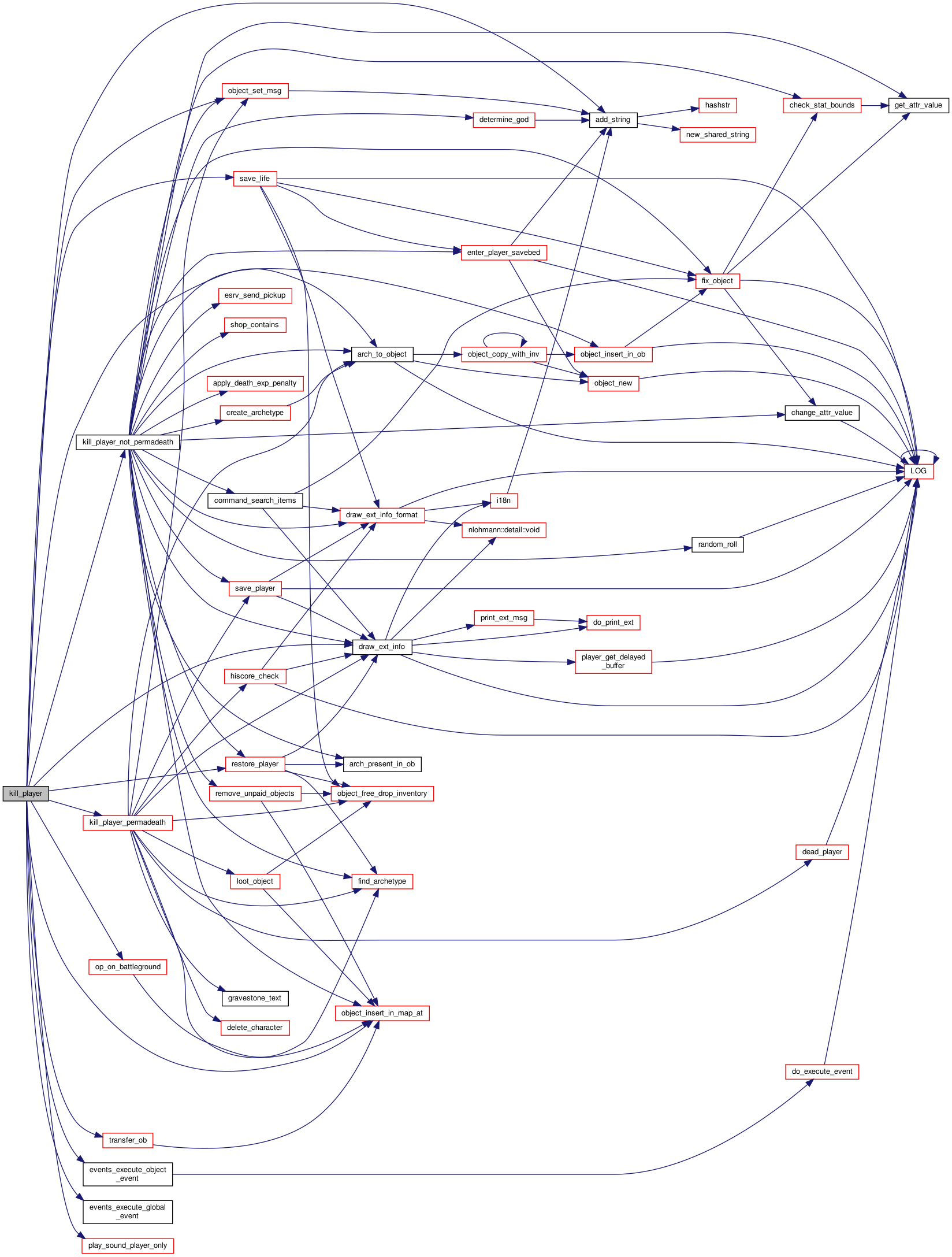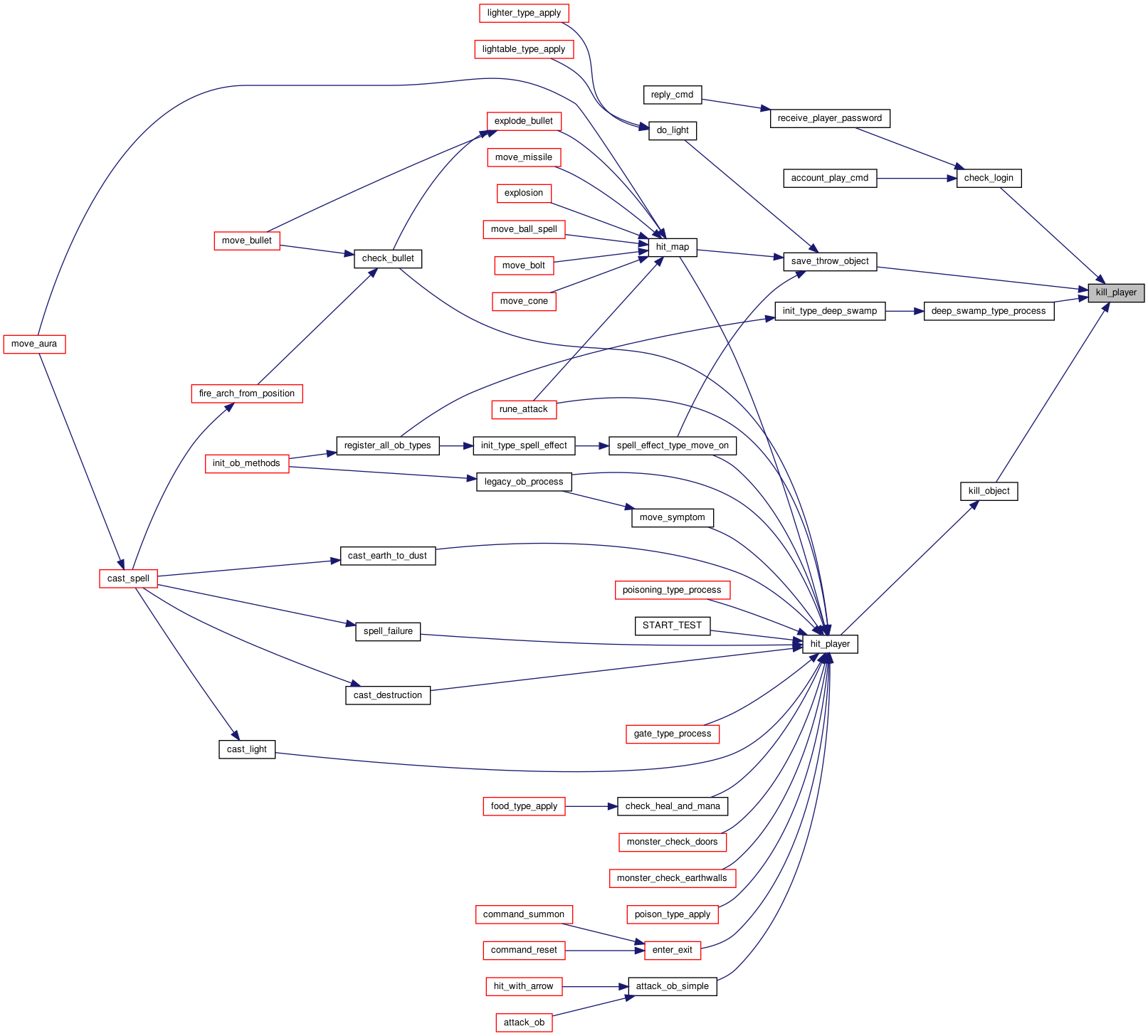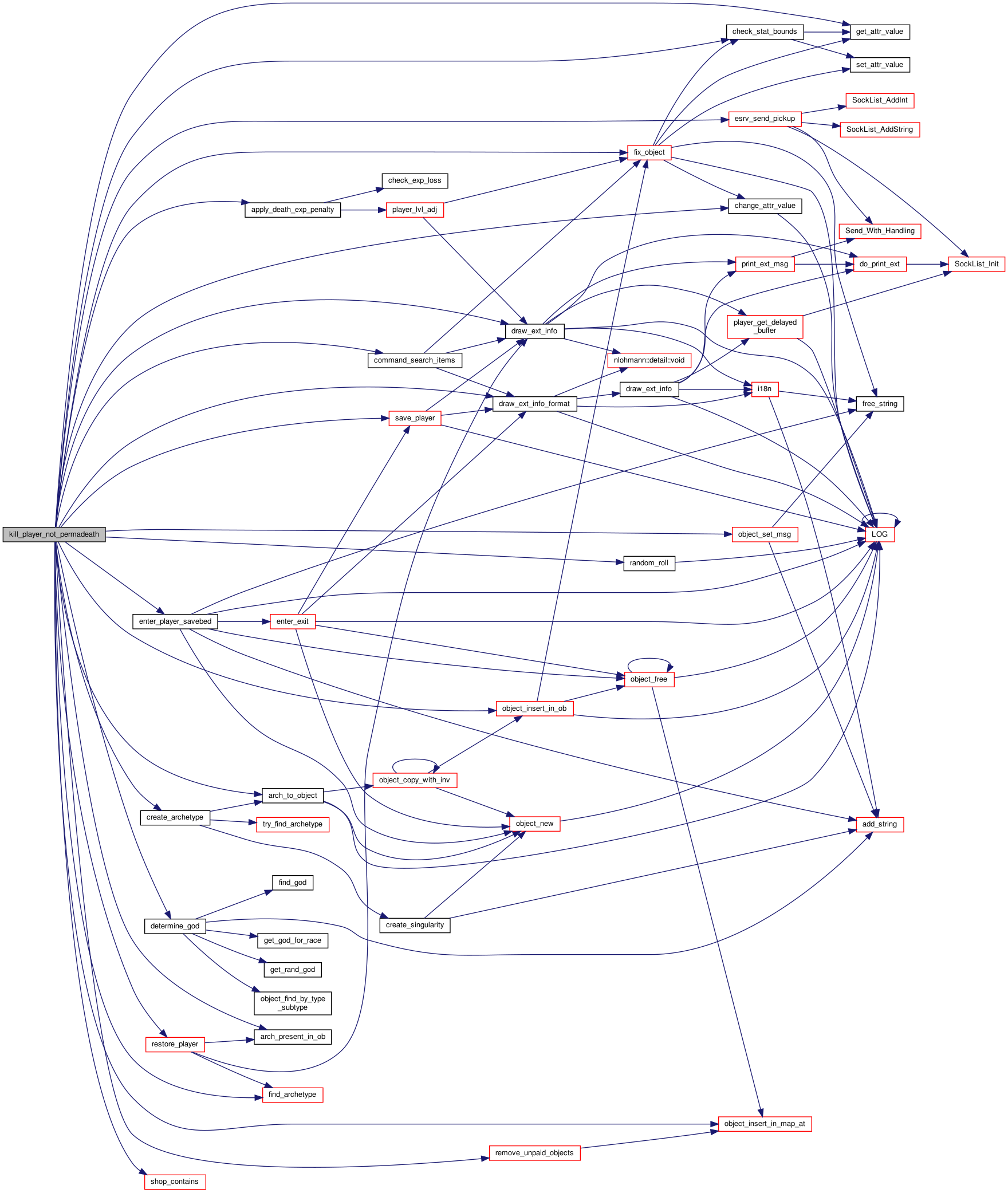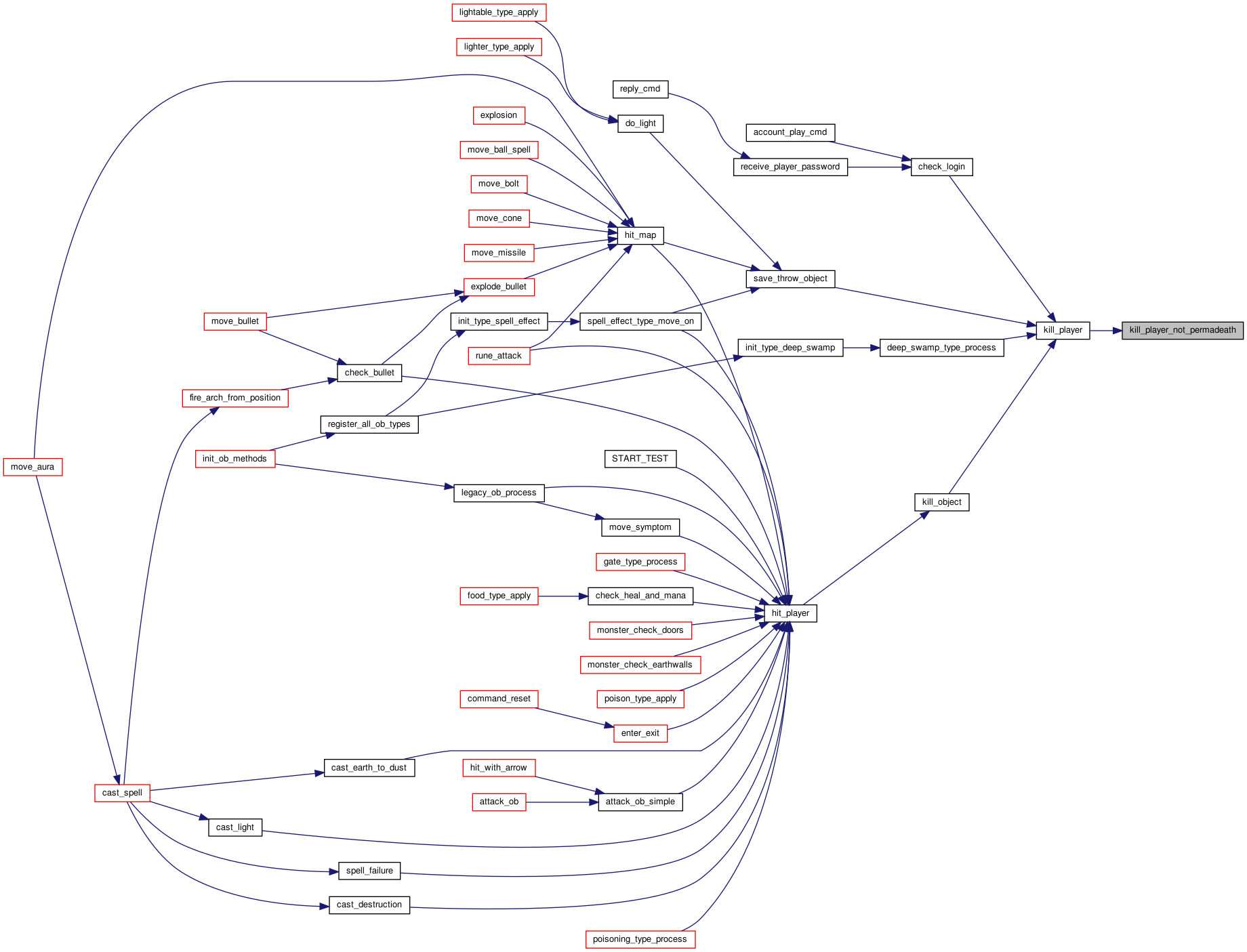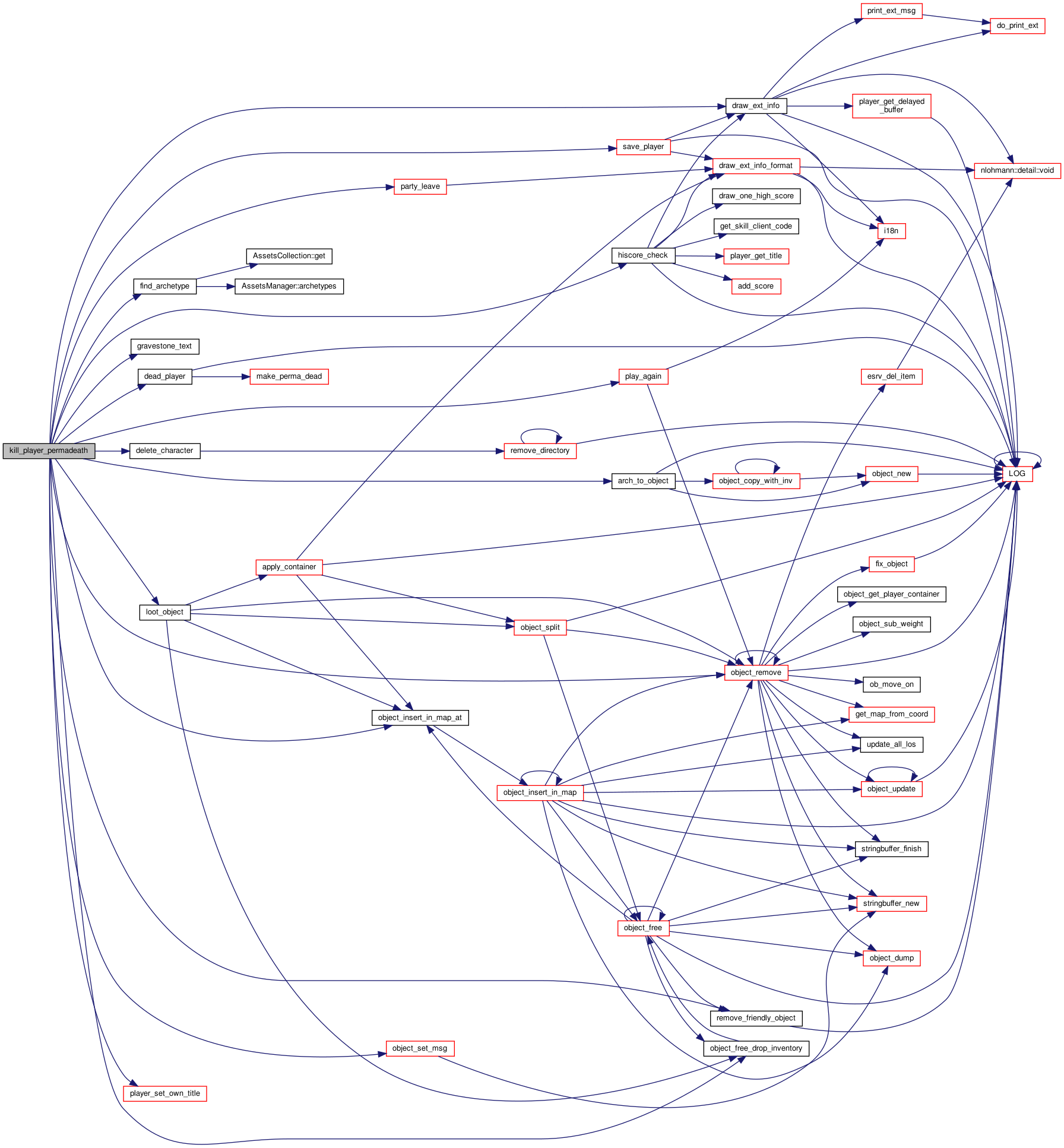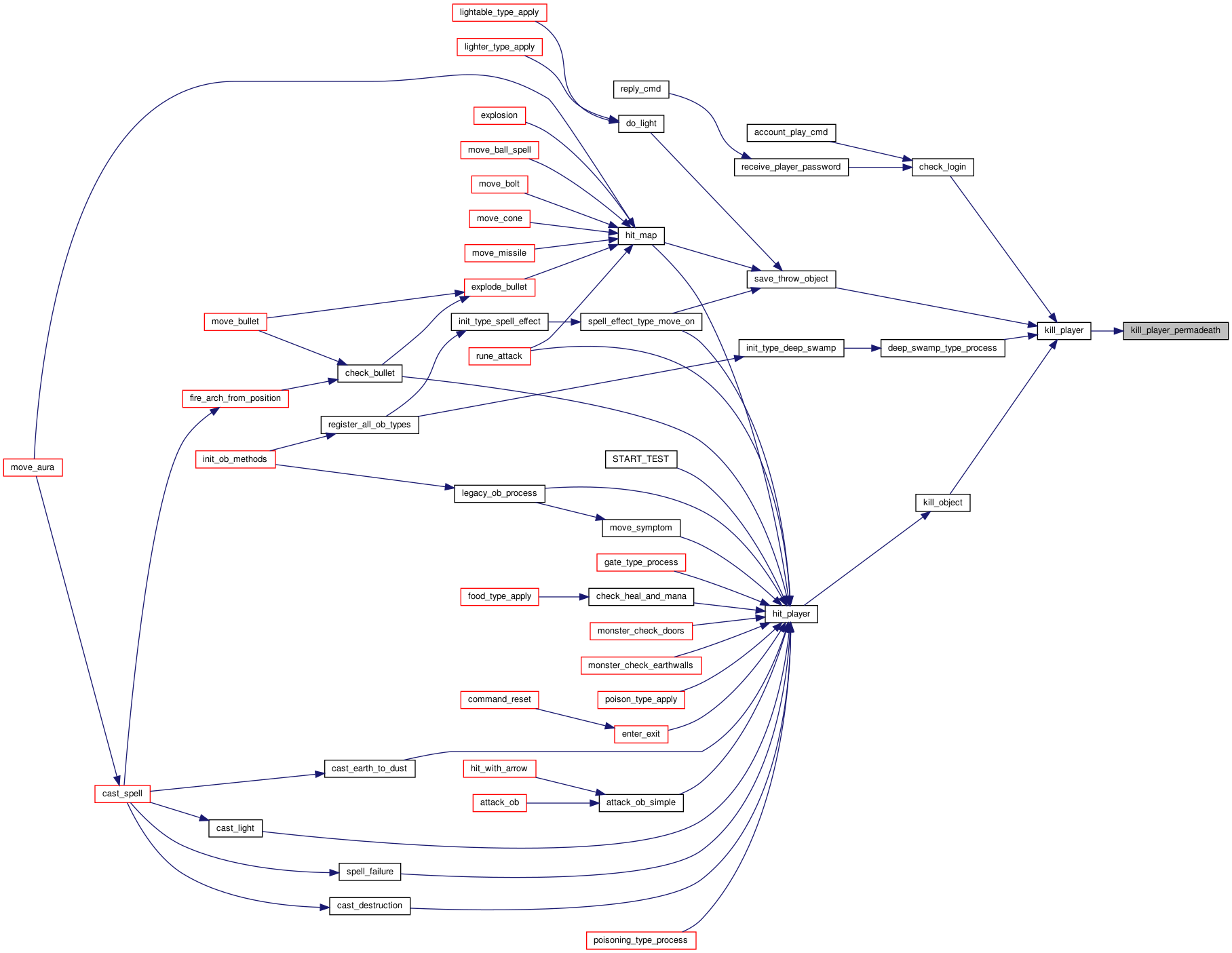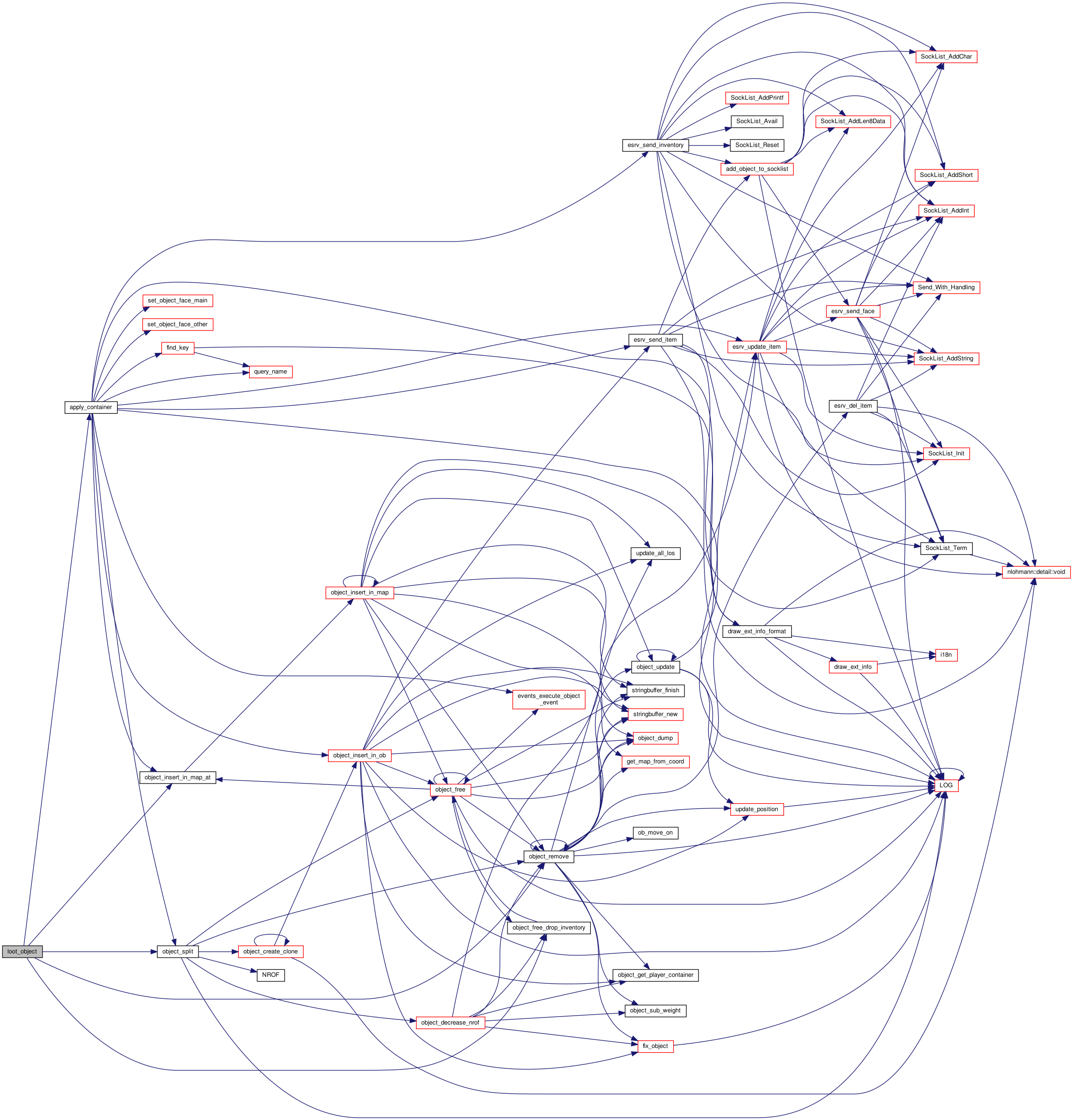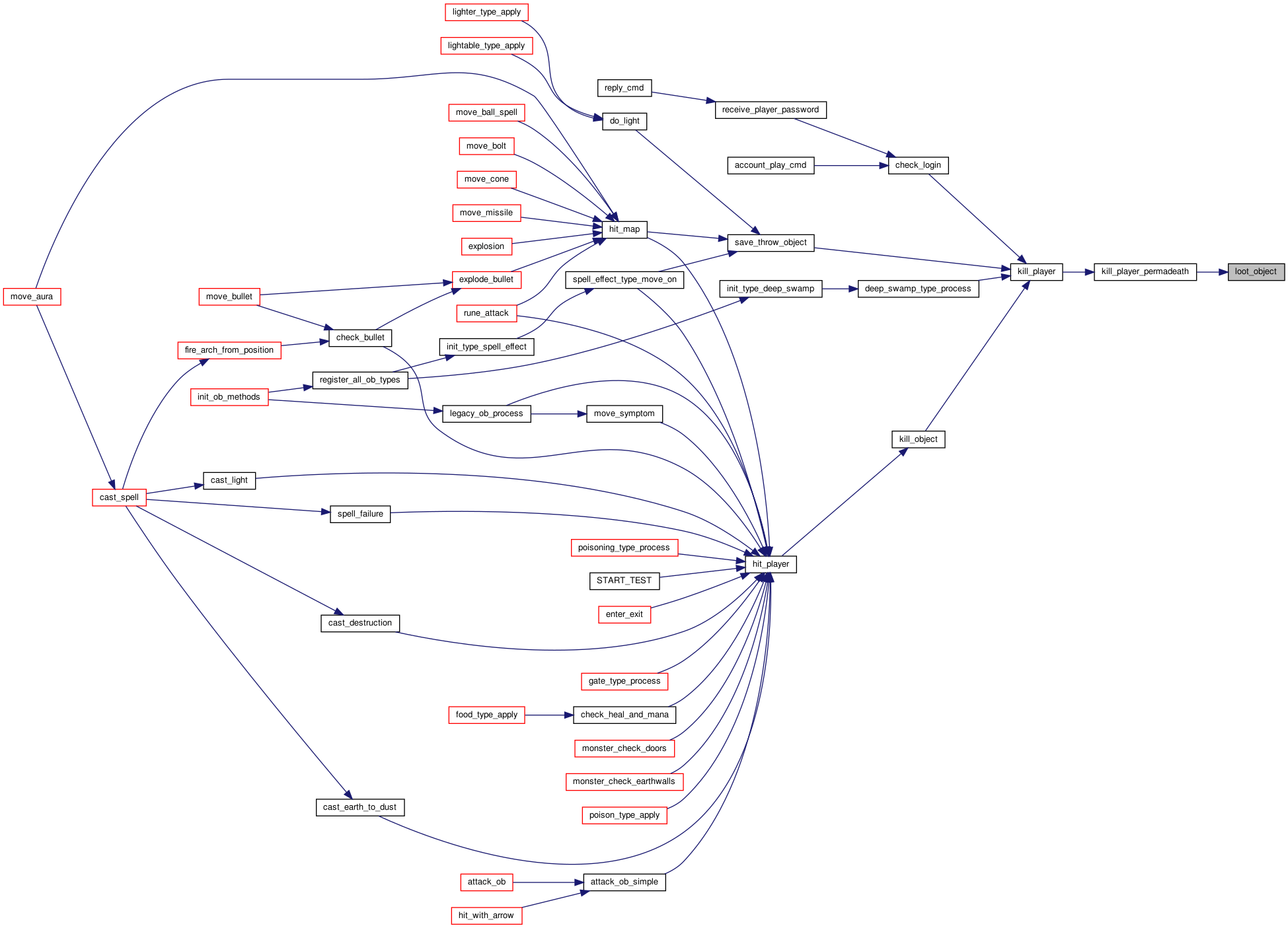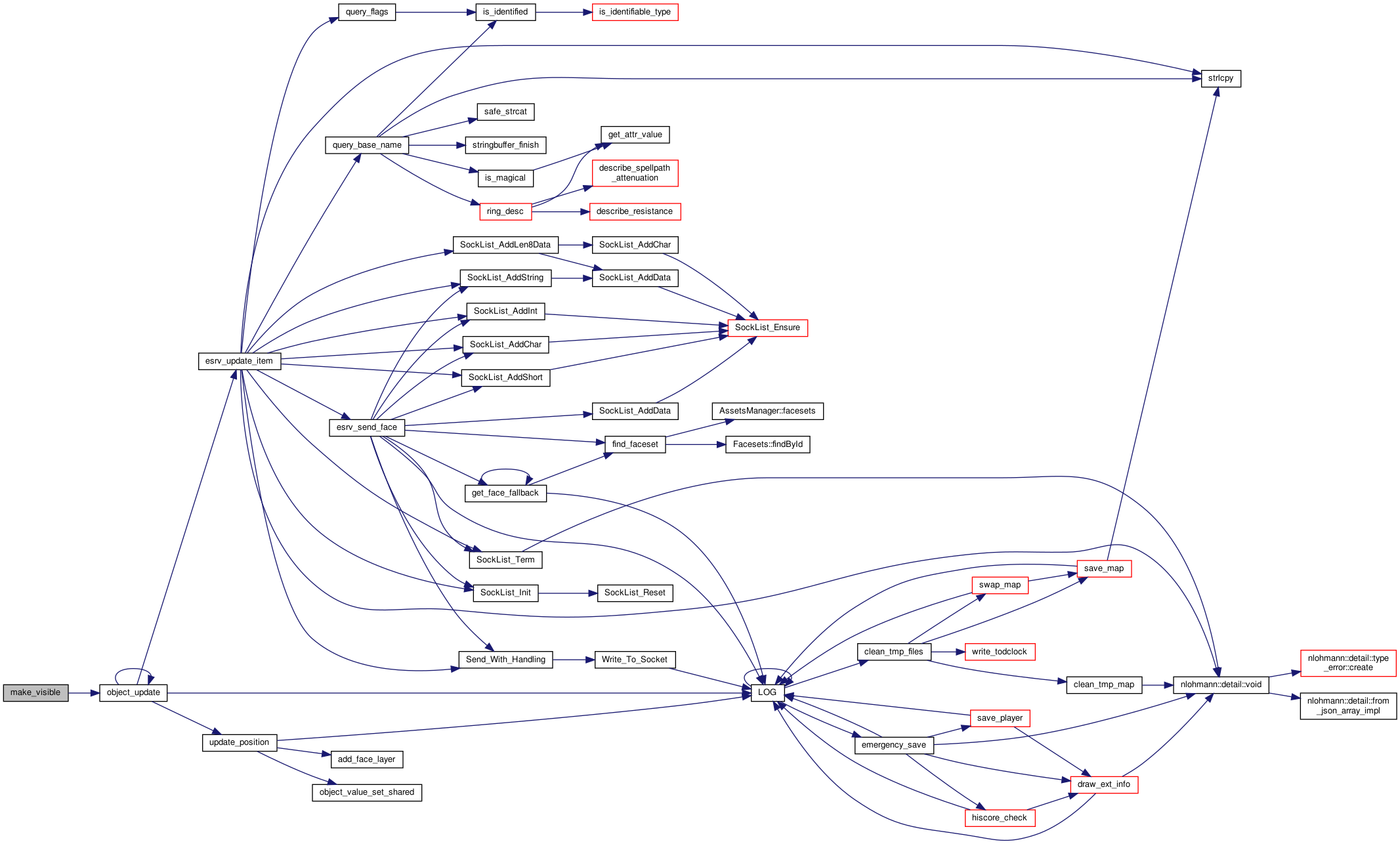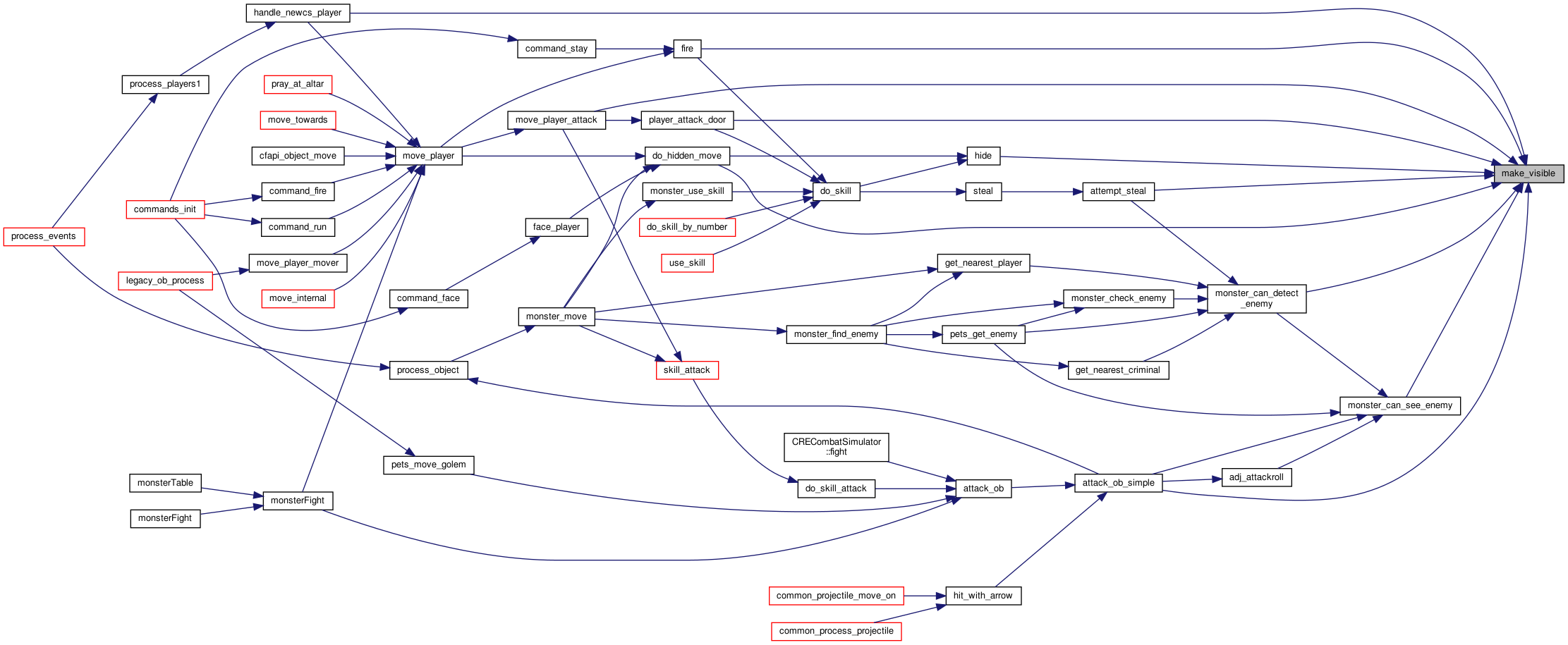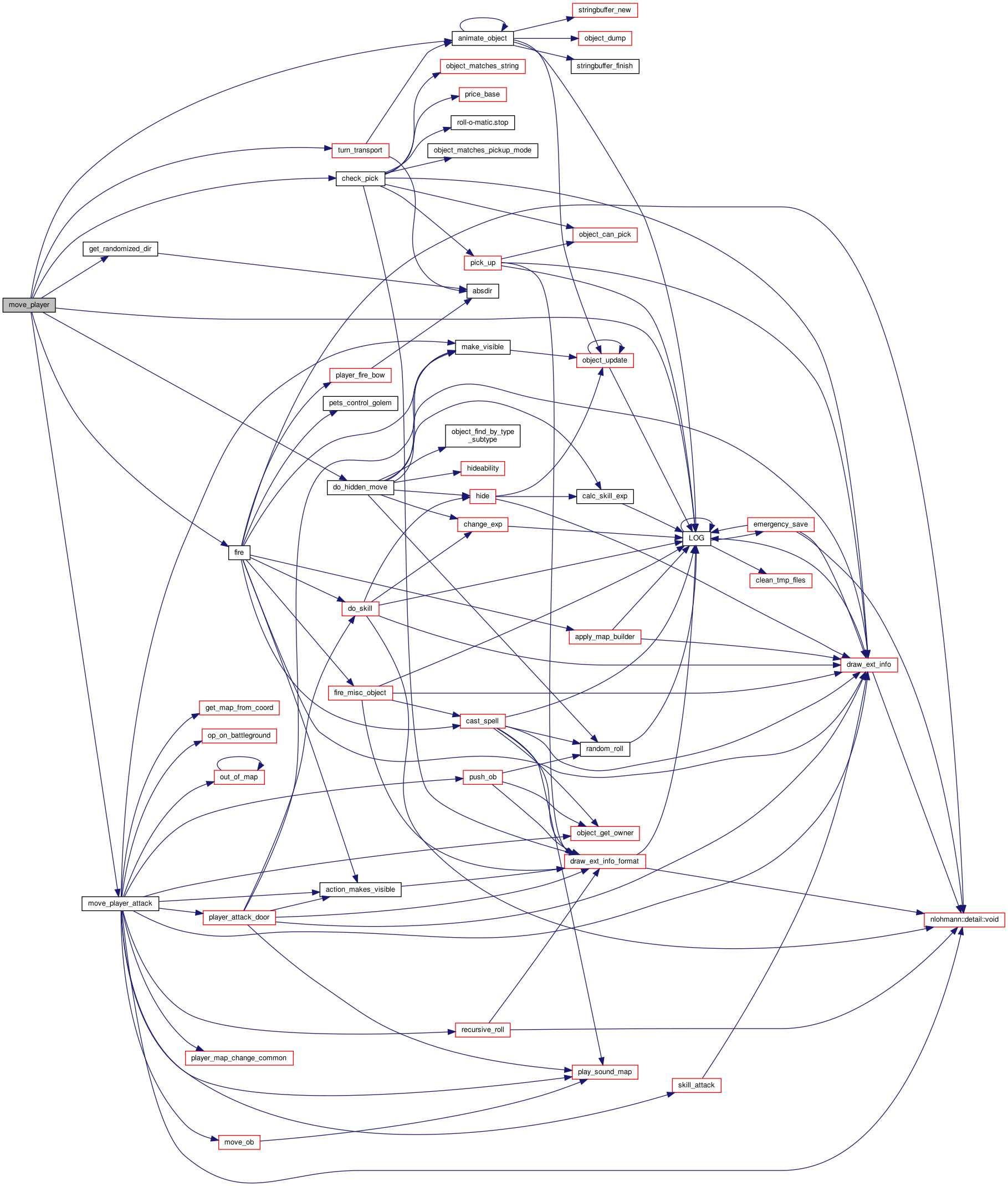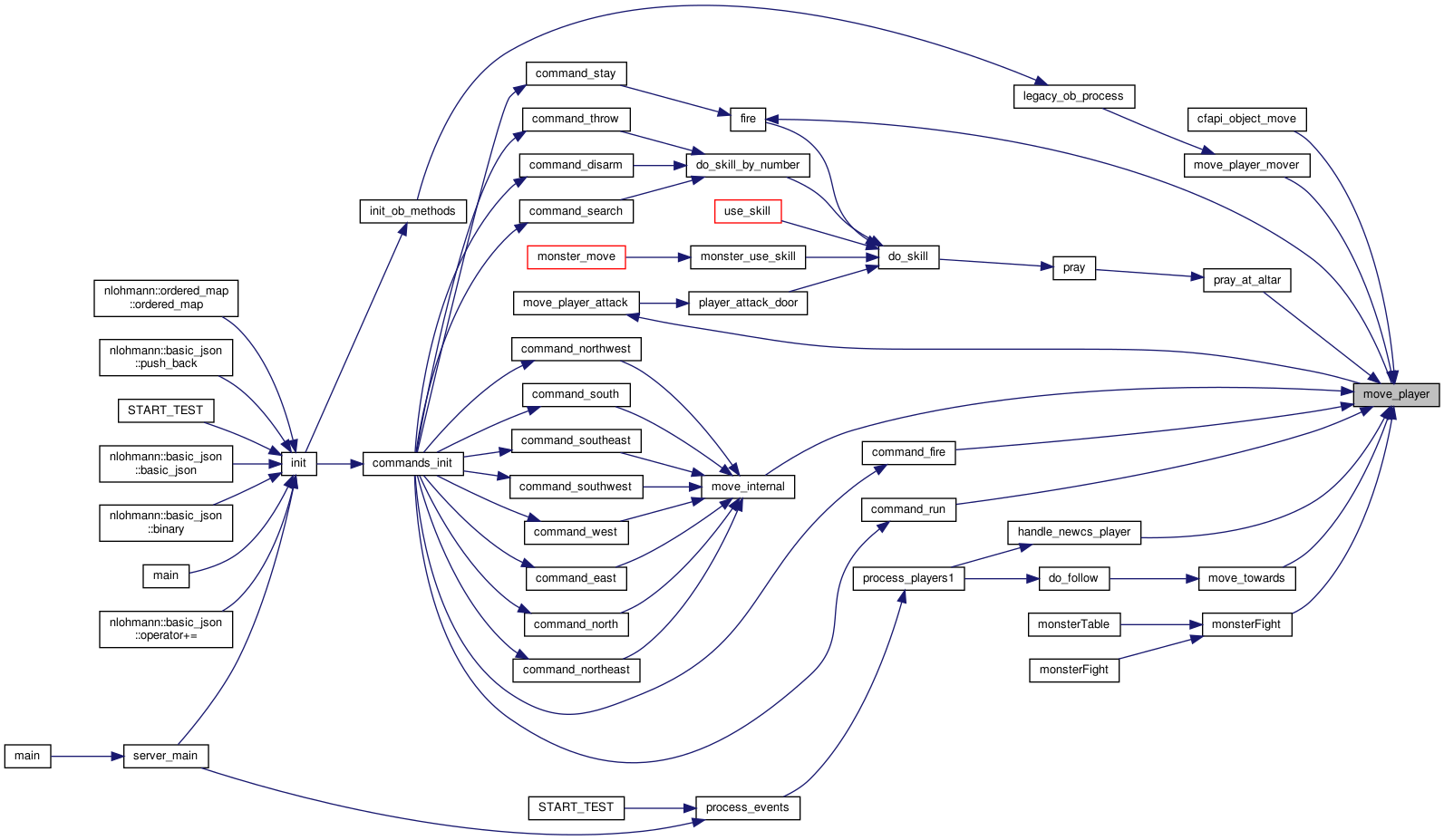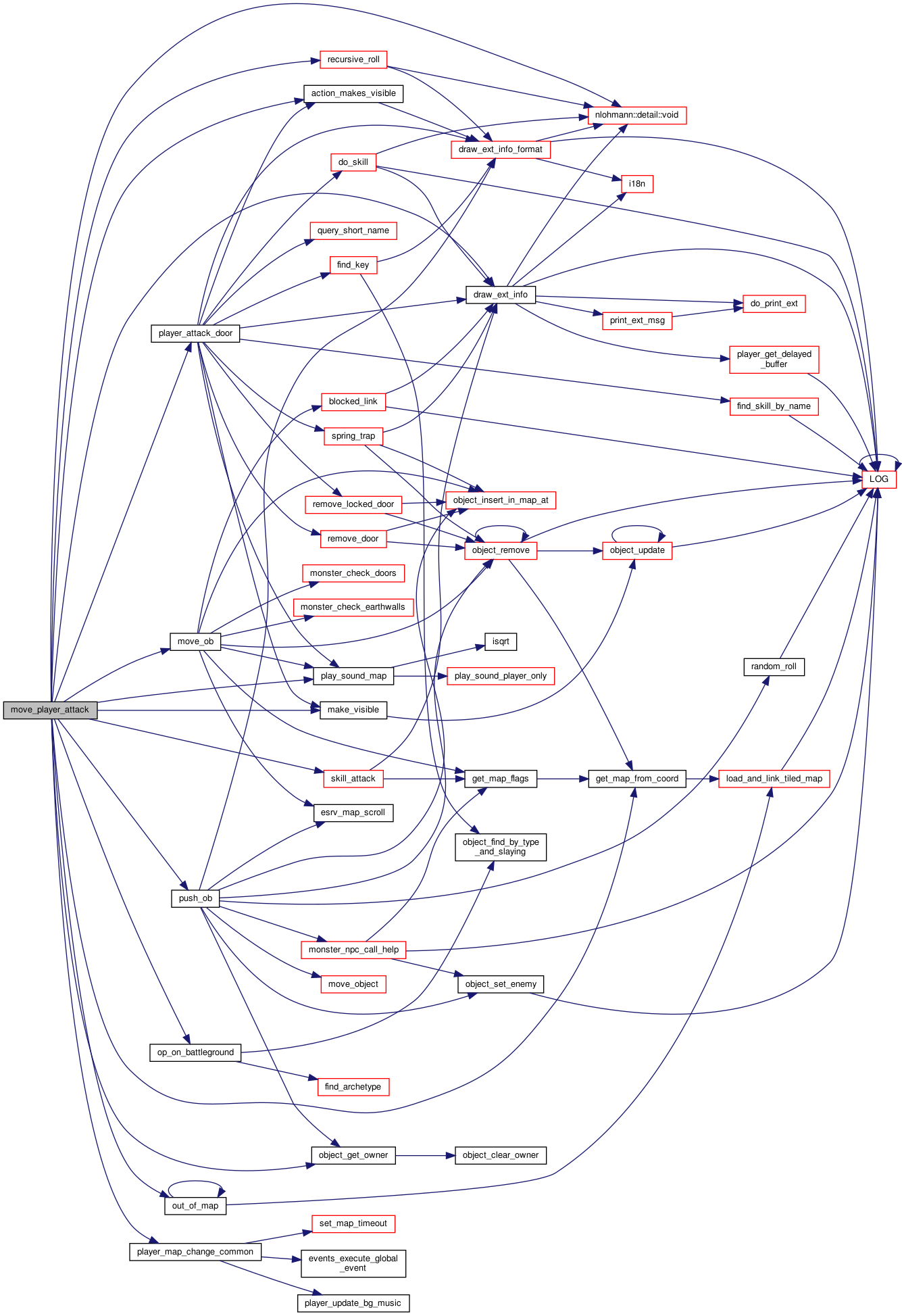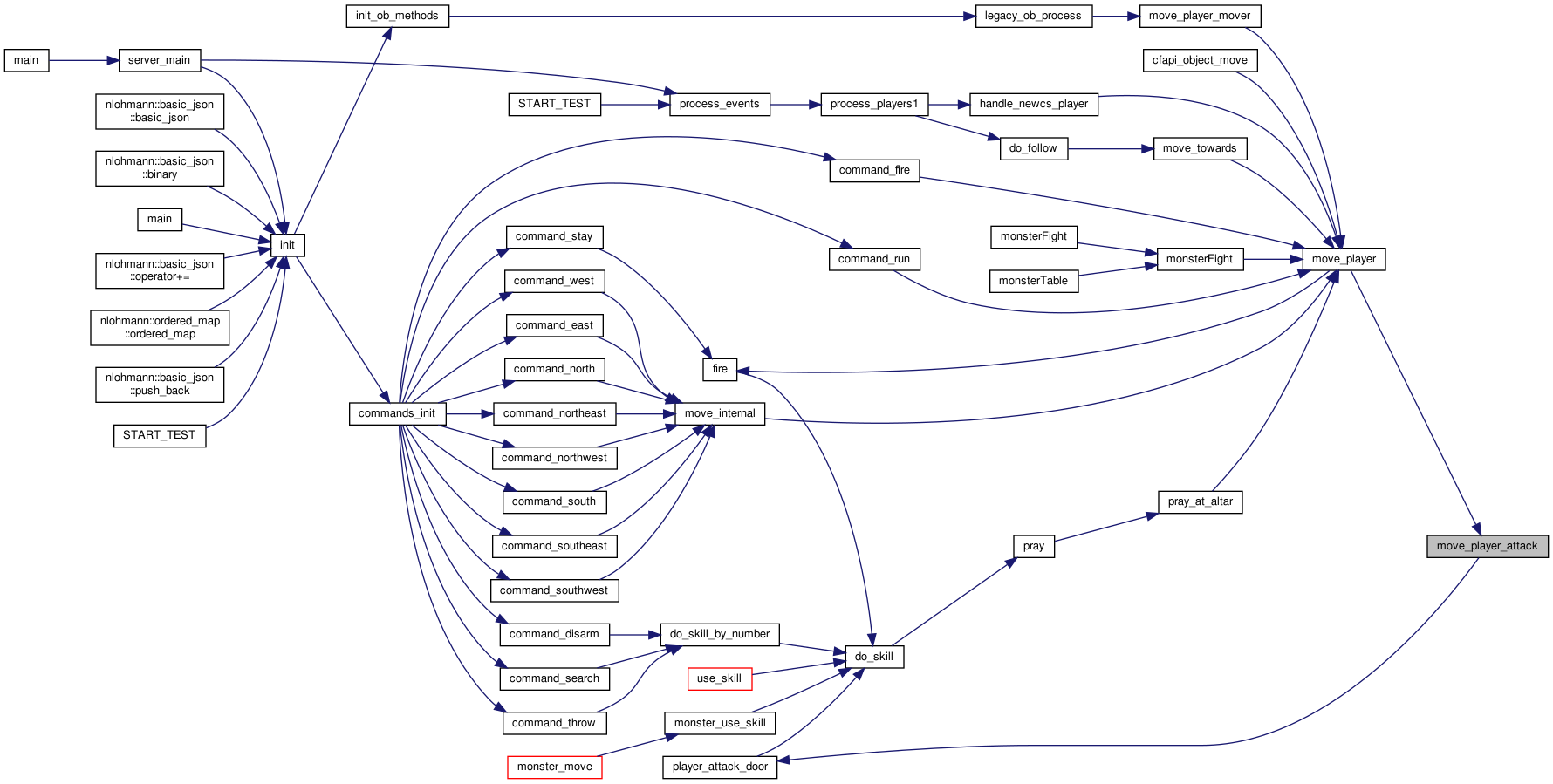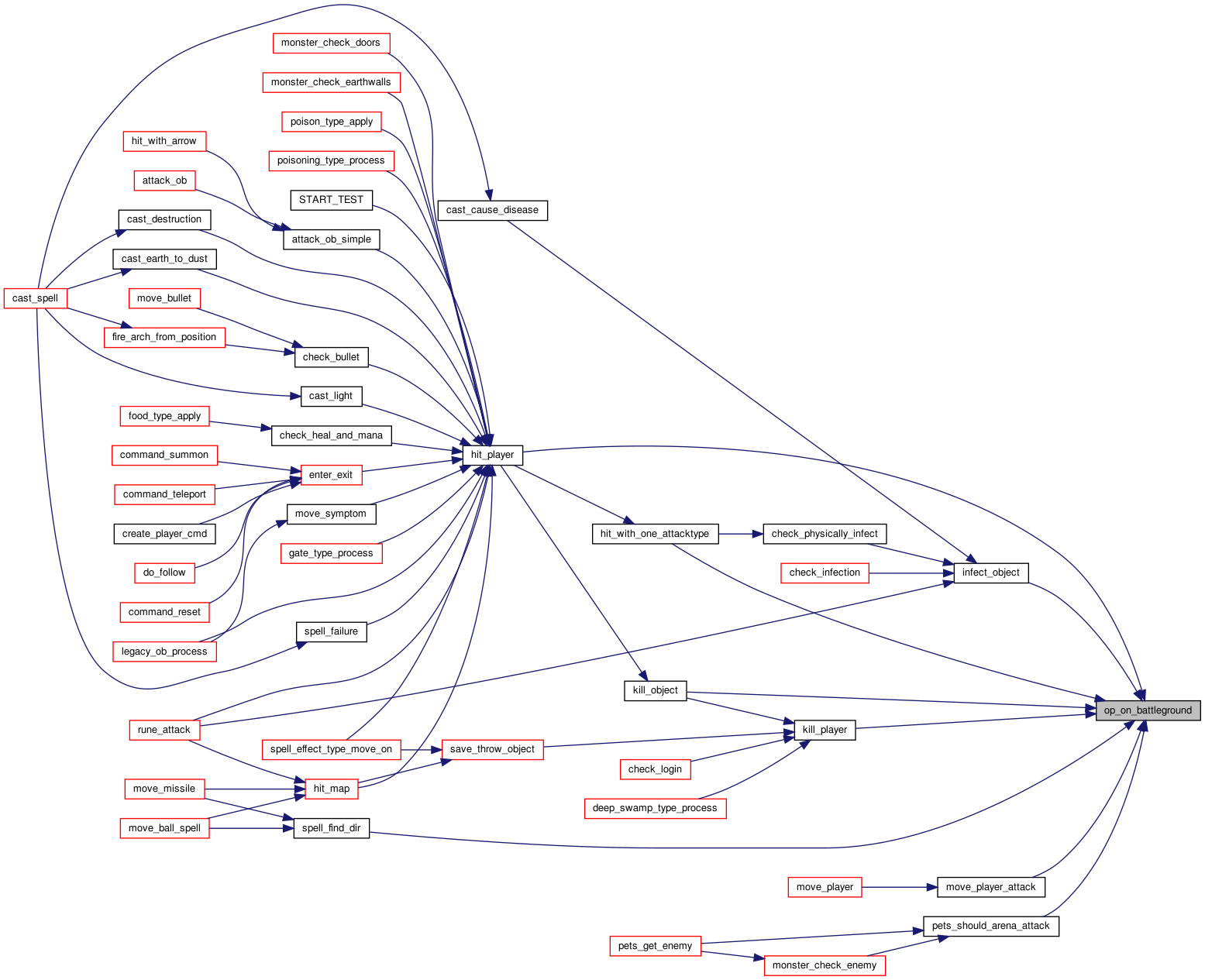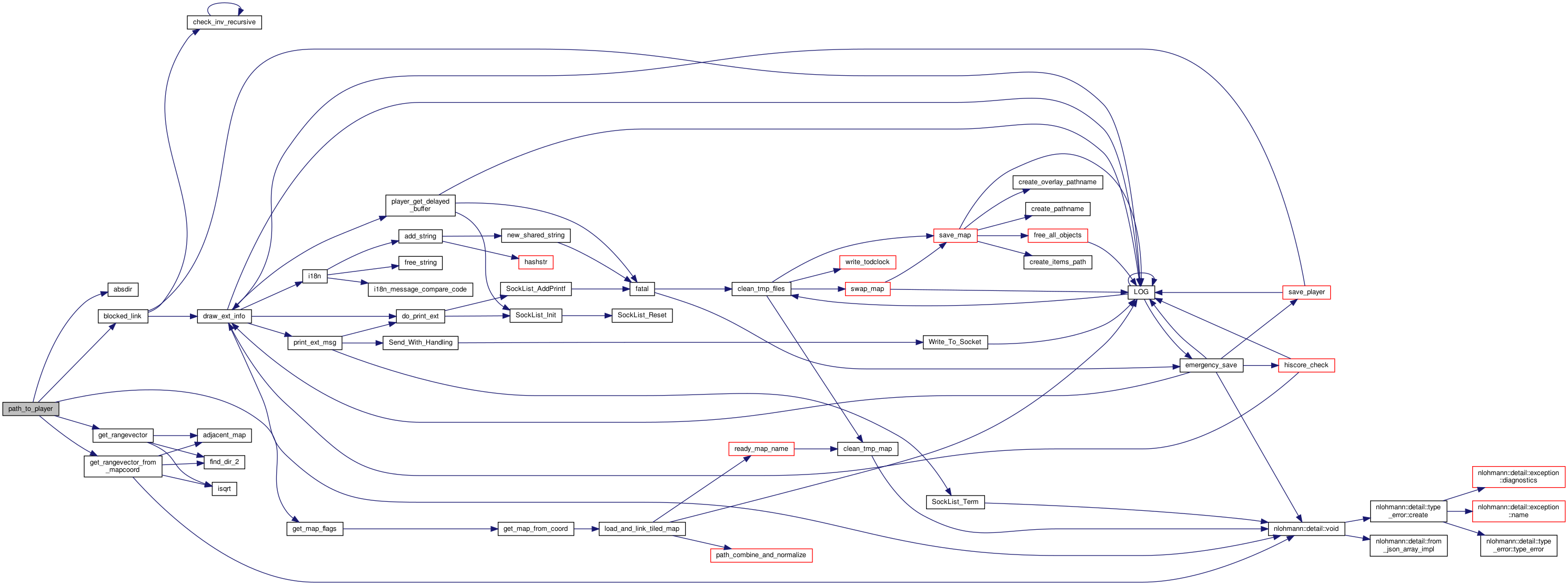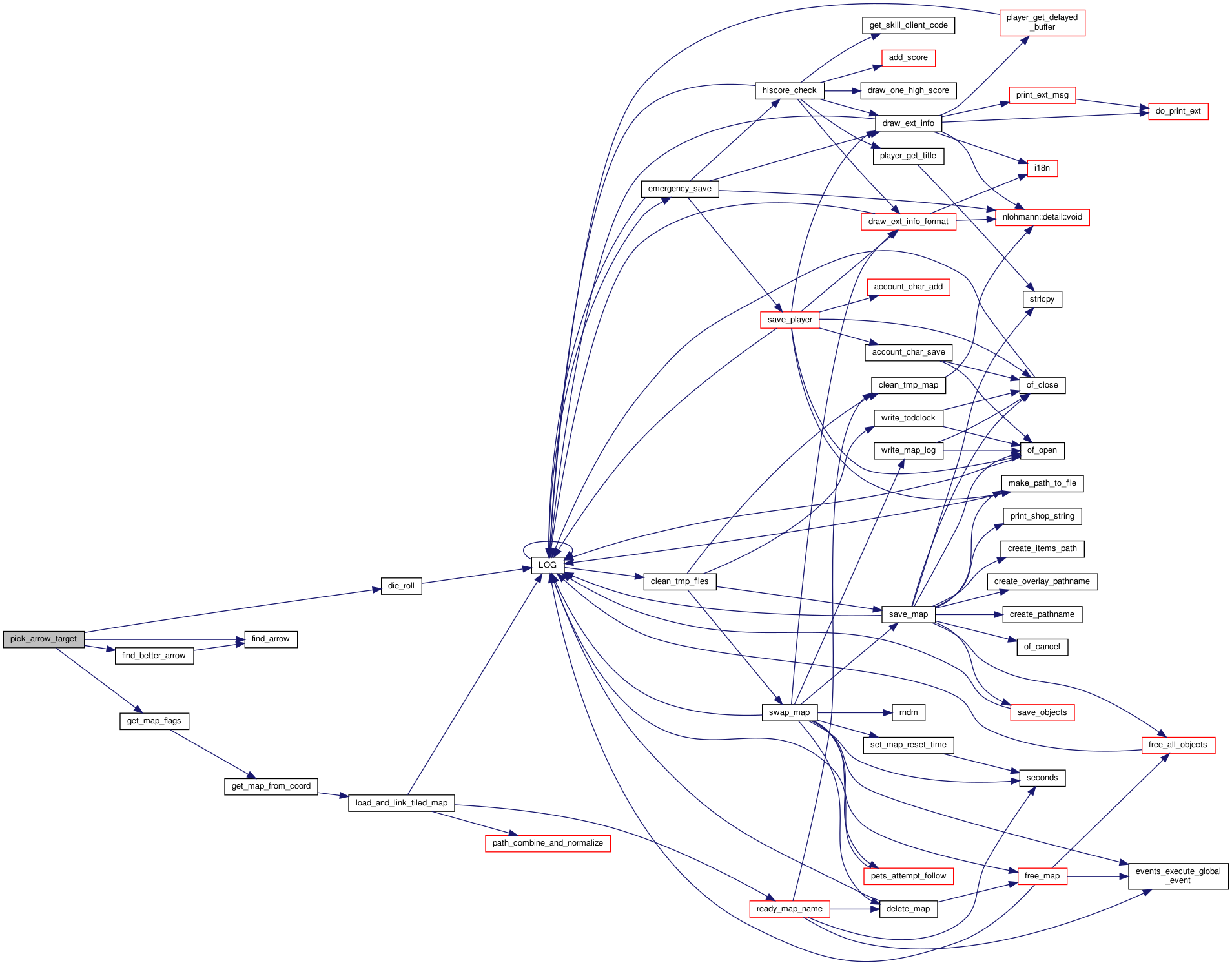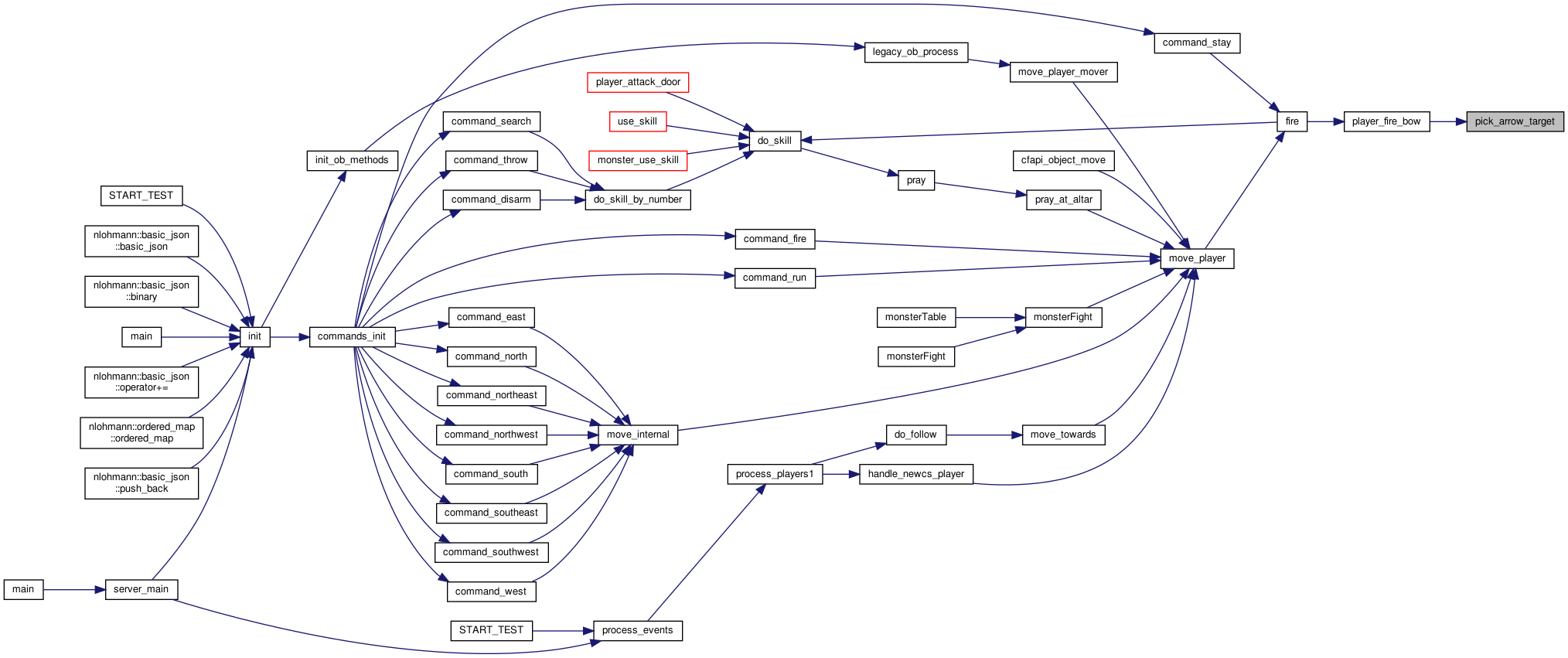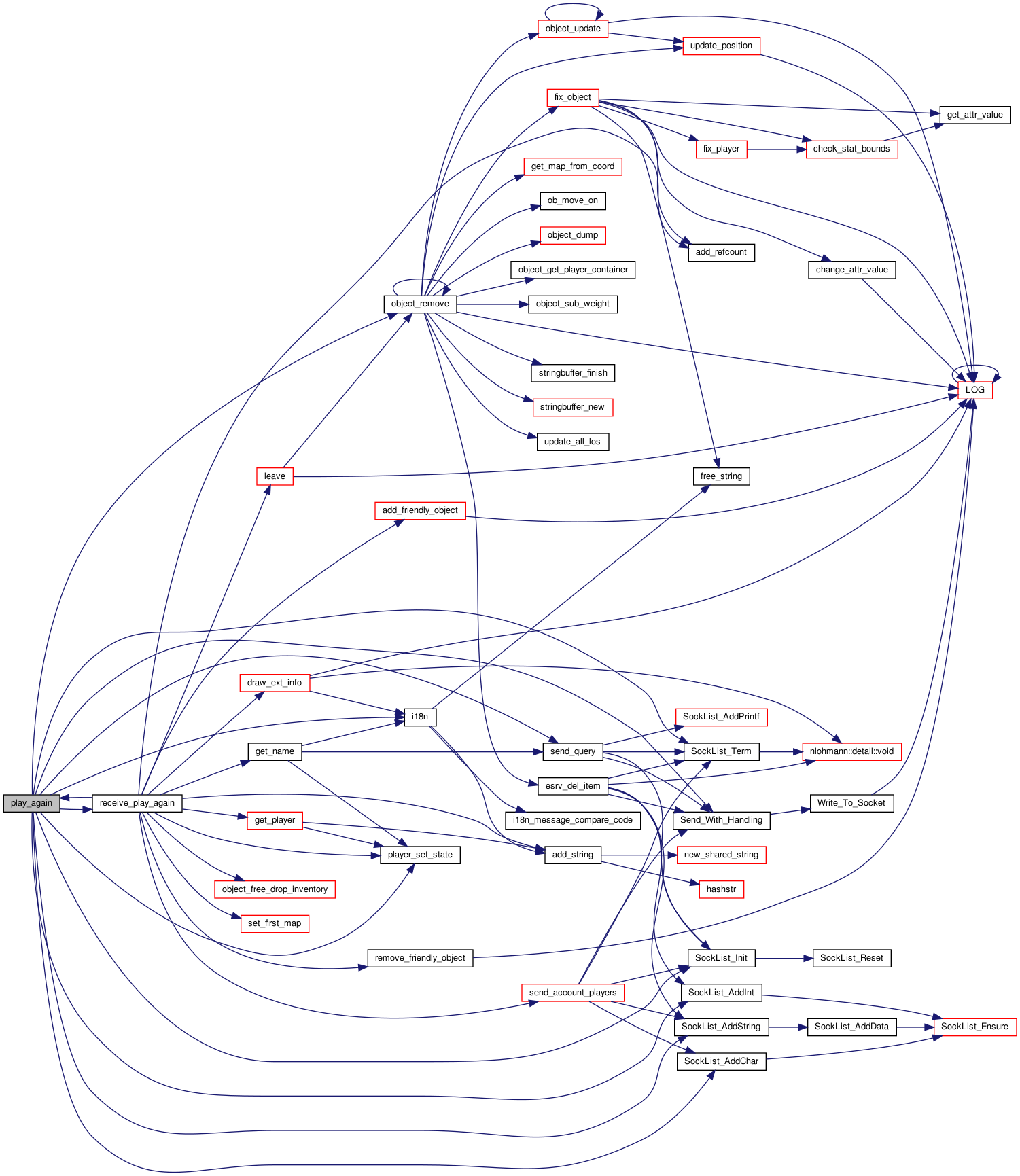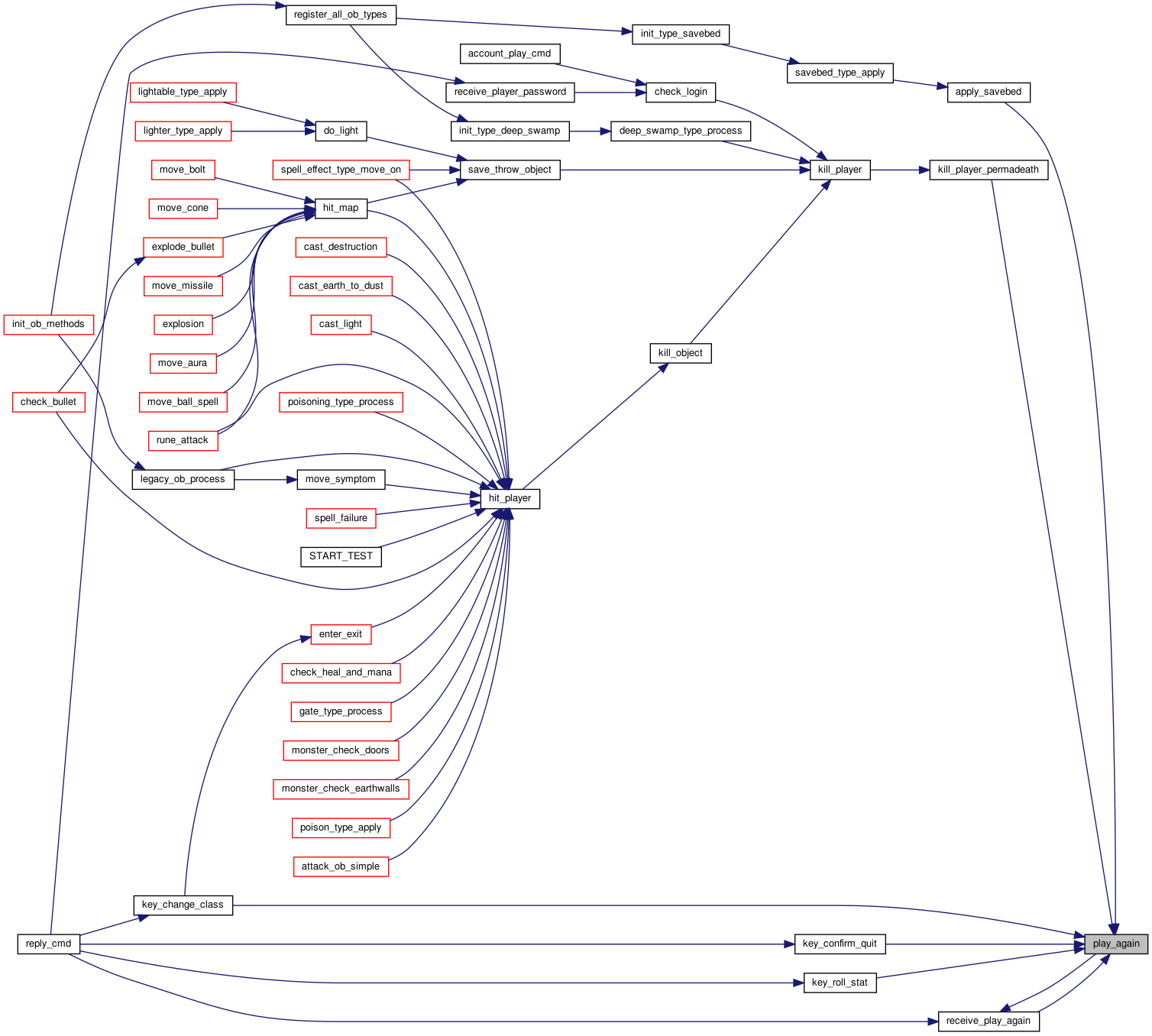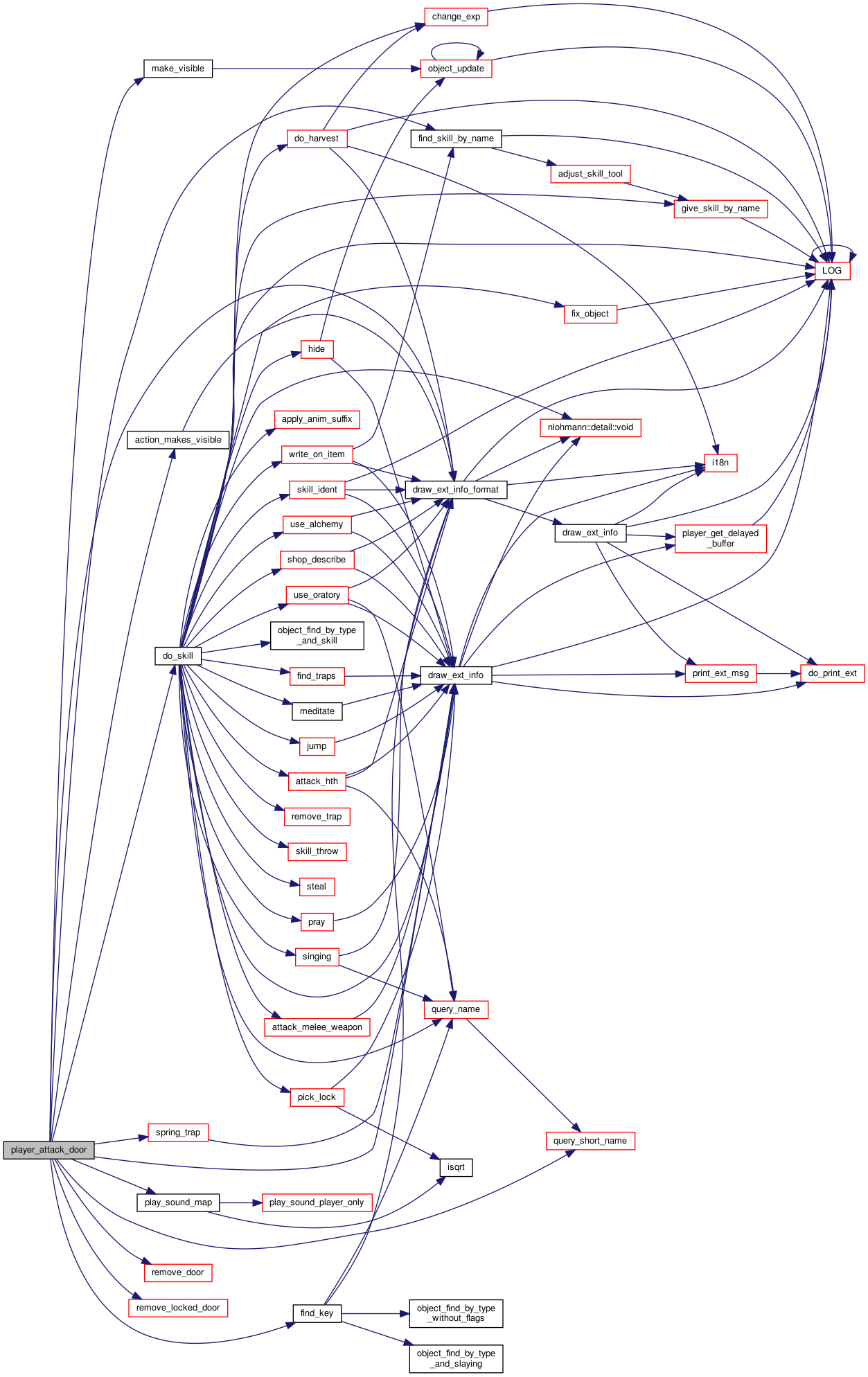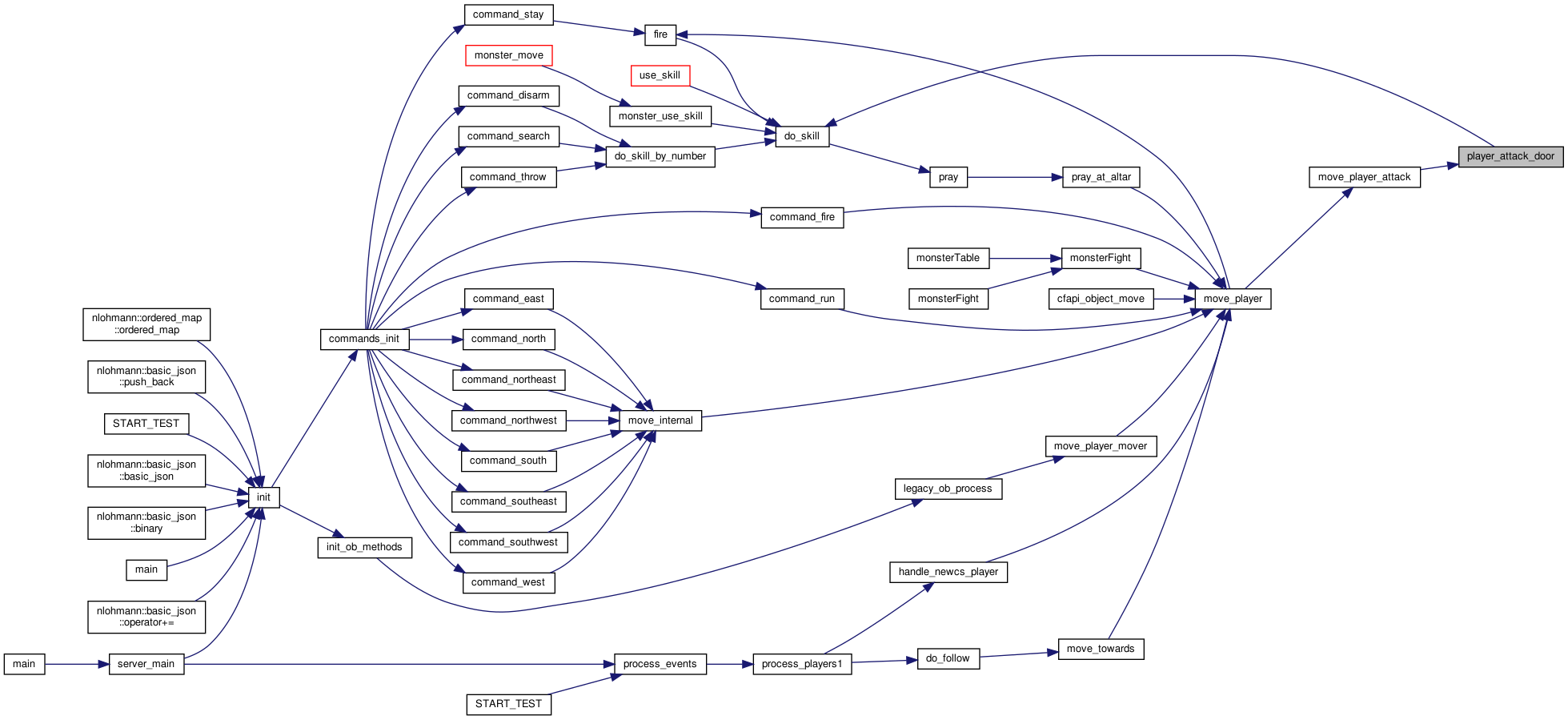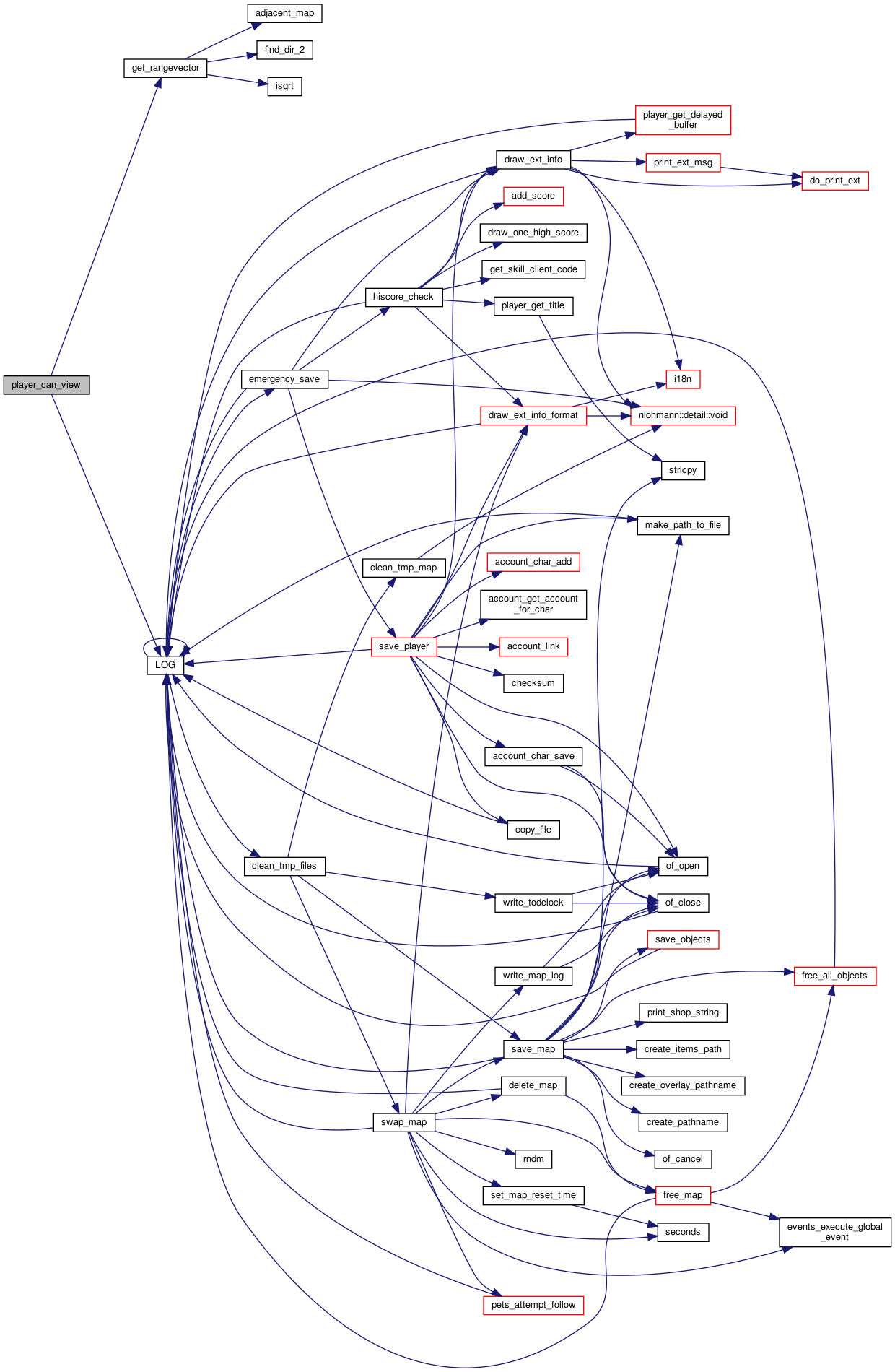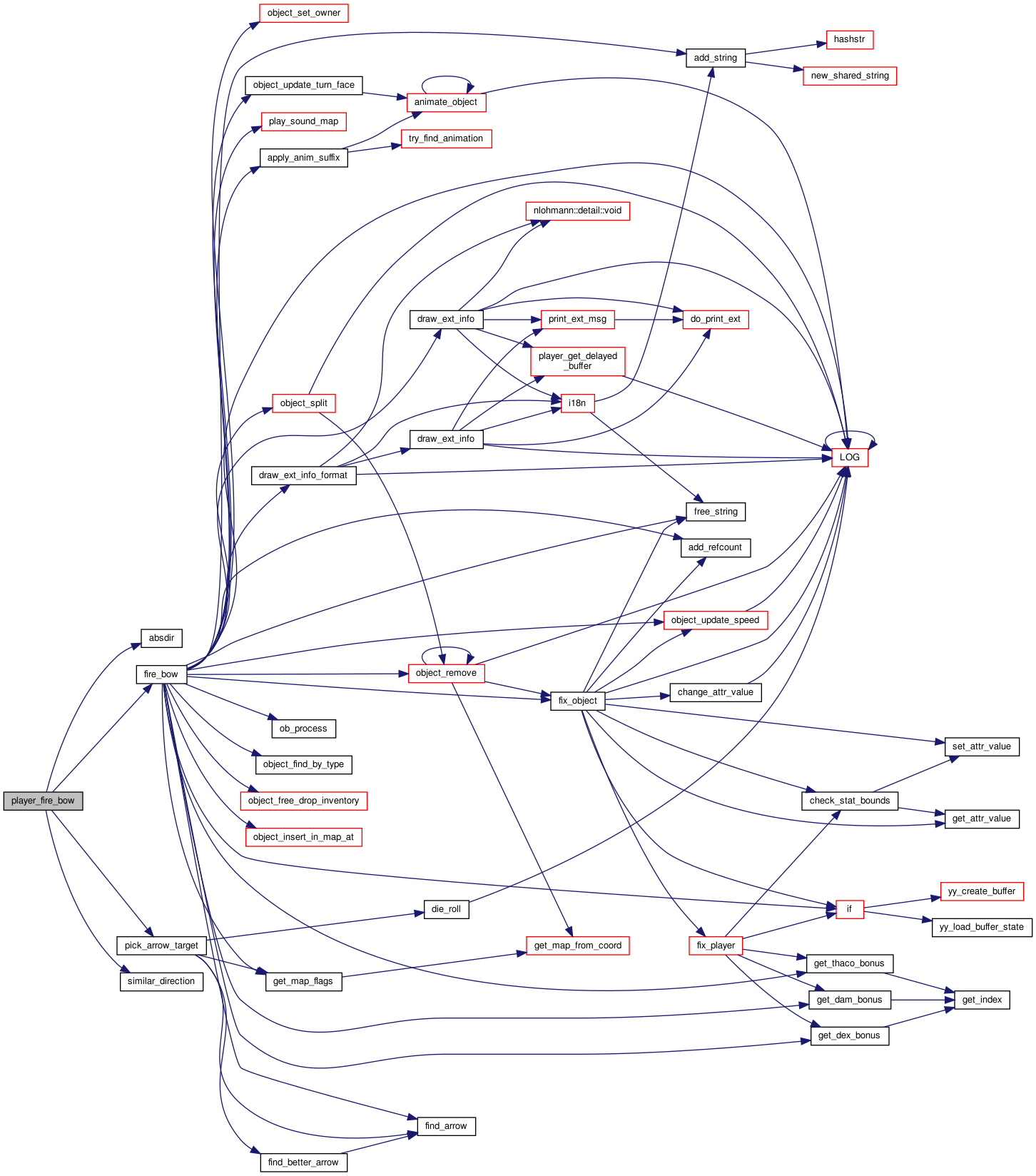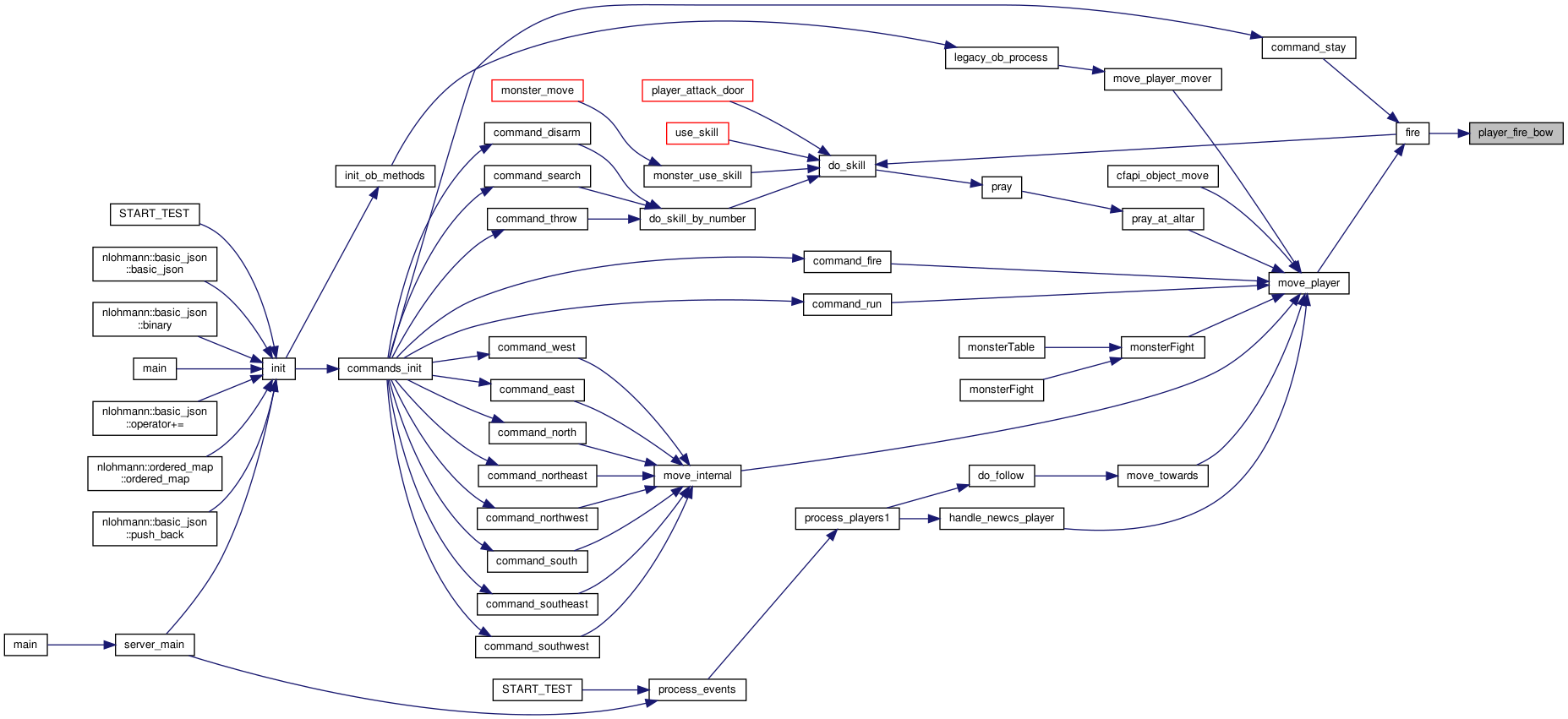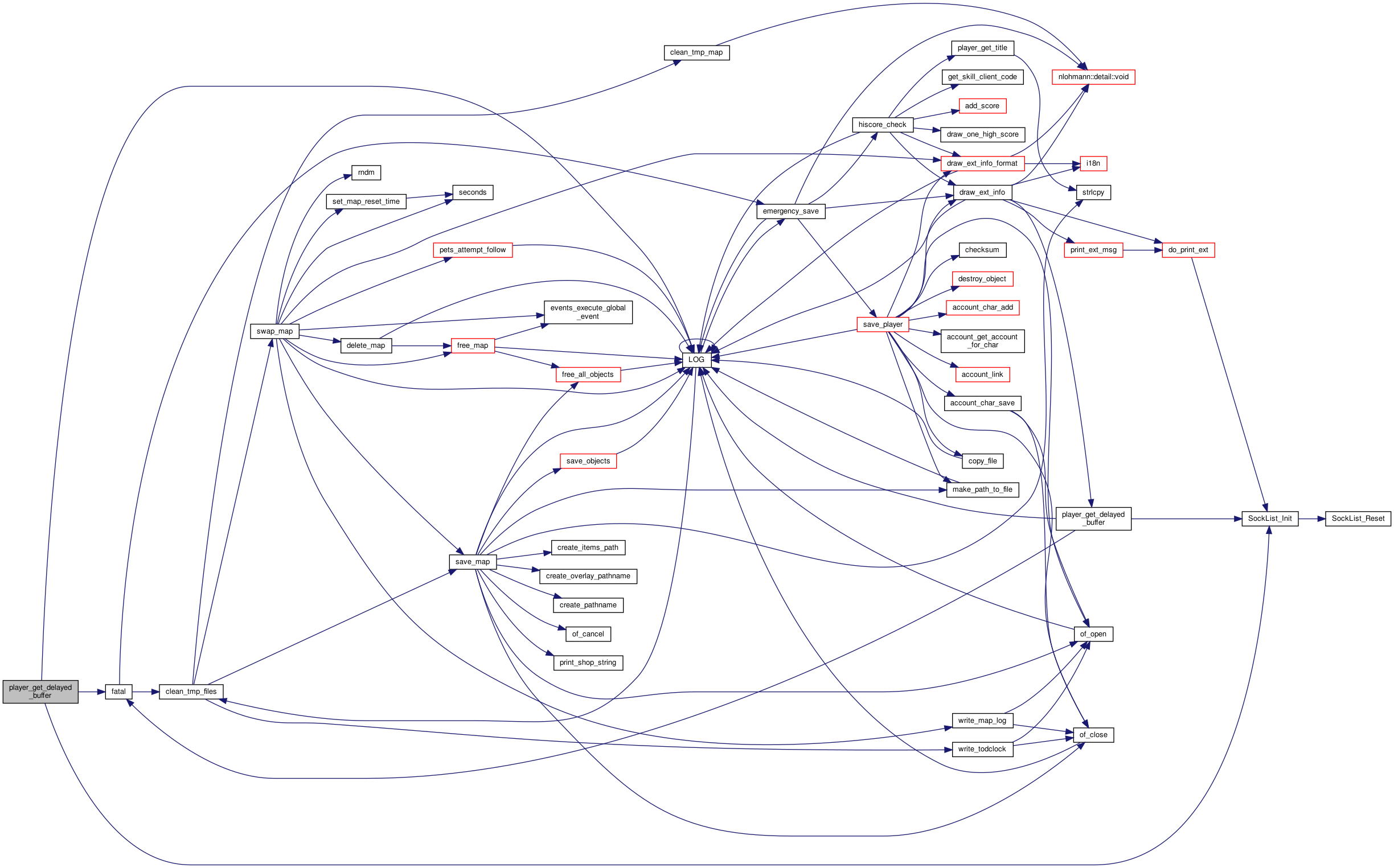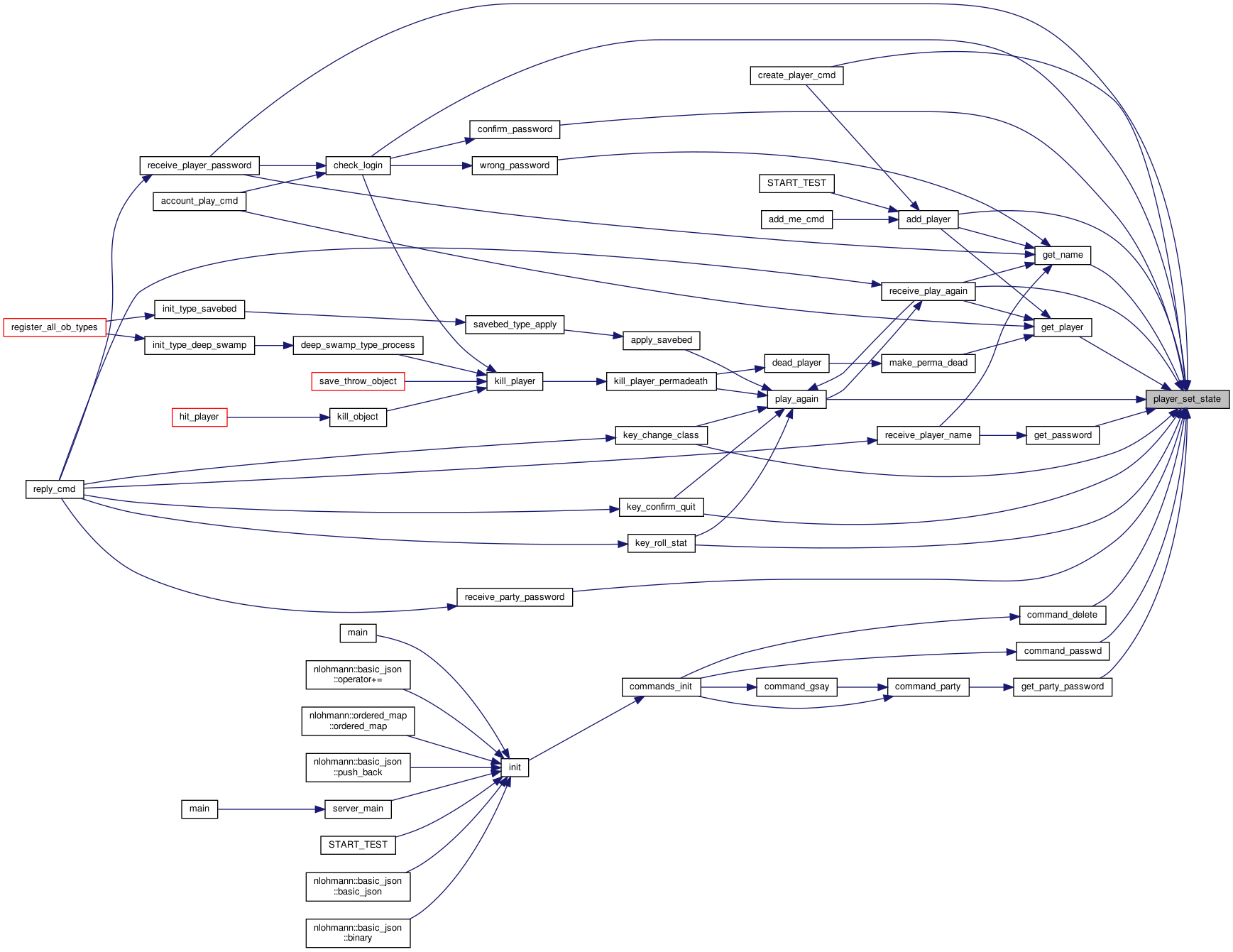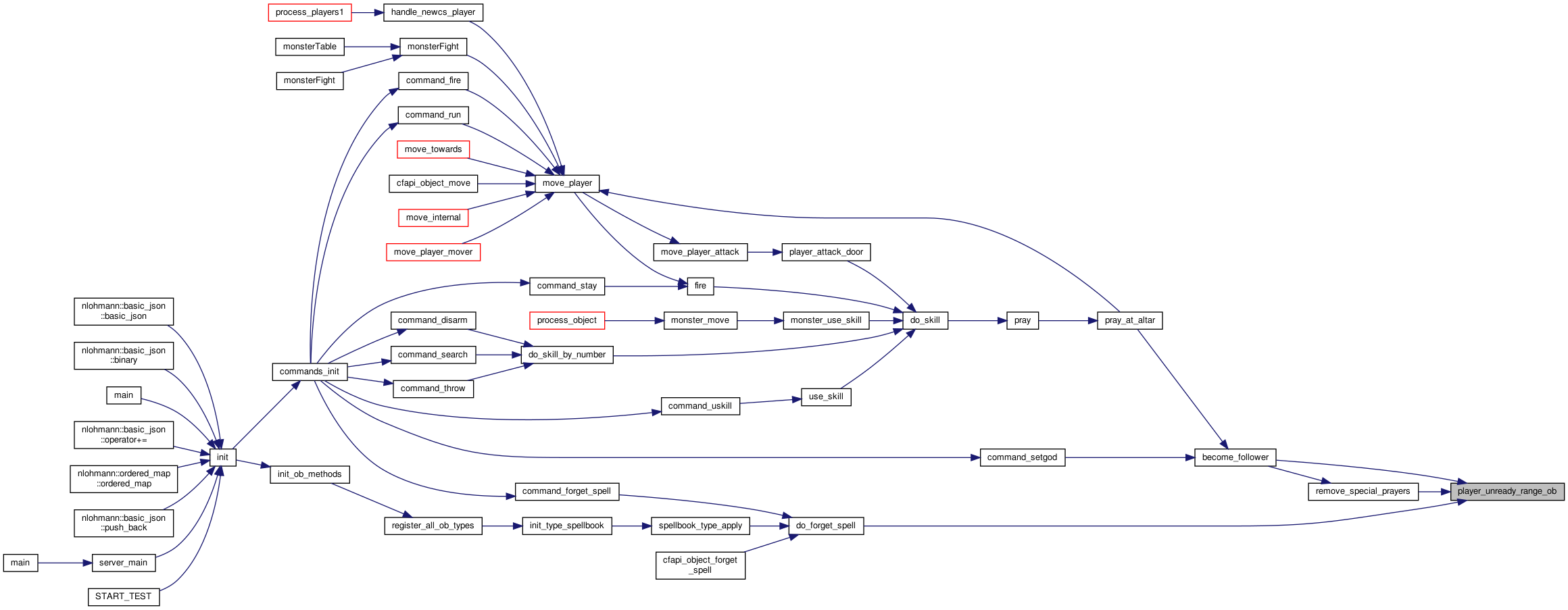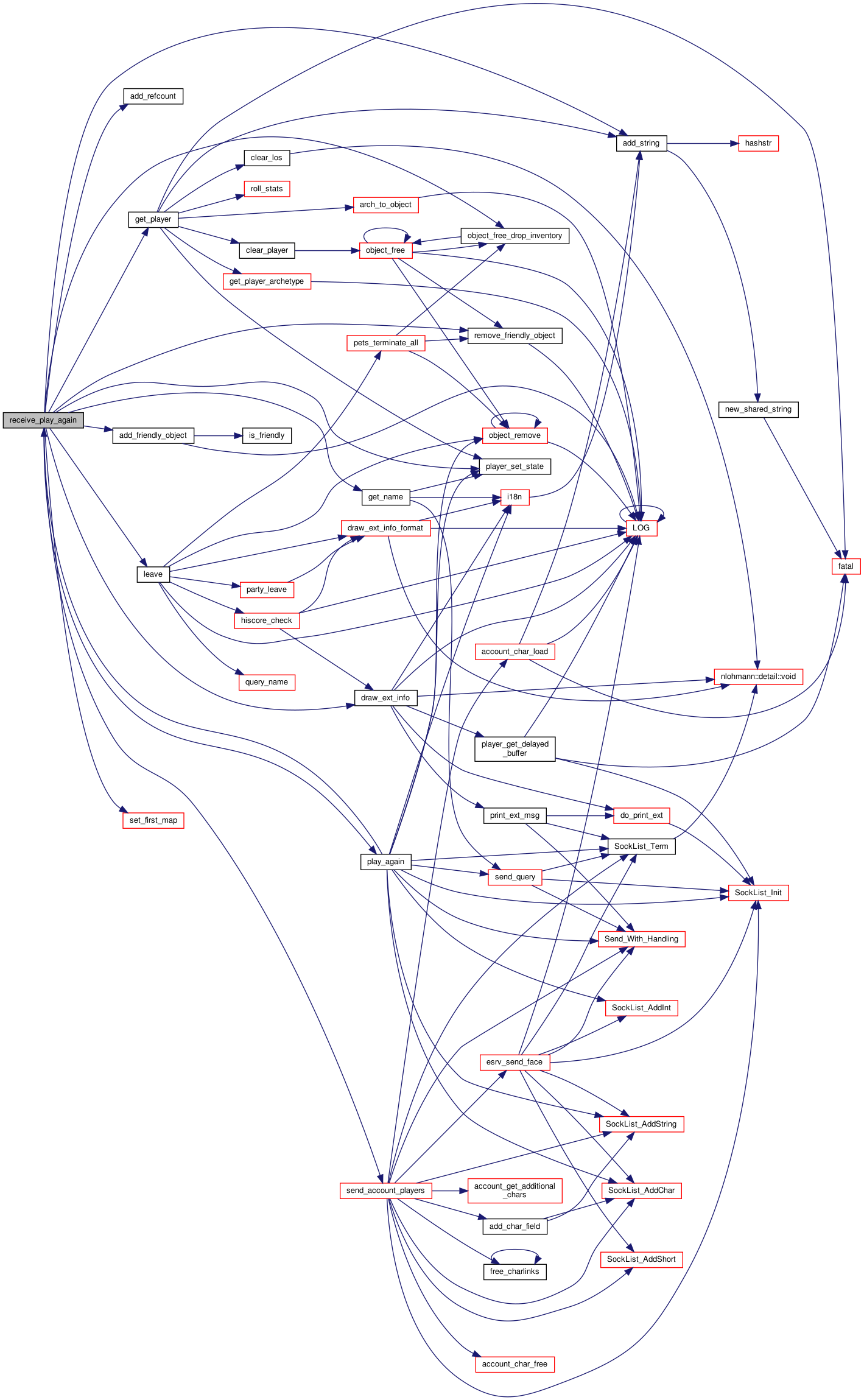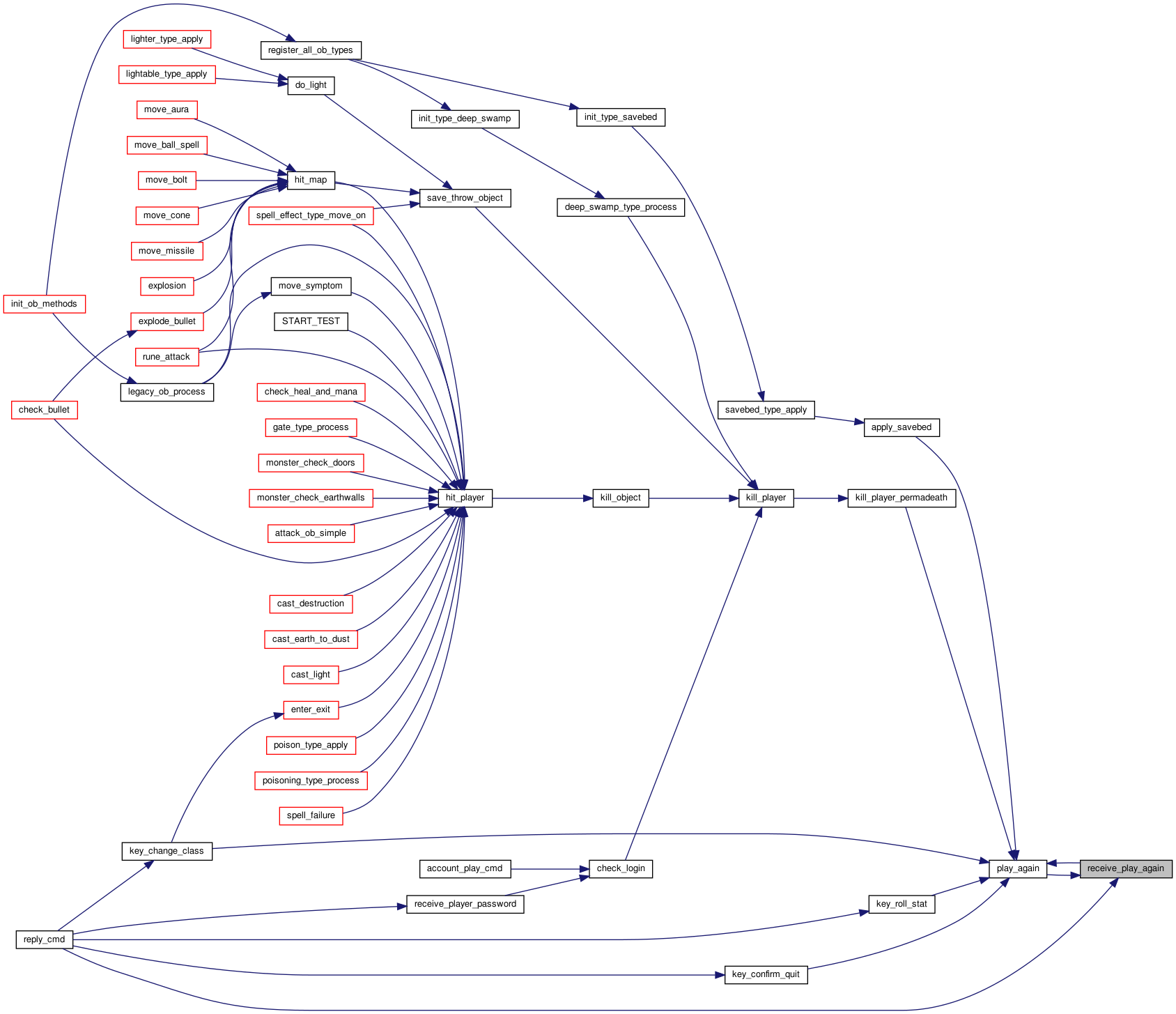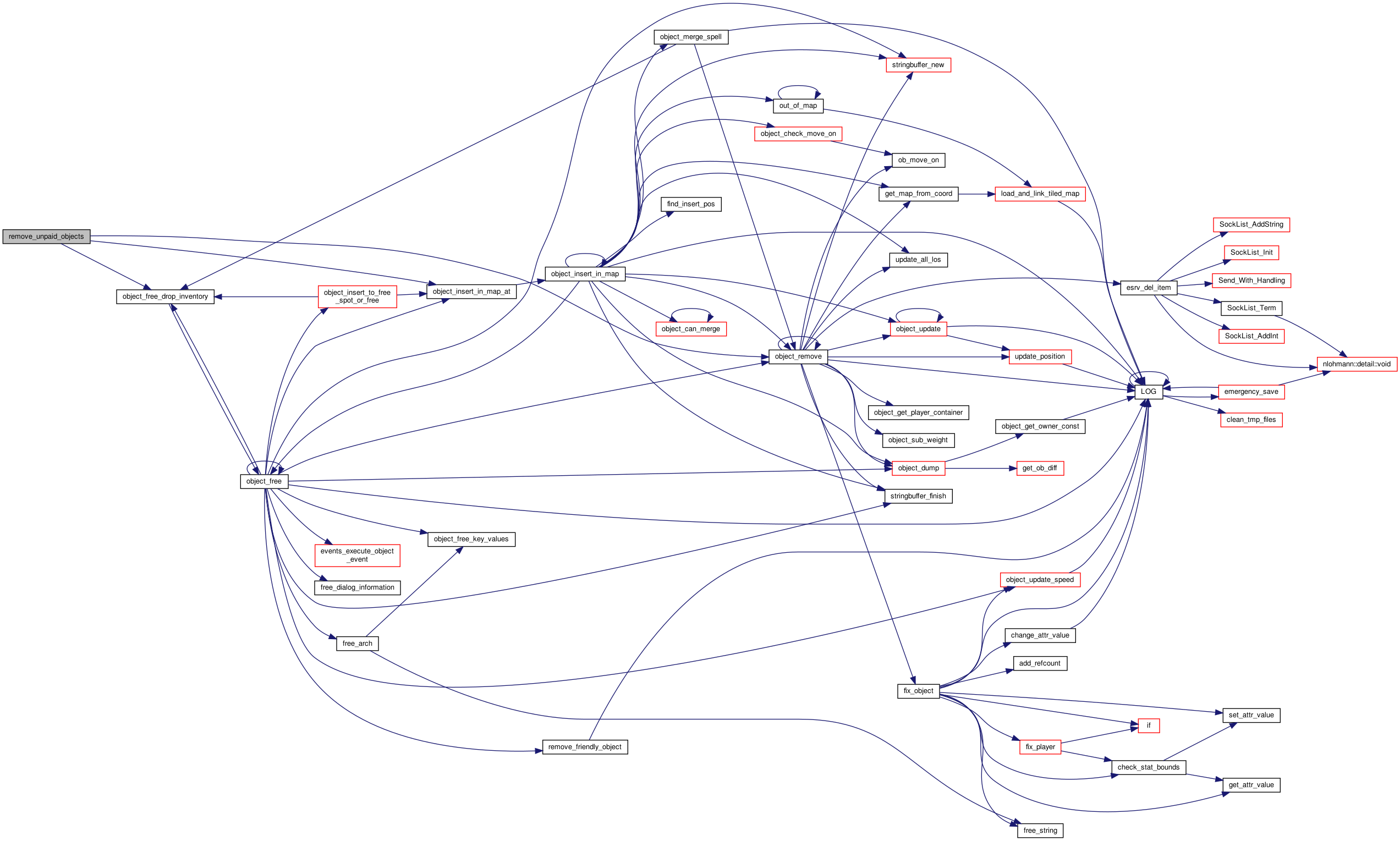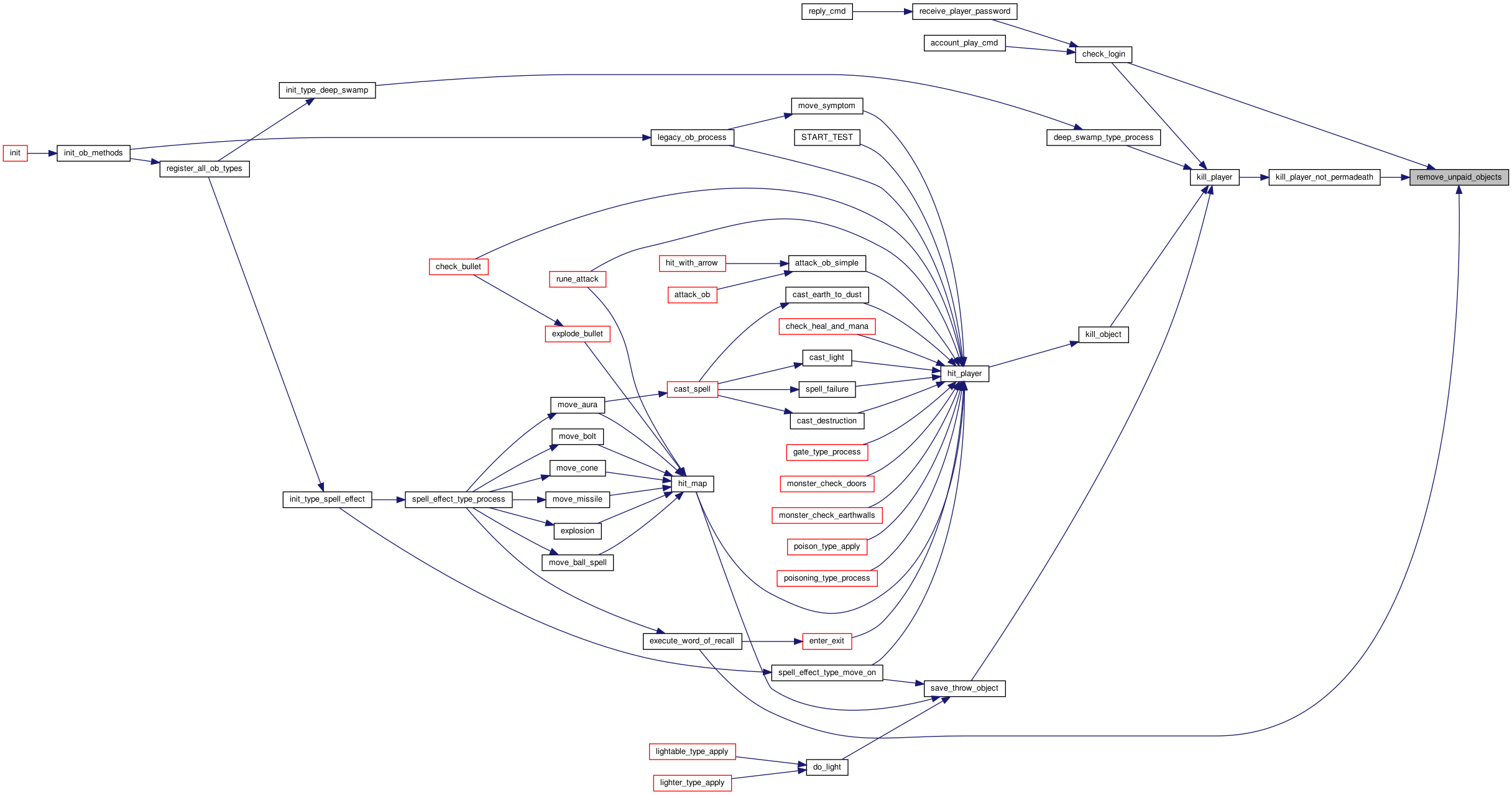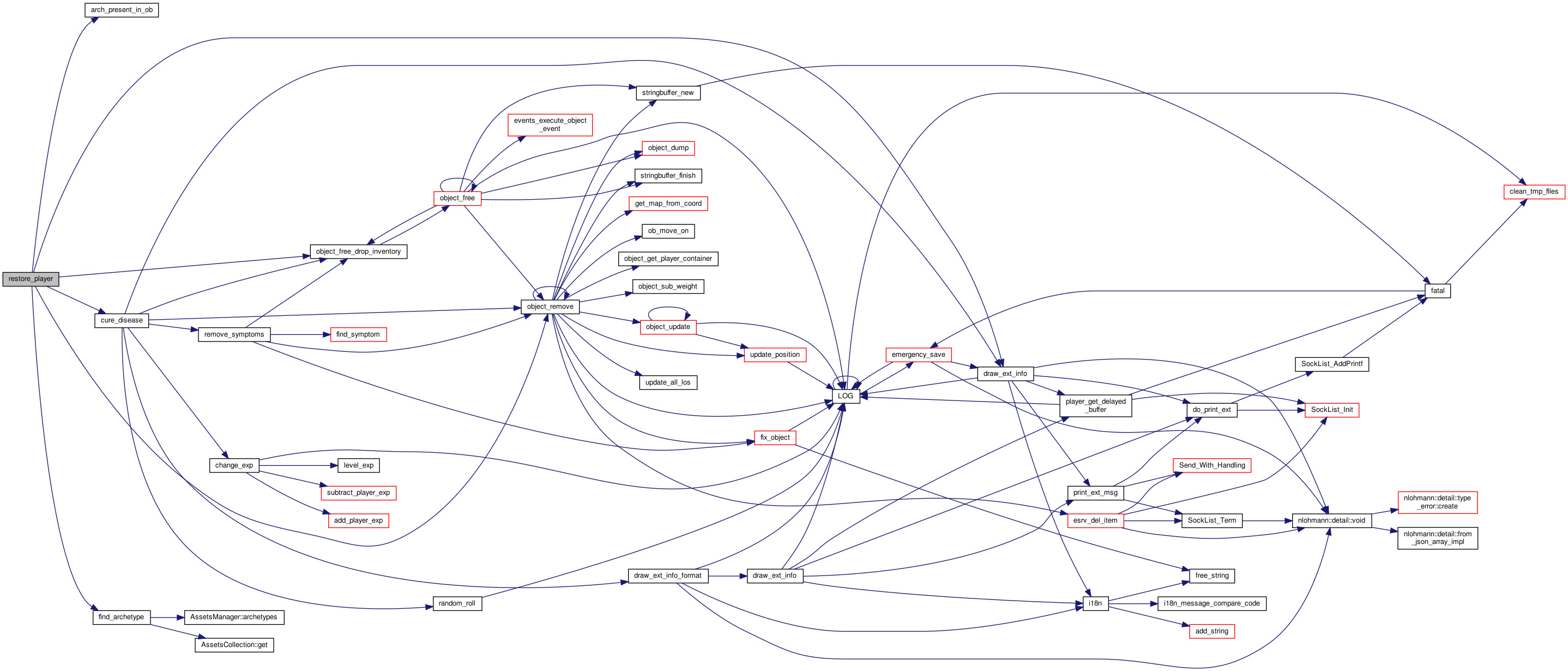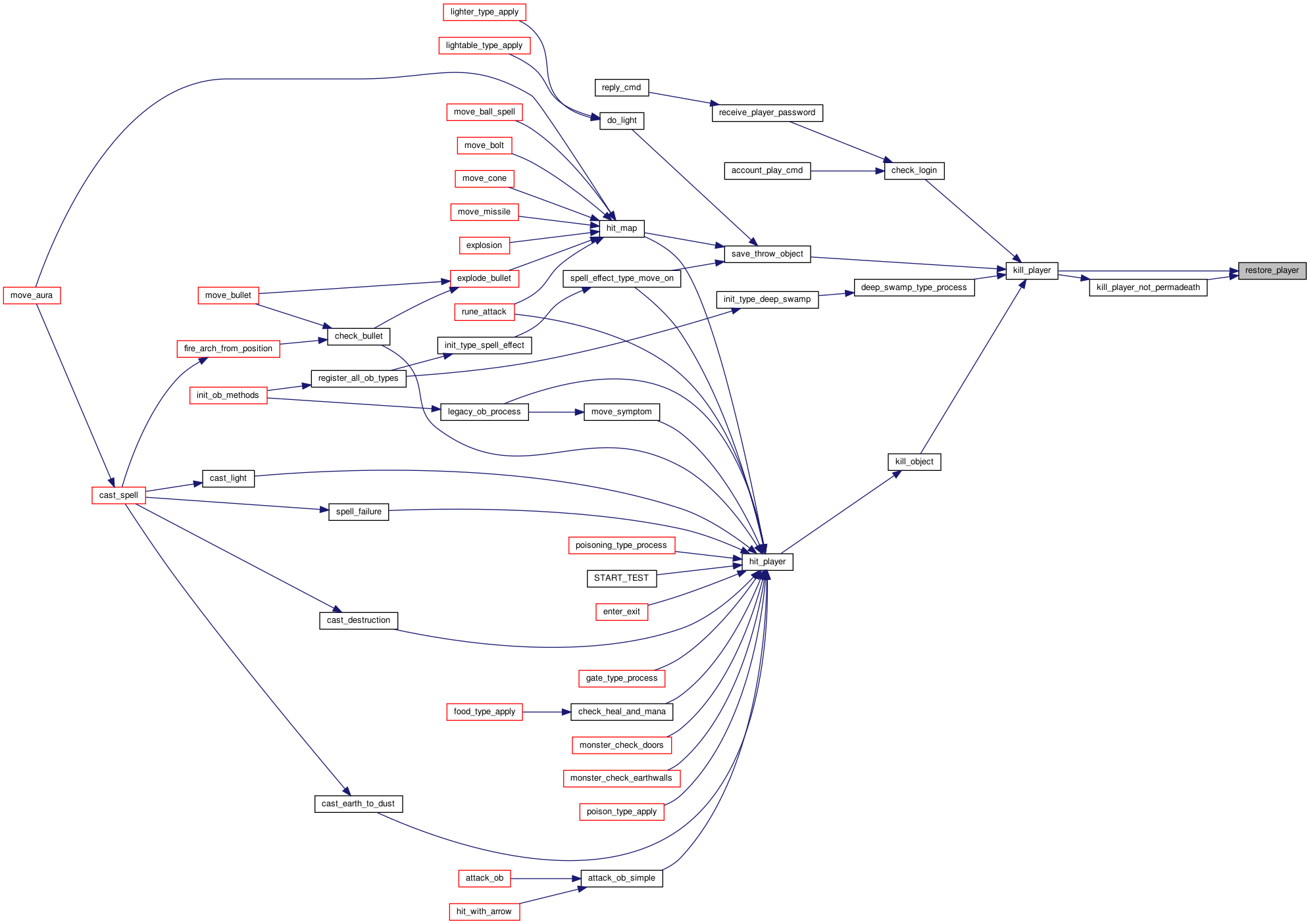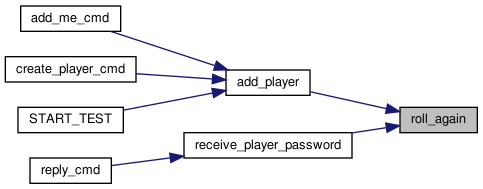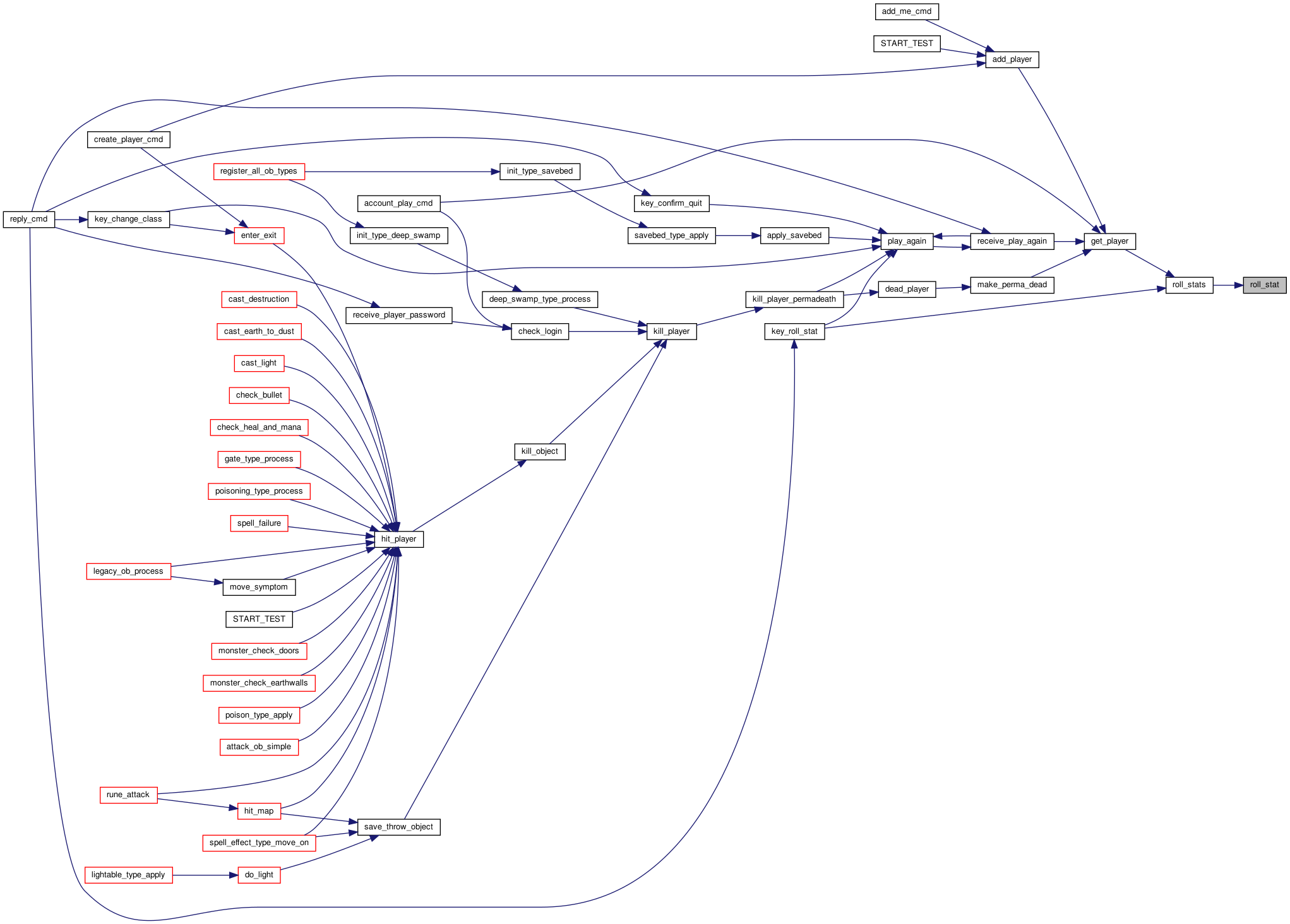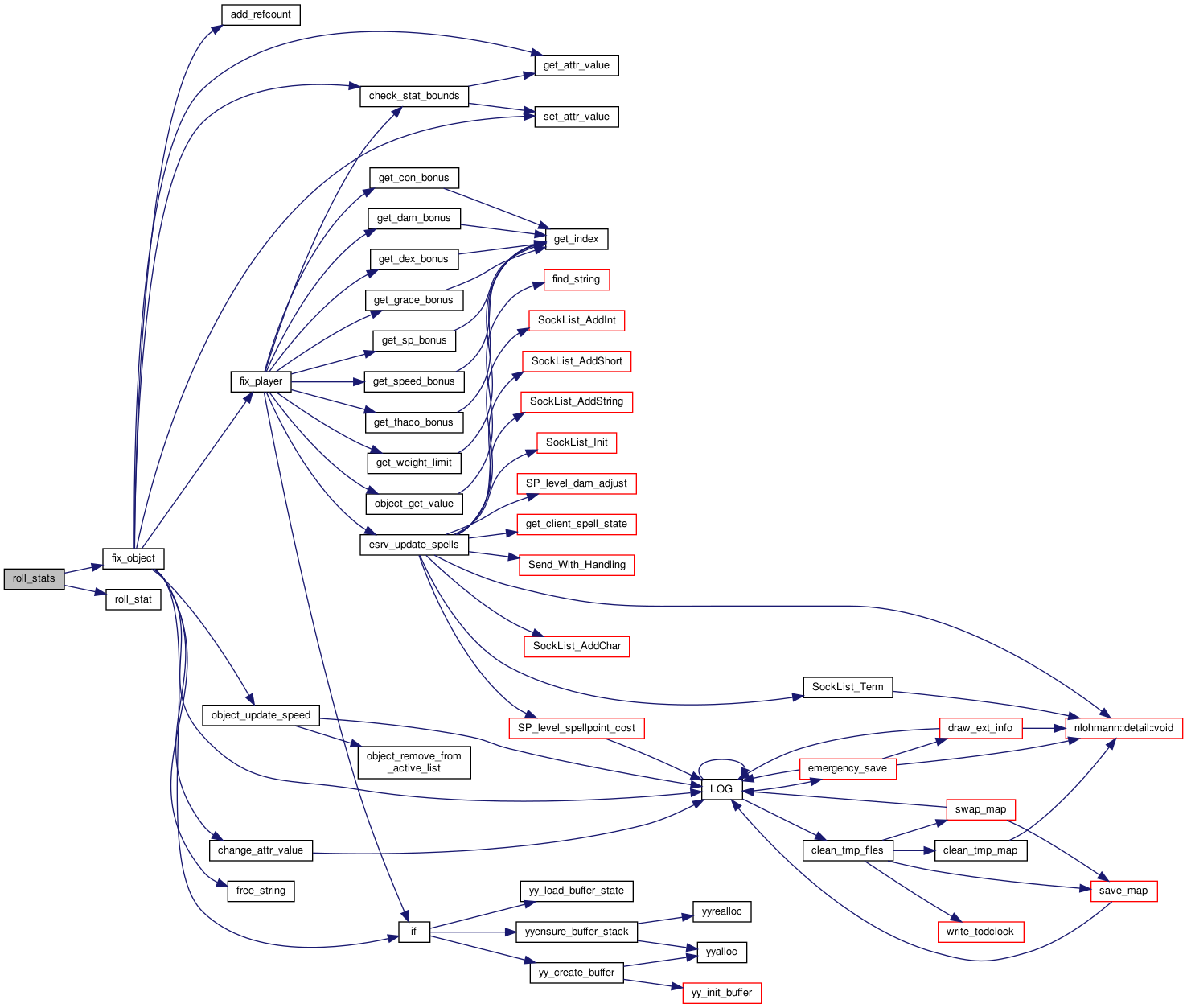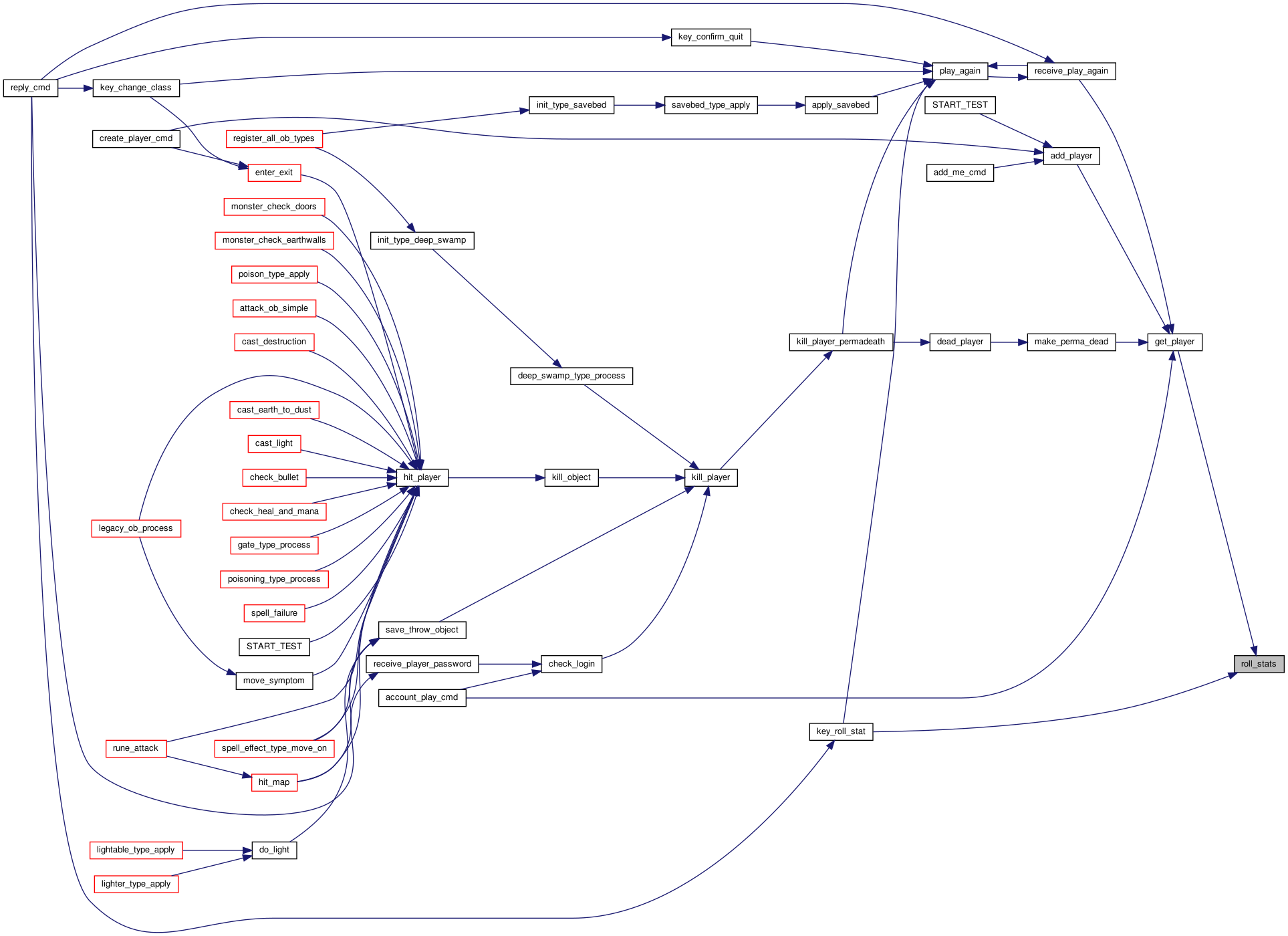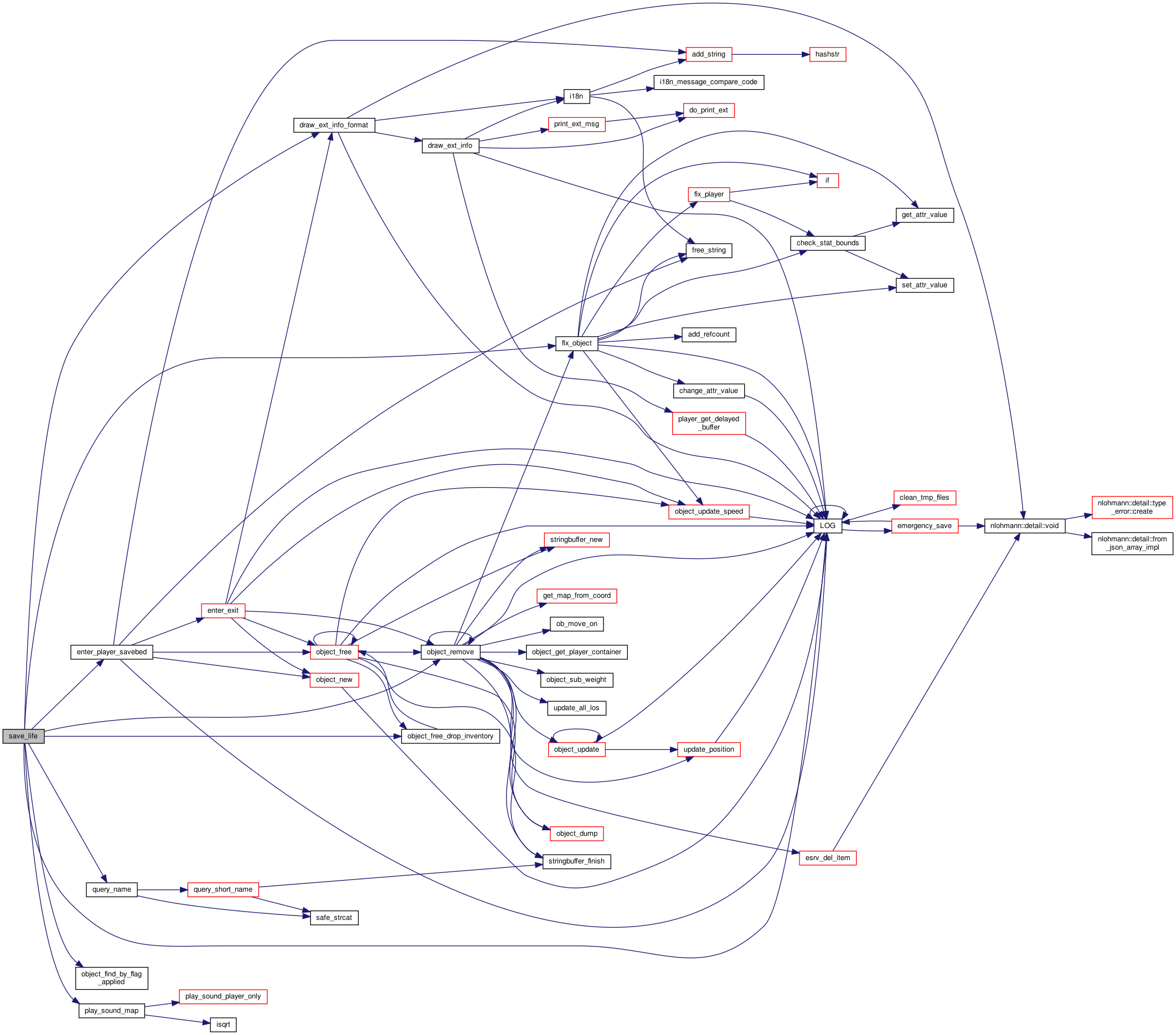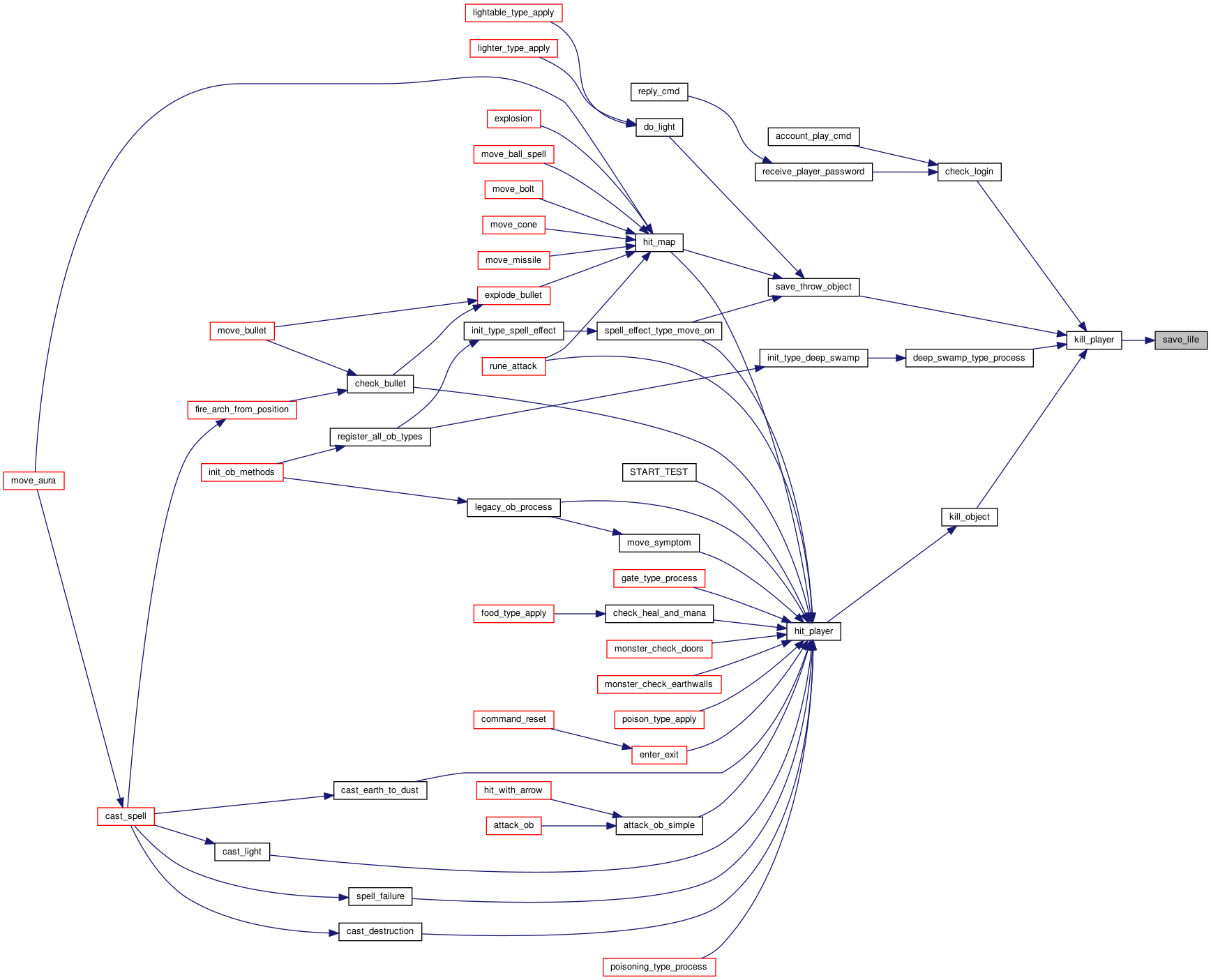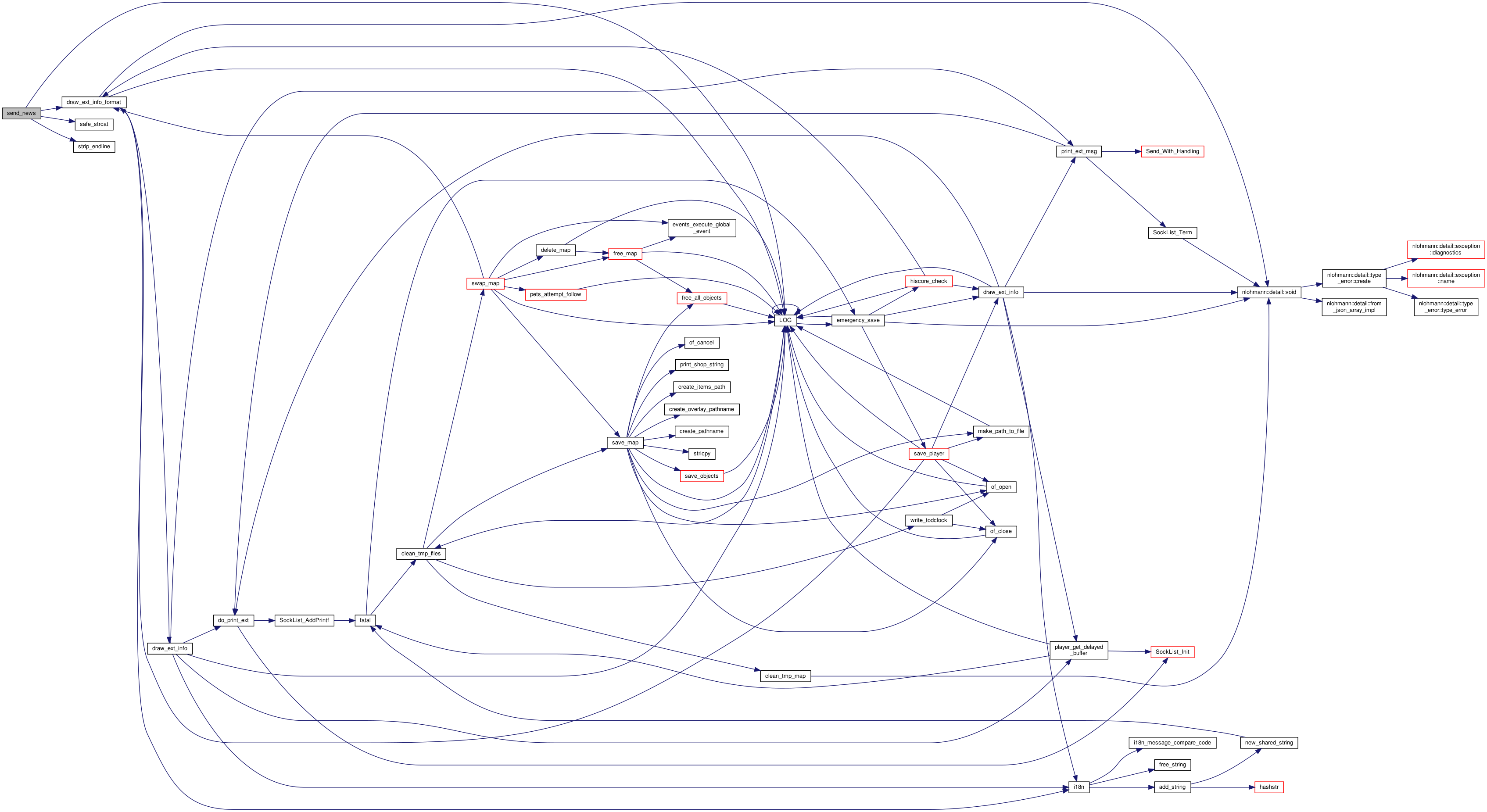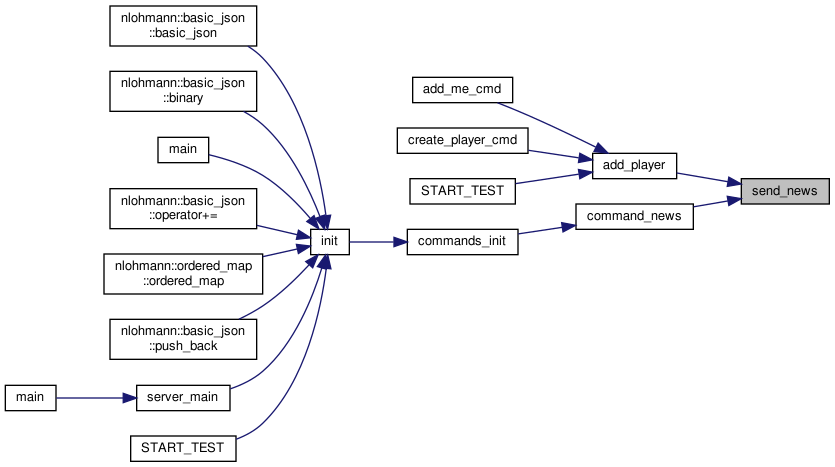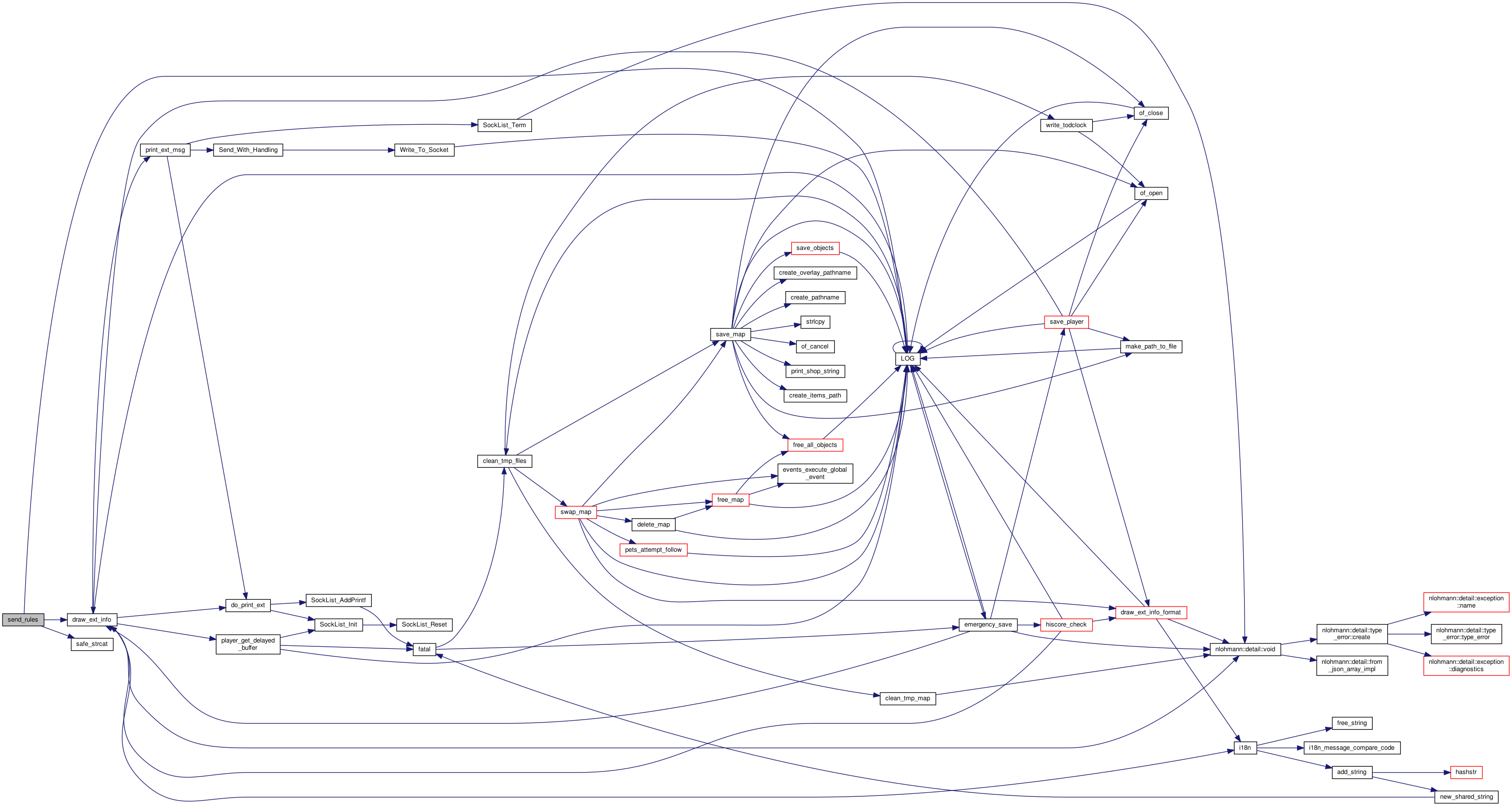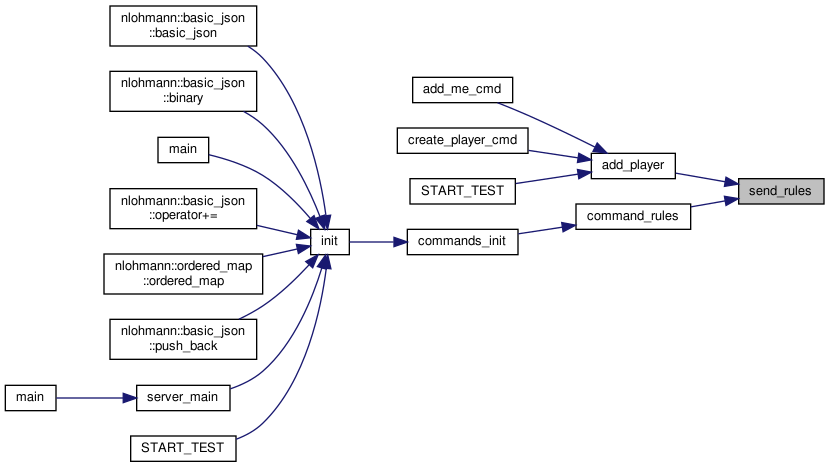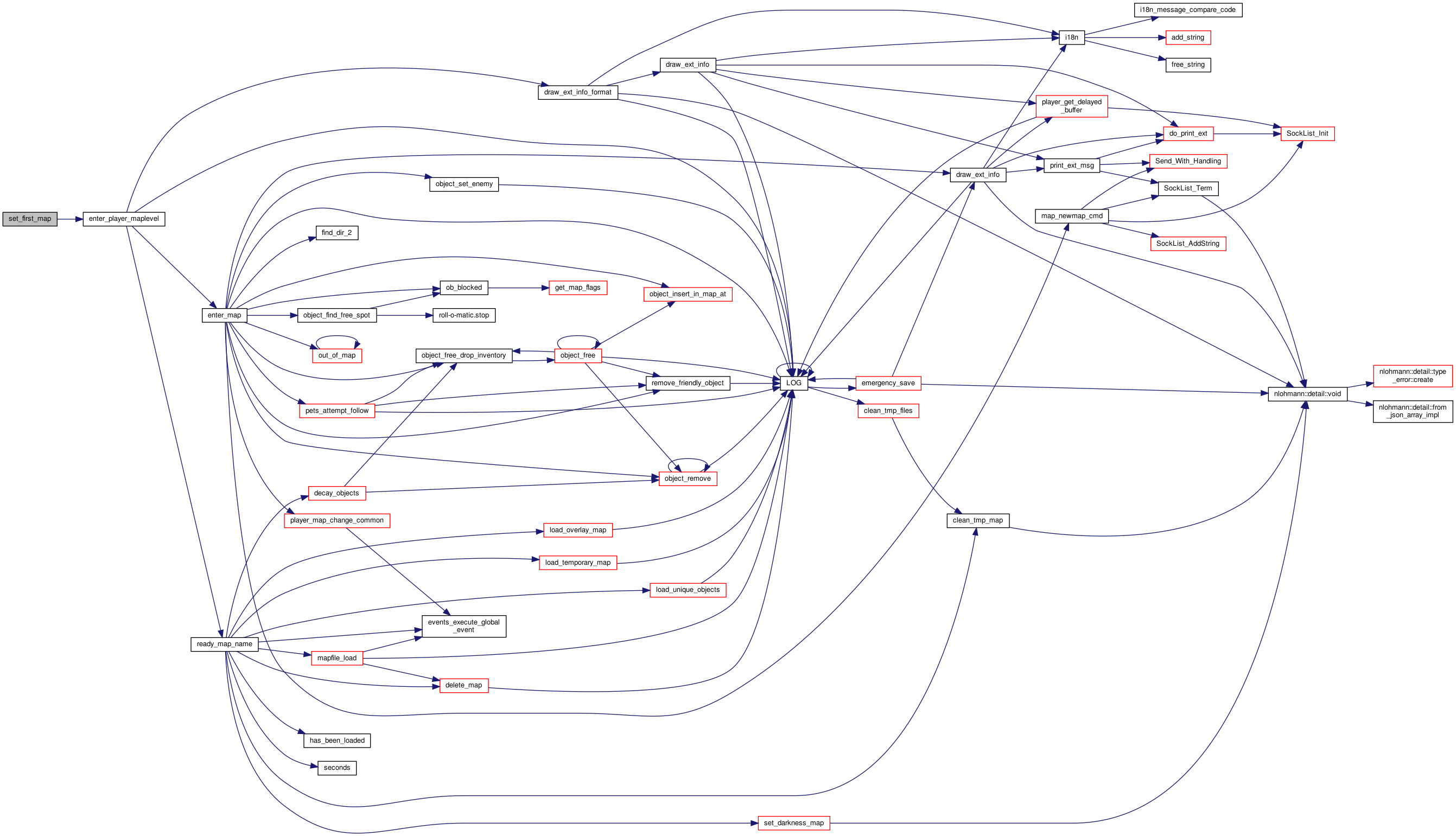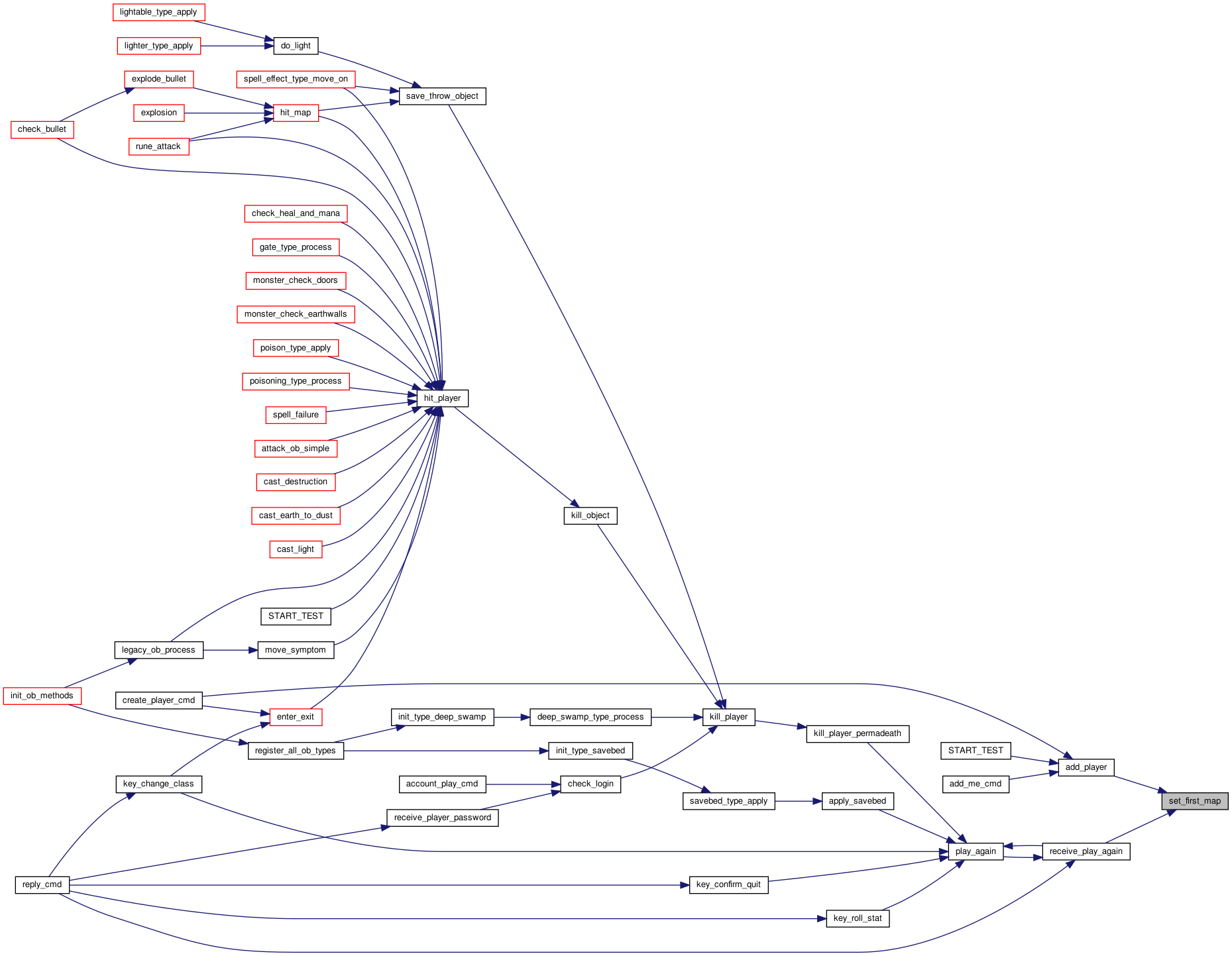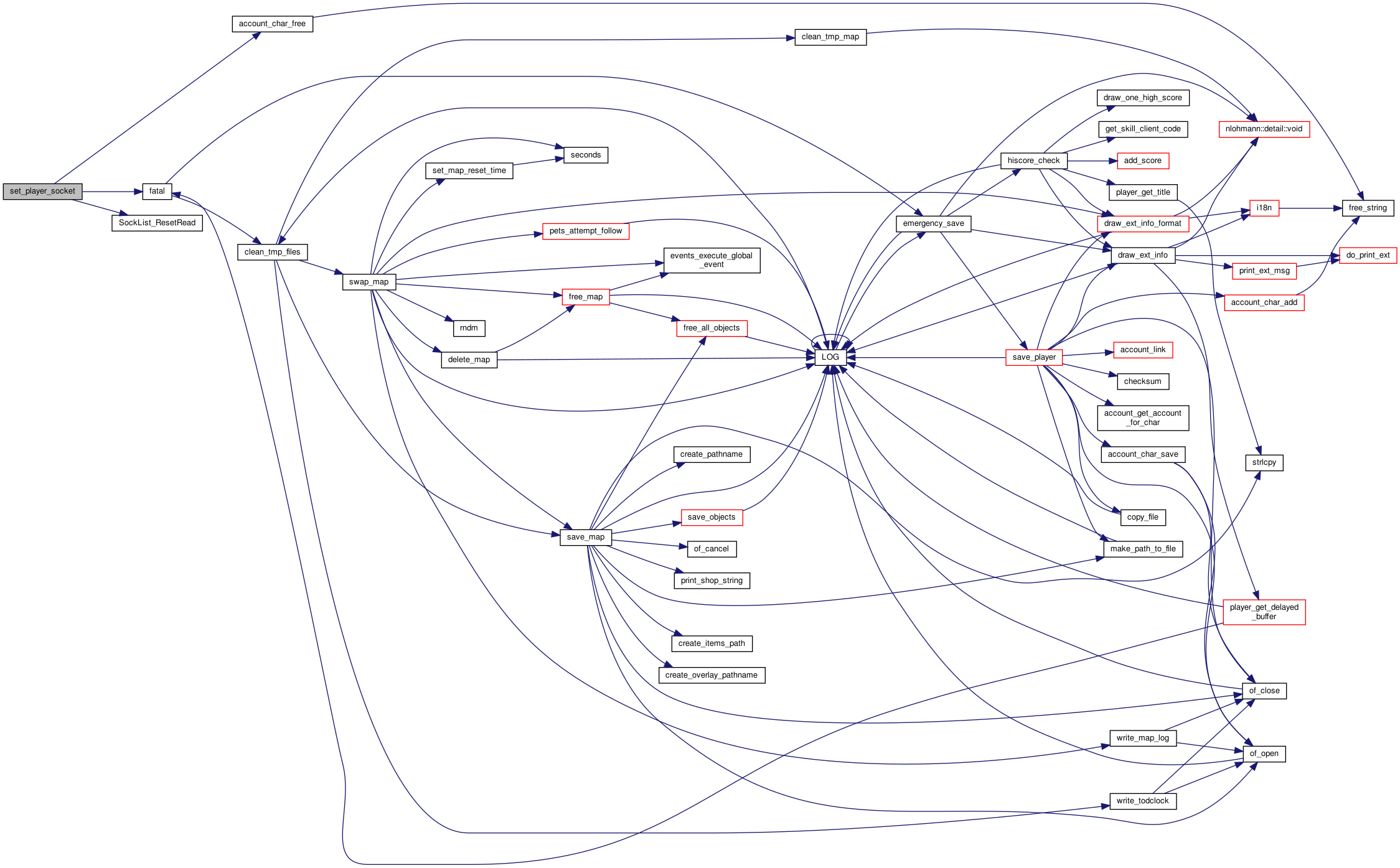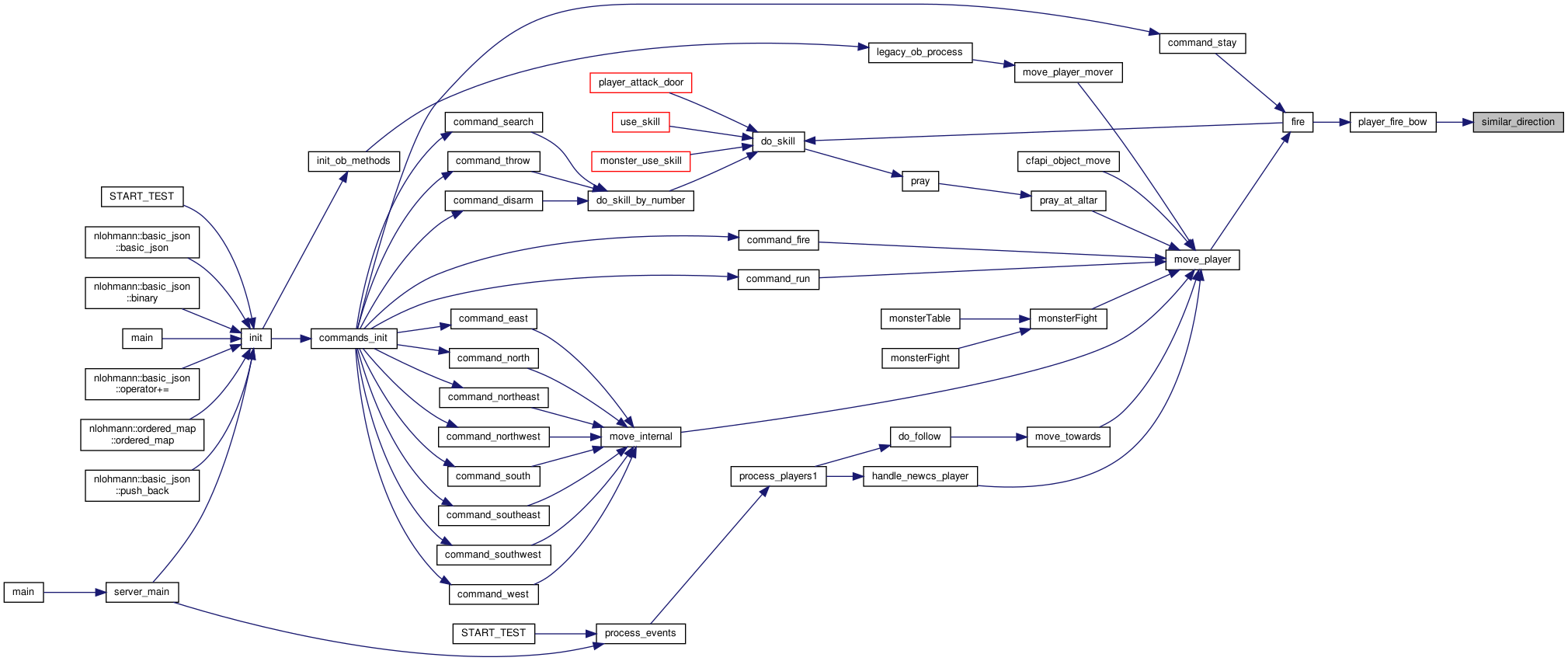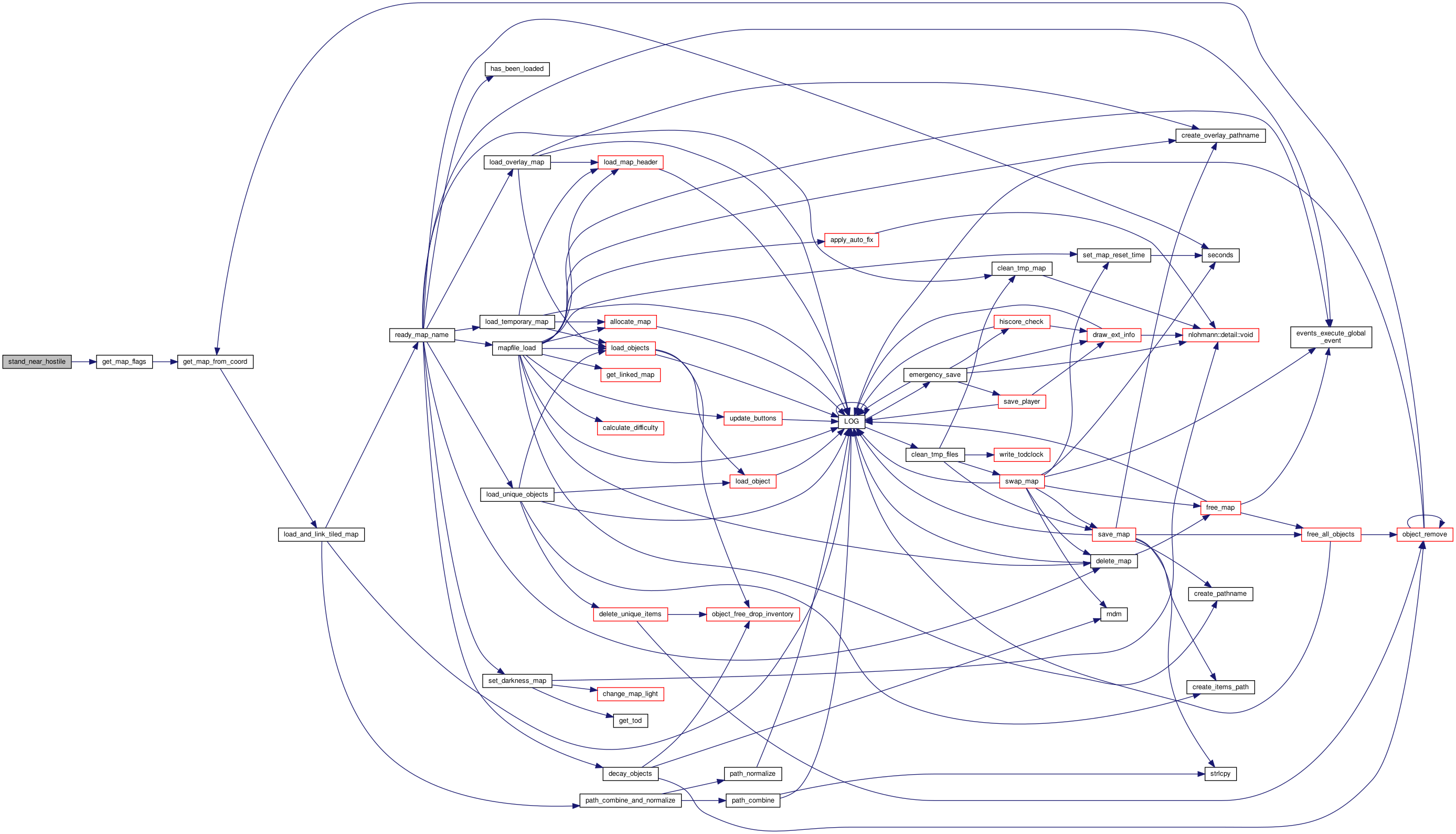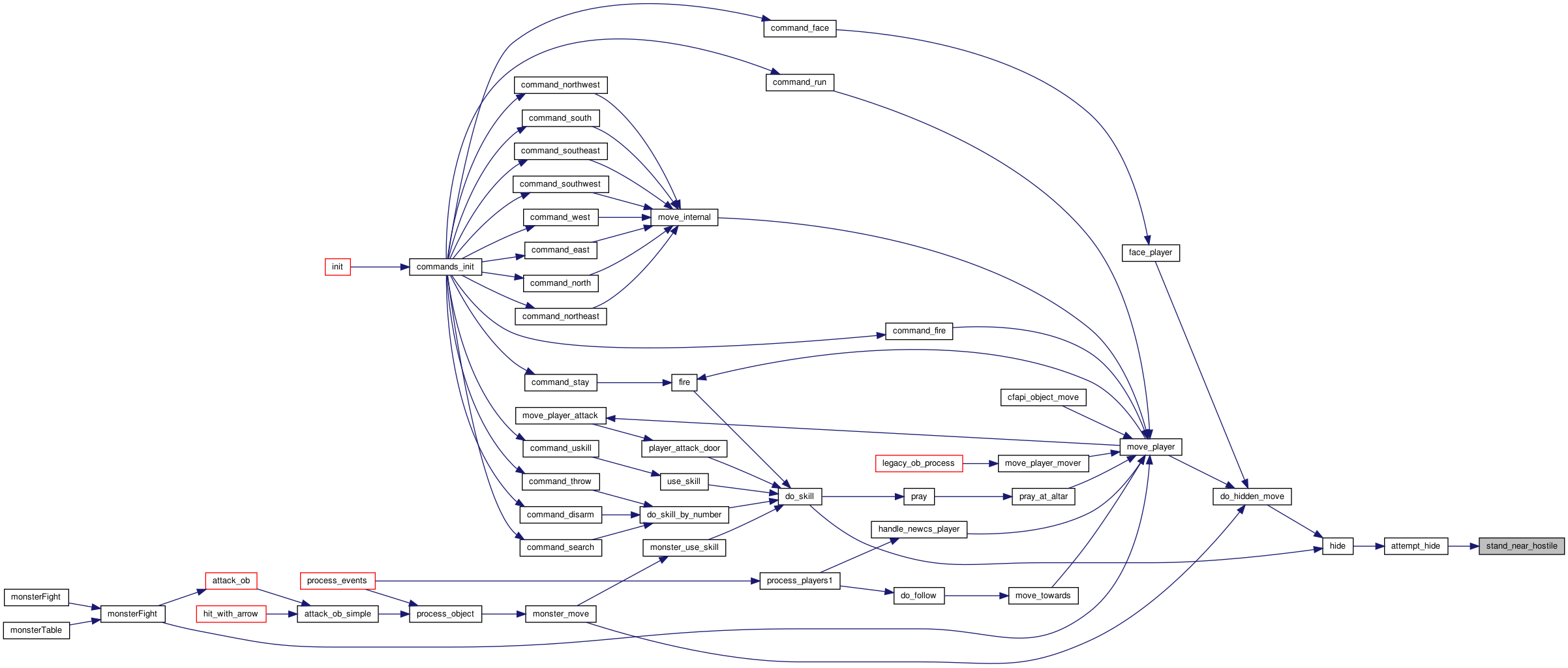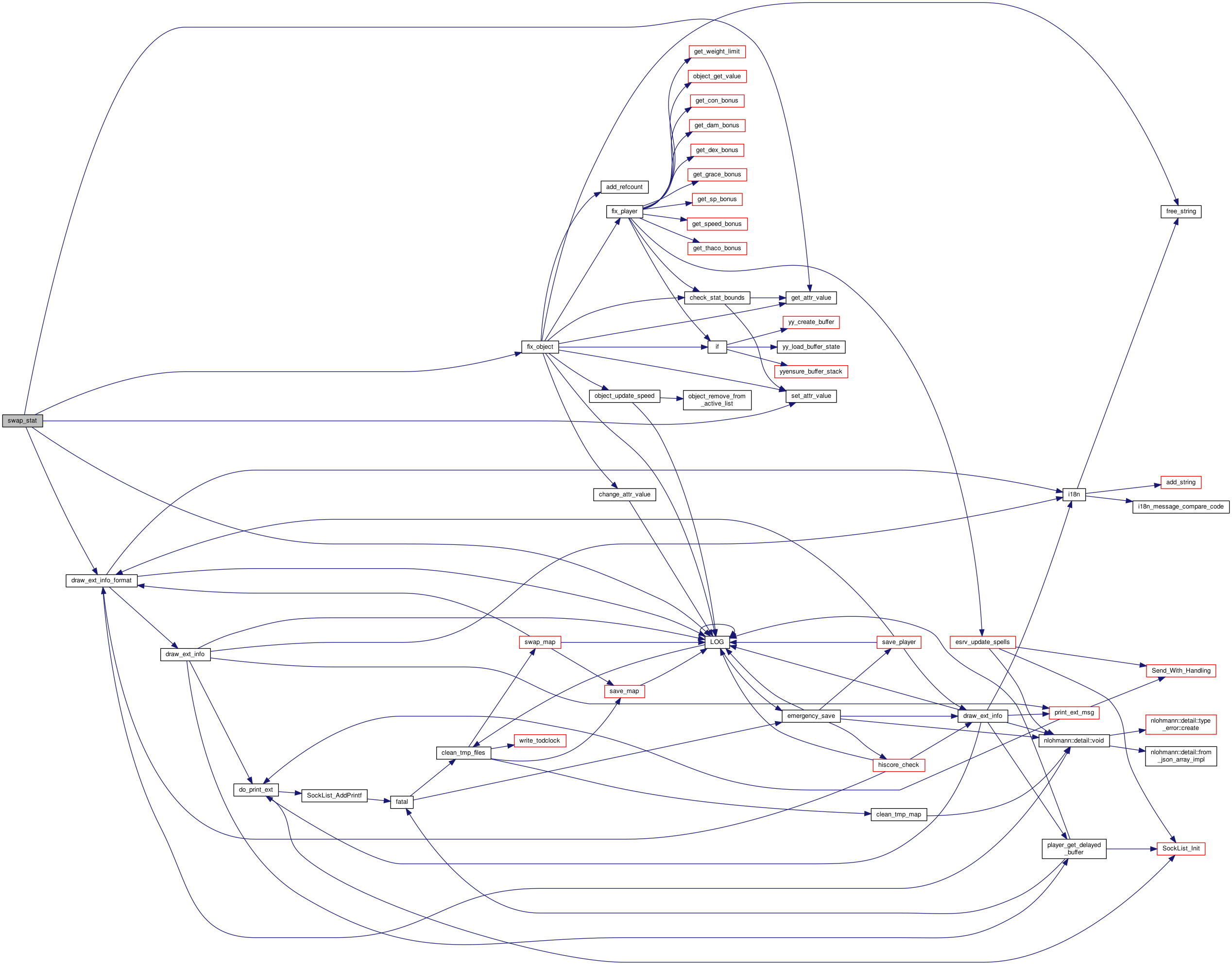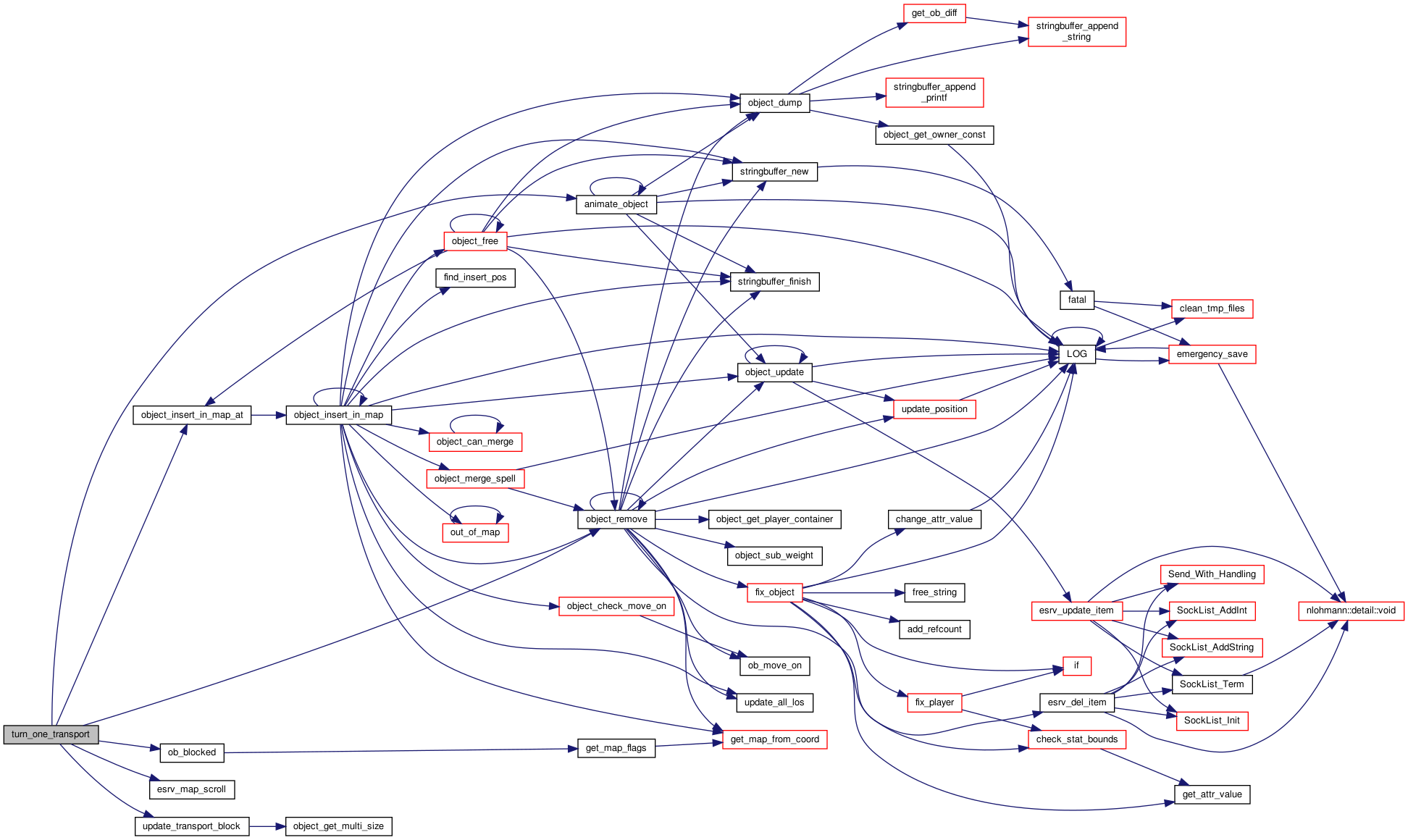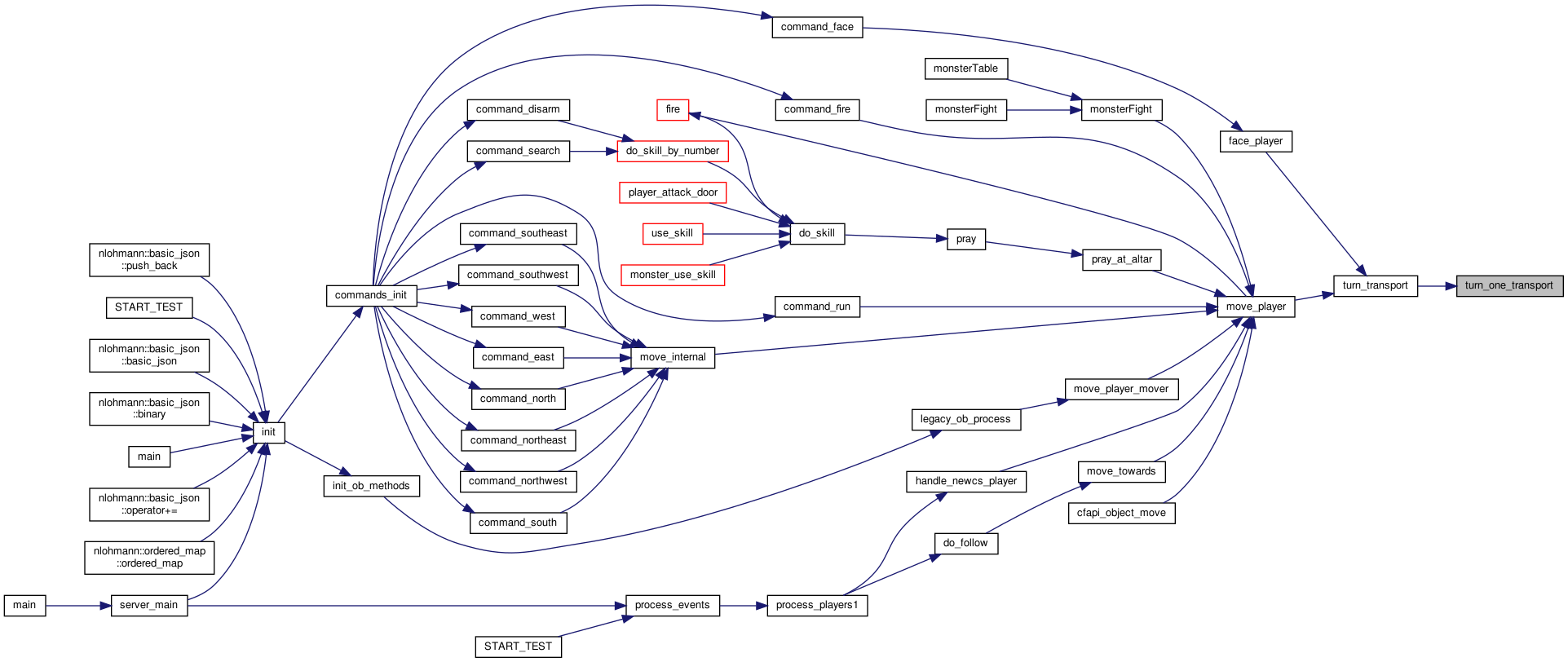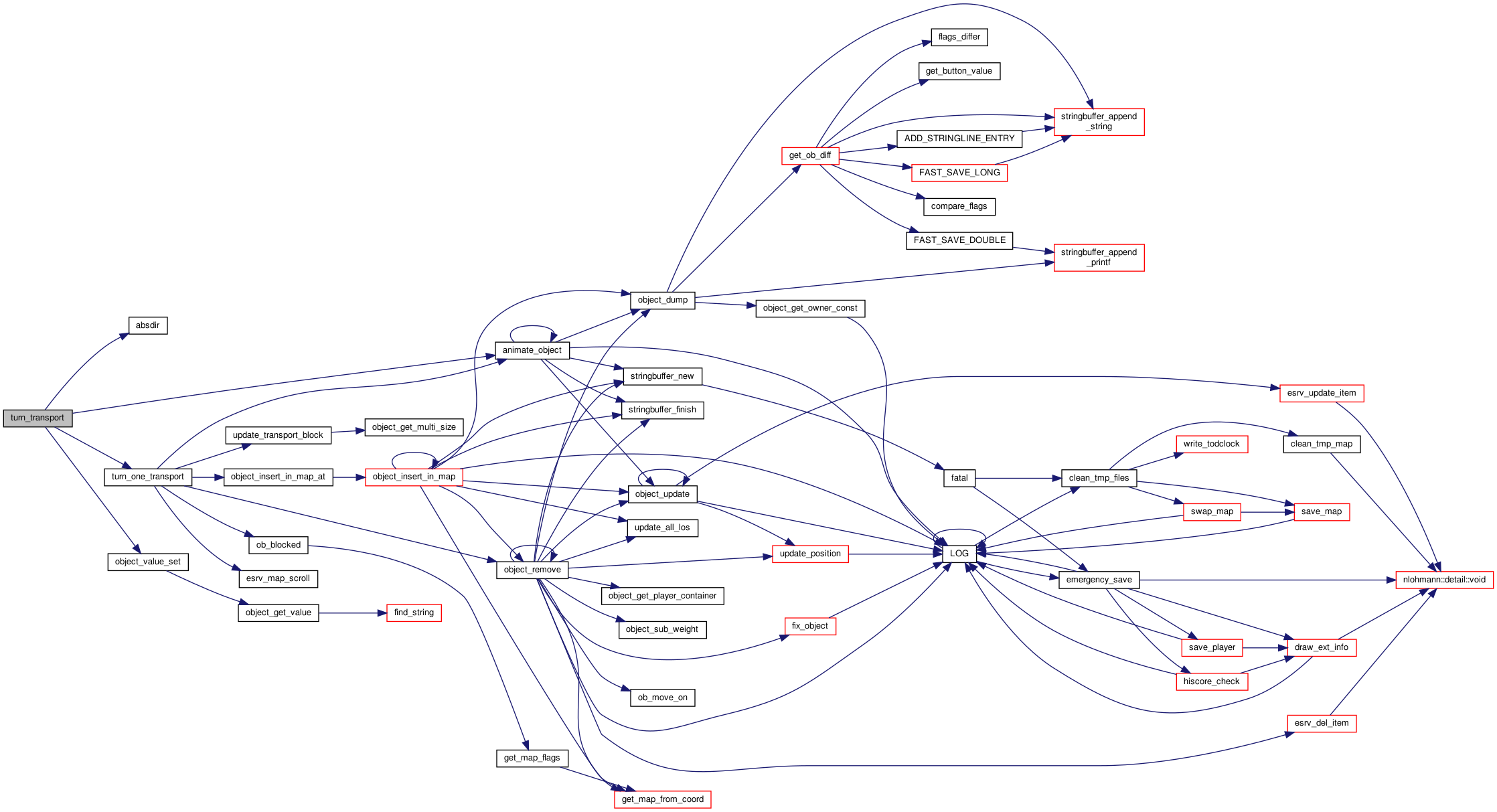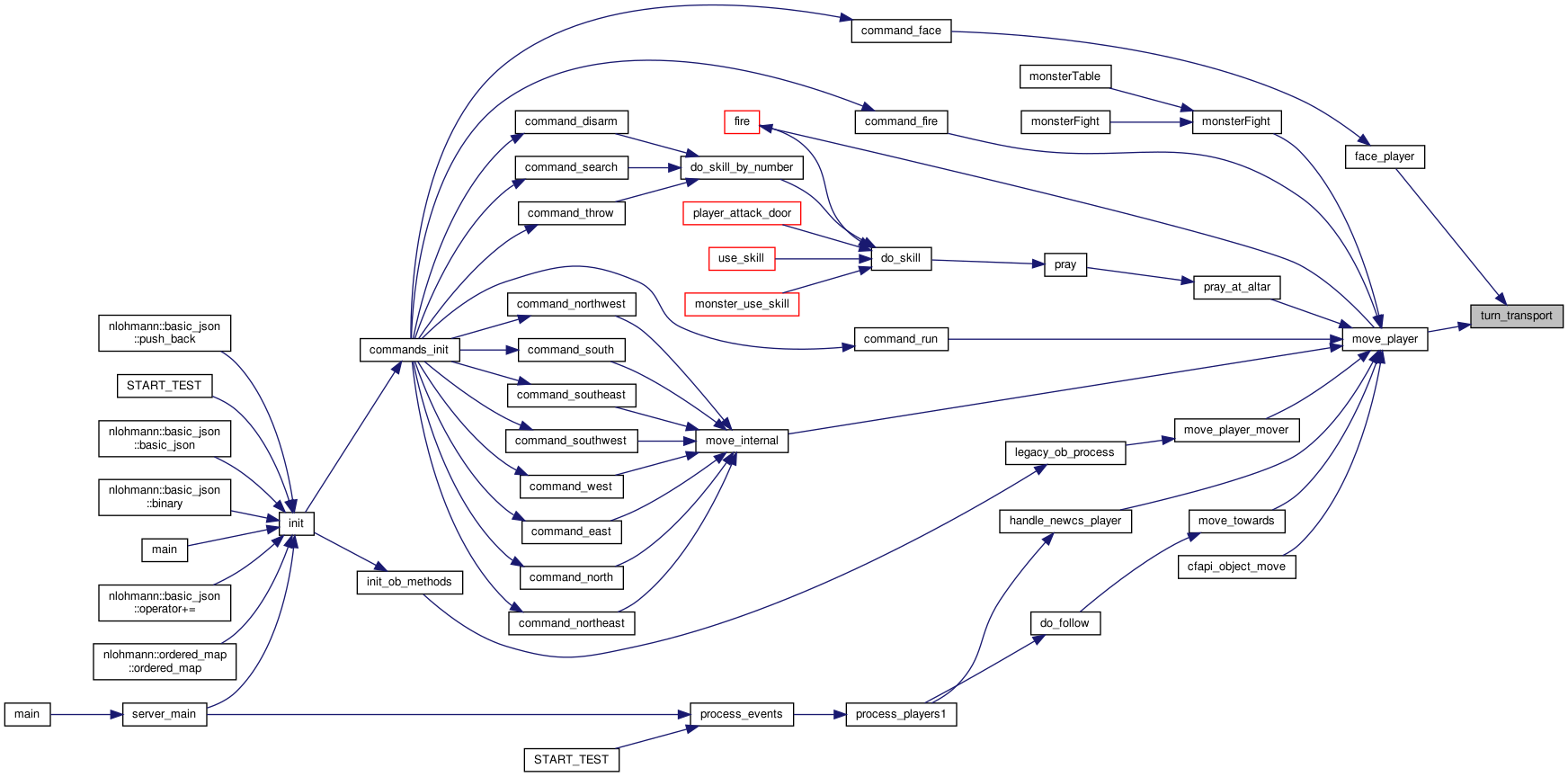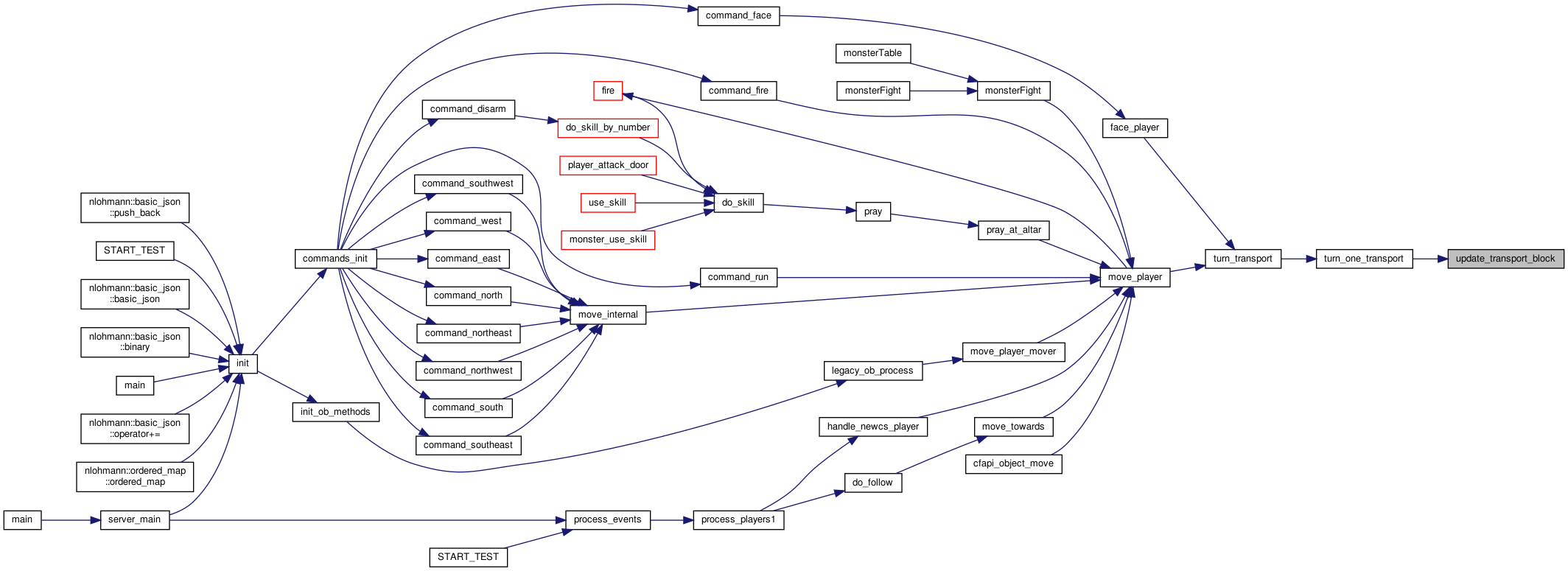#include "global.h"#include <assert.h>#include <ctype.h>#include <stddef.h>#include <stdlib.h>#include <string.h>#include <pwd.h>#include "server.h"#include "living.h"#include "object.h"#include "shared/newclient.h"#include "shop.h"#include "skills.h"#include "sounds.h"#include "spells.h"#include "sproto.h" Include dependency graph for player.c:
Include dependency graph for player.c:Go to the source code of this file.
Macros | |
| #define | DETOUR_AMOUNT 2 |
| #define | MAX_SPACES 50 |
Detailed Description
Player-related functions, including those used during the login and creation phases.
- Todo:
- describe login/creation functions/cycles.
Definition in file player.c.
Macro Definition Documentation
◆ DETOUR_AMOUNT
| #define DETOUR_AMOUNT 2 |
This value basically determines how large a detour a monster will take from the direction path when looking for a path to the player.
The values are in the amount of direction the deviation is.
I believe this can safely go to 2, 3 is questionable, 4 will likely result in a monster paths backtracking.
◆ MAX_SPACES
| #define MAX_SPACES 50 |
This is used to prevent infinite loops. Consider a case where the player is in a chamber (with gate closed), and monsters are outside. with DETOUR_AMOUNT==2, the function will turn each corner, trying to find a path into the chamber. This is a good thing, but since there is no real path, it will just keep circling the chamber for ever (this could be a nice effect for monsters, but not for the function to get stuck in. I think for the monsters, if max is reached and we return the first direction the creature could move would result in the circling behaviour. Unfortunately, this function is also used to determined if the creature should cast a spell, so returning a direction in that case is probably not a good thing.
Function Documentation
◆ action_makes_visible()
|
static |
We call this when there is a possibility for our action disturbing our hiding place or invisibility spell. Artefact invisibility is not effected by this. If we aren't invisible to begin with, we return 0.
This routine works for both players and monsters.
- Parameters
-
op object to check.
- Returns
- 1 if op isn't invisible anymore, 0 else.
Definition at line 4166 of file player.c.
References draw_ext_info_format(), FLAG_ALIVE, FLAG_MAKE_INVIS, MSG_SUBTYPE_NONE, MSG_TYPE_MISC, NDI_UNIQUE, give::op, and QUERY_FLAG.
Referenced by fire(), move_player_attack(), and player_attack_door().
 Here is the call graph for this function:
Here is the call graph for this function: Here is the caller graph for this function:
Here is the caller graph for this function:◆ add_player()
| player* add_player | ( | socket_struct * | ns, |
| int | flags | ||
| ) |
Tries to add player on the connection passwd in ns.
Player object is created and put on the first map, rules/news/motd are sent.
- Parameters
-
ns connection. flags flag values are define in player.h: ADD_PLAYER_NEW - If set, go right to new character creation - used in case of new account code. We don't display motd and other bits in this case either. ADD_PLAYER_NO_MAP - Do not set up map information - used in character login method >2 where we do not use the same starting map.
- Returns
- player returns pointer to newly created player structure.
Definition at line 463 of file player.c.
References add_friendly_object(), ADD_PLAYER_NEW, ADD_PLAYER_NO_MAP, ADD_PLAYER_NO_STATS_ROLL, CLEAR_FLAG, display_motd(), FLAG_FRIENDLY, flags, get_name(), get_player(), Ns_Avail, pl::ob, player_set_state(), roll_again(), send_news(), send_rules(), set_first_map(), set_player_socket(), ST_ROLL_STAT, and socket_struct::status.
Referenced by add_me_cmd(), create_player_cmd(), and START_TEST().
 Here is the call graph for this function:
Here is the call graph for this function: Here is the caller graph for this function:
Here is the caller graph for this function:◆ apply_race_and_class()
This is somewhat like key_change_class() above, except we know the race to change to, but we still basically need to do the same work (apply bonuses, update archetype, etc.)
- Parameters
-
op Player object race race to use - caller should do sanity checking that this is a valid race. opclass class to use - like race, caller should do sanity checking. stats If set, use these stats for the character, do not apply new ones. Note: It is required that the caller only use valid stat values (generated by check_race_and_class() for example), as this function will not do checking on the stats.
- Returns
- 0 on success, non zero on failure (may be extended with unique error codes). It is the responsibility of the caller to notify the client of this failure.
Definition at line 1466 of file player.c.
References AC_PLAYER_STAT_NO_CHANGE, add_statbonus(), add_string(), allowed_class(), apply_changes_to_player(), buf, CLEAR_FLAG, archt::clone, create_treasure(), esrv_add_spells(), esrv_new_player(), esrv_send_inventory(), esrv_update_item(), EVENT_BORN, EVENT_LOGIN, events_execute_global_event(), find_treasurelist(), fix_object(), FLAG_WIZ, free_string(), get_attr_value(), give_initial_items(), commongive::inv, link_player_skills(), Settings::localdir, make_path_to_file(), MAX_BUF, give::name, NUM_STATS, object_copy(), object_free(), object_remove(), object_set_msg(), object_update(), give::op, Settings::playerdir, pticks, SET_ANIMATION, set_attr_value(), settings, strlcpy(), UP_OBJ_FACE, and UPD_FACE.
Referenced by create_player_cmd(), and START_TEST().
 Here is the call graph for this function:
Here is the call graph for this function: Here is the caller graph for this function:
Here is the caller graph for this function:◆ cast_dust()
Handles op throwing objects of type 'DUST'. This is much simpler in the new spell code - we basically just treat this as any other spell casting object.
- Parameters
-
op object throwing. throw_ob what to throw. dir direction to throw into.
Definition at line 3891 of file player.c.
References cast_spell(), draw_ext_info_format(), find_skill_by_name(), FLAG_REMOVED, obj::inv, llevError, LOG(), MSG_TYPE_APPLY, MSG_TYPE_APPLY_SUCCESS, obj::name, NDI_UNIQUE, object_free_drop_inventory(), object_remove(), give::op, PLAYER, POTION, QUERY_FLAG, obj::skill, and obj::type.
Referenced by do_throw().
 Here is the call graph for this function:
Here is the call graph for this function: Here is the caller graph for this function:
Here is the caller graph for this function:◆ check_pick()
| int check_pick | ( | object * | op | ) |
Sees if there is stuff to be picked up/picks up stuff, for players only.
- Parameters
-
op player to check for.
- Return values
-
1 player should keep on moving. 0 player should stop.
Definition at line 1704 of file player.c.
References draw_ext_info(), draw_ext_info_format(), FLAG_KNOWN_CURSED, FLAG_KNOWN_MAGICAL, FLAG_UNPAID, FOR_BELOW_FINISH, FOR_BELOW_PREPARE, is_valid_types_gen::found, GEM, m, MAX, MONEY, MOVE_FLYING, MSG_TYPE_COMMAND, MSG_TYPE_COMMAND_DEBUG, MSG_TYPE_COMMAND_SUCCESS, NDI_UNIQUE, object_can_pick(), object_matches_pickup_mode(), object_matches_string(), object_was_destroyed, give::op, pick_up(), price_base(), PU_ARMOUR, PU_ARROW, PU_BOOTS, PU_BOW, PU_CLOAK, PU_CONTAINER, PU_CURSED, PU_DEBUG, PU_DRINK, PU_FLESH, PU_FOOD, PU_GLOVES, PU_HELMET, PU_INHIBIT, PU_JEWELS, PU_KEY, PU_MAGIC_DEVICE, PU_MAGICAL, PU_MELEEWEAPON, PU_MISSILEWEAPON, PU_NEWMODE, PU_NOT_CURSED, PU_NOTHING, PU_POTION, PU_RATIO, PU_READABLES, PU_SHIELD, PU_SKILLSCROLL, PU_SPELLBOOK, PU_STOP, PU_VALUABLES, QUERY_FLAG, Settings::search_items, settings, roll-o-matic::stop(), Ice::tmp, and TRUE.
Referenced by move_player(), and stop_jump().
 Here is the call graph for this function:
Here is the call graph for this function: Here is the caller graph for this function:
Here is the caller graph for this function:◆ check_race_and_class()
This checks to see if the race and class are legal. Legal in this contexts means that after apply the race/class stat modifiers, the race is still in legal range.
- Parameters
-
stats The statistics to modify - this data is modified, so the caller can use it on the next update. race The race to try and apply. It can be NULL, in which case no race will be applied. opclass The class to apply. It can be NULL, in which case no class will be applied.
- Returns
- 0 on success, 1 on failure. Note that no distinction is made on whether the failure is from race or class, as it is the final statistics which are important. For example, if race is -2 Str, and class is +2 Str, if the starting strength is 1, that is still legal (as final result is 1)
Definition at line 1416 of file player.c.
References archt::clone, get_attr_value(), Settings::max_stat, MIN_STAT, NUM_STATS, set_attr_value(), settings, and obj::stats.
Referenced by create_player_cmd().
 Here is the call graph for this function:
Here is the call graph for this function: Here is the caller graph for this function:
Here is the caller graph for this function:◆ confirm_password()
| void confirm_password | ( | object * | op | ) |
Ask the player to confirm her password during creation.
- Parameters
-
op player.
Definition at line 998 of file player.c.
References CS_QUERY_HIDEINPUT, i18n(), give::op, player_set_state(), send_query(), and ST_CONFIRM_PASSWORD.
Referenced by check_login().
 Here is the call graph for this function:
Here is the call graph for this function: Here is the caller graph for this function:
Here is the caller graph for this function:◆ display_motd()
| void display_motd | ( | const object * | op | ) |
Sends the message of the day to the player.
- Parameters
-
op player to send to.
Definition at line 136 of file player.c.
References buf, Settings::confdir, draw_ext_info(), HUGE_BUF, MAX_BUF, Settings::motd, MSG_SUBTYPE_NONE, MSG_TYPE_MOTD, NDI_GREEN, NDI_UNIQUE, give::op, safe_strcat(), and settings.
Referenced by add_player(), command_motd(), and receive_player_password().
 Here is the call graph for this function:
Here is the call graph for this function: Here is the caller graph for this function:
Here is the caller graph for this function:◆ do_hidden_move()
| void do_hidden_move | ( | object * | op | ) |
For hidden creatures - a chance of becoming 'unhidden' every time they move - as we subtract off 'invisibility' AND, for players, if they move into a ridiculously unhideable spot (surrounded by clear terrain in broad daylight). -b.t.
- Parameters
-
op object moving.
Definition at line 4005 of file player.c.
References calc_skill_exp(), change_exp(), draw_ext_info(), hide(), hideability(), obj::level, make_visible(), MSG_TYPE_SKILL, MSG_TYPE_SKILL_FAILURE, NDI_UNIQUE, object_find_by_type_subtype(), give::op, PLAYER, PREFER_LOW, random_roll(), SK_HIDING, SKILL, and obj::skill.
Referenced by face_player(), monster_move(), and move_player().
 Here is the call graph for this function:
Here is the call graph for this function: Here is the caller graph for this function:
Here is the caller graph for this function:◆ do_some_living()
| void do_some_living | ( | object * | op | ) |
Regenerate hp/sp/gr, decreases food. This only works for players. Will grab food if needed, or kill player.
- Parameters
-
op player to regenerate for.
Definition at line 3247 of file player.c.
References give::op, and ST_PLAYING.
Referenced by command_possess(), monsterFight(), and process_players1().
 Here is the caller graph for this function:
Here is the caller graph for this function:◆ dragon_ability_gain()
| void dragon_ability_gain | ( | object * | who, |
| int | atnr, | ||
| int | level | ||
| ) |
When a dragon-player gains a new stage of evolution, he gets some treasure.
- Parameters
-
who the dragon player. atnr the attack-number of the ability focus. level ability level.
Definition at line 4263 of file player.c.
References animate_object(), arch_to_object(), AT_PHYSICAL, ATNR_COLD, ATNR_ELECTRICITY, ATNR_FIRE, ATNR_POISON, obj::attacktype, buf, check_spell_known(), archt::clone, do_learn_spell(), draw_ext_info(), draw_ext_info_format(), esrv_send_item(), obj::face, find_skill_by_name(), find_treasurelist(), FLAG_SEE_IN_DARK, FLAG_STEALTH, FLAG_XRAYS, FORCE, HUGE_BUF, treasurestruct::item, say::item, treasureliststruct::items, llevDebug, LOG(), treasurestruct::magic, MAX_BUF, MSG_TYPE_ATTRIBUTE, MSG_TYPE_ATTRIBUTE_RACE, MSG_TYPE_ITEM, MSG_TYPE_ITEM_ADD, give::name, NDI_BLUE, NDI_UNIQUE, treasurestruct::next, NRSPELLPATHS, object_find_by_arch_name(), object_insert_in_ob(), obj::path_attuned, PLAYER, QUERY_FLAG, query_short_name(), SET_FLAG, SK_CLAWING, SKILL_TOOL, SPELL, SPELLBOOK, spellpathnames, Ice::tmp, and autojail::who.
 Here is the call graph for this function:
Here is the call graph for this function:◆ face_player()
| int face_player | ( | object * | op, |
| int | dir | ||
| ) |
Face player in the given direction.
- Parameters
-
op player. dir direction to face
- Returns
- 0.
Definition at line 3002 of file player.c.
References animate_object(), obj::contr, do_hidden_move(), FLAG_CONFUSED, get_randomized_dir(), llevError, LOG(), MAP_IN_MEMORY, give::op, QUERY_FLAG, and turn_transport().
Referenced by command_face().
 Here is the call graph for this function:
Here is the call graph for this function: Here is the caller graph for this function:
Here is the caller graph for this function:◆ find_arrow()
Find an arrow in the inventory and after that in the right type container (quiver). Pointer to the found object is returned.
- Parameters
-
op object to find arrow for. type what arrow race to search for.
- Returns
- suitable arrow, NULL if none found.
Definition at line 1909 of file player.c.
References ARROW, CONTAINER, FLAG_APPLIED, FOR_INV_FINISH, FOR_INV_PREPARE, commongive::inv, give::op, QUERY_FLAG, Ice::tmp, and is_valid_types_gen::type.
Referenced by find_better_arrow(), fire_bow(), and pick_arrow_target().
 Here is the caller graph for this function:
Here is the caller graph for this function:◆ find_better_arrow()
|
static |
Similar to find_arrow(), but looks for (roughly) the best arrow to use against the target. A full test is not performed, simply a basic test of resistances. The archer is making a quick guess at what he sees down the hall. Failing that it does it's best to pick the highest plus arrow.
- Parameters
-
op who to search arrows for. target what op is aiming at. type arrow race to search for. [out] better will contain the arrow's value if not NULL.
- Returns
- suitable arrow, NULL if none found.
Definition at line 1941 of file player.c.
References obj::arch, ARROW, AT_DEATH, archt::clone, CONTAINER, find_arrow(), FLAG_APPLIED, FOR_INV_FINISH, FOR_INV_PREPARE, NROFATTACKS, give::op, QUERY_FLAG, obj::race, obj::resist, Ice::tmp, and is_valid_types_gen::type.
Referenced by pick_arrow_target().
 Here is the call graph for this function:
Here is the call graph for this function: Here is the caller graph for this function:
Here is the caller graph for this function:◆ find_key()
We try to find a key for the door as passed. If we find a key and player can use it (based on the usekeys settings), we return the key, otherwise NULL.
This function merges both normal and locked door, since the logic for both is the same - just the specific key is different.
This function can be called recursively to search containers.
- Parameters
-
pl player. container inventory to searched for keys. door door we are trying to match against.
- Returns
- key to use, NULL if none found or usekeys mode doesn't let reach the key.
- Todo:
- document use key modes.
Definition at line 2445 of file player.c.
References CONTAINER, DOOR, draw_ext_info_format(), FLAG_APPLIED, FLAG_UNPAID, FOR_INV_FINISH, FOR_INV_PREPARE, obj::inv, castle_read::key, KEY, key_inventory, keyrings, MAX_BUF, MSG_TYPE_ITEM, MSG_TYPE_ITEM_INFO, NDI_BROWN, NDI_UNIQUE, object_find_by_type_and_slaying(), object_find_by_type_without_flags(), QUERY_FLAG, query_name(), obj::race, obj::slaying, SPECIAL_KEY, Ice::tmp, obj::type, and pl::usekeys.
Referenced by apply_container(), and player_attack_door().
 Here is the call graph for this function:
Here is the call graph for this function: Here is the caller graph for this function:
Here is the caller graph for this function:◆ find_player()
| player* find_player | ( | const char * | plname | ) |
Find a player by her full name.
- Parameters
-
plname name to find.
- Returns
- matching player, or NULL if no match.
Definition at line 56 of file player.c.
References find_player_options().
Referenced by command_reply(), and list_players().
 Here is the call graph for this function:
Here is the call graph for this function: Here is the caller graph for this function:
Here is the caller graph for this function:◆ find_player_options()
Find a player.
- Parameters
-
plname name of the player to search for. Can be partial. options combination of FIND_PLAYER_xxx flags. map optional map the player must be on (adjacent maps are ok too).
- Returns
- matching player, NULL if none or more than one.
Definition at line 67 of file player.c.
References obj::contr, FIND_PLAYER_NO_HIDDEN_DM, FIND_PLAYER_PARTIAL_NAME, first_player, FLAG_WIZ, is_valid_types_gen::found, pl::hidden, disinfect::map, obj::map, MAX_BUF, give::name, obj::name, pl::next, pl::ob, options, altar_valkyrie::pl, QUERY_FLAG, and query_name().
Referenced by basic_emote(), find_player(), and find_player_partial_name().
 Here is the call graph for this function:
Here is the call graph for this function: Here is the caller graph for this function:
Here is the caller graph for this function:◆ find_player_partial_name()
| player* find_player_partial_name | ( | const char * | plname | ) |
Find a player by a partial name.
- Parameters
-
plname name to match.
- Returns
- matching player if only one matching, or one perfectly matching, NULL if no match or more than one.
Definition at line 111 of file player.c.
References find_player_options(), and FIND_PLAYER_PARTIAL_NAME.
 Here is the call graph for this function:
Here is the call graph for this function:◆ find_player_socket()
| player* find_player_socket | ( | const socket_struct * | ns | ) |
Return a player for a socket structure.
- Parameters
-
ns socket to search for.
- Returns
- NULL if no player, player else.
Definition at line 120 of file player.c.
References first_player, pl::next, altar_valkyrie::pl, and pl::socket.
Referenced by add_me_cmd(), and set_up_cmd().
 Here is the caller graph for this function:
Here is the caller graph for this function:◆ fire()
| void fire | ( | object * | op, |
| int | dir | ||
| ) |
Received a fire command for the player - go and do it.
- Parameters
-
op player. dir direction to fire into.
Definition at line 2373 of file player.c.
References action_makes_visible(), apply_map_builder(), cast_spell(), do_skill(), draw_ext_info(), fire_misc_object(), make_visible(), MSG_TYPE_COMMAND, MSG_TYPE_COMMAND_ERROR, NDI_UNIQUE, give::op, pets_control_golem(), PLAYER, player_fire_bow(), range_bow, range_builder, range_golem, range_magic, range_misc, range_none, range_skill, and nlohmann::detail::void().
Referenced by command_stay(), and move_player().
 Here is the call graph for this function:
Here is the call graph for this function: Here is the caller graph for this function:
Here is the caller graph for this function:◆ fire_bow()
Creature (monster or player) fires a bow.
- Parameters
-
op object firing the bow. arrow object to fire. dir direction of fire. wc_mod any special modifier to give (used in special player fire modes) sx sy coordinates to fire arrow from - also used in some of the special player fire modes.
- Returns
- 1 if bow was actually fired, 0 otherwise.
- Todo:
- describe player firing modes.
Definition at line 2080 of file player.c.
References add_refcount(), add_string(), obj::anim_suffix, apply_anim_suffix(), AT_PHYSICAL, obj::attacktype, BOW, bow_bestarrow, CLEAR_FLAG, obj::count, liv::dam, obj::direction, draw_ext_info(), draw_ext_info_format(), FABS, find_arrow(), fix_object(), FLAG_NO_STRENGTH, FLAG_READY_BOW, free_string(), get_dam_bonus(), get_dex_bonus(), get_map_flags(), GET_MAP_MOVE_BLOCK, get_thaco_bonus(), liv::grace, liv::hp, if(), obj::level, llevError, LOG(), m, obj::magic, MOVE_FLY_LOW, obj::move_on, obj::move_type, MOVE_WALK, MSG_TYPE_COMMAND, MSG_TYPE_COMMAND_ERROR, obj::name, NDI_UNIQUE, obj::nrof, ob_process(), object_find_by_type(), object_free_drop_inventory(), object_insert_in_map_at(), object_remove(), object_set_owner(), object_split(), object_update_speed(), object_update_turn_face(), object_was_destroyed, give::op, P_OUT_OF_MAP, play_sound_map(), PLAYER, QUERY_FLAG, obj::race, range_bow, obj::skill, obj::slaying, SOUND_TYPE_ITEM, liv::sp, obj::speed, obj::speed_left, obj::spellarg, obj::stats, strdup_local, CFweardisguise::tag, and liv::wc.
Referenced by monster_use_bow(), and player_fire_bow().
 Here is the call graph for this function:
Here is the call graph for this function: Here is the caller graph for this function:
Here is the caller graph for this function:◆ fire_misc_object()
|
static |
Fires a misc (wand/rod/horn) object in 'dir'. Broken apart from 'fire' to keep it more readable.
- Parameters
-
op player firing. dir firing direction.
- Warning
- op must be a player (contr != NULL).
Definition at line 2321 of file player.c.
References cast_spell(), drain_rod_charge(), drain_wand_charge(), draw_ext_info(), draw_ext_info_format(), FLAG_BEEN_APPLIED, say::item, llevError, LOG(), MAX_BUF, MSG_TYPE_COMMAND, MSG_TYPE_COMMAND_ERROR, MSG_TYPE_COMMAND_FAILURE, give::name, NDI_UNIQUE, give::op, play_sound_player_only(), query_base_name(), range_misc, ROD, SET_FLAG, SOUND_TYPE_ITEM, SP_level_spellpoint_cost(), SPELL_HIGHEST, and WAND.
Referenced by fire().
 Here is the call graph for this function:
Here is the call graph for this function: Here is the caller graph for this function:
Here is the caller graph for this function:◆ fix_luck()
| void fix_luck | ( | void | ) |
Fixes luck of players, slowly move it towards 0.
Definition at line 3870 of file player.c.
References change_luck(), obj::contr, first_player, pl::next, pl::ob, altar_valkyrie::pl, and pl::state.
Referenced by do_specials().
 Here is the call graph for this function:
Here is the call graph for this function: Here is the caller graph for this function:
Here is the caller graph for this function:◆ fix_weight()
| void fix_weight | ( | void | ) |
Check recursively the weight of all players, and fix what needs to be fixed. Refresh windows and fix speed if anything was changed.
- Todo:
- is this still useful?
Definition at line 3854 of file player.c.
References obj::carrying, first_player, fix_object(), llevDebug, LOG(), obj::name, pl::next, pl::ob, object_sum_weight(), and altar_valkyrie::pl.
Referenced by do_specials().
 Here is the call graph for this function:
Here is the call graph for this function: Here is the caller graph for this function:
Here is the caller graph for this function:◆ flee_player()
|
static |
The player is scared, and should flee. If she can't, then she isn't scared anymore.
- Parameters
-
op player.
Definition at line 1645 of file player.c.
References absdir(), CLEAR_FLAG, did_make_save(), rv_vector::direction, FLAG_SCARED, get_rangevector(), llevDebug, LOG(), m, move_ob(), object_set_enemy(), give::op, PREFER_LOW, RANDOM, and random_roll().
Referenced by handle_newcs_player().
 Here is the call graph for this function:
Here is the call graph for this function: Here is the caller graph for this function:
Here is the caller graph for this function:◆ get_name()
| void get_name | ( | object * | op | ) |
Waiting for the player's name.
- Parameters
-
op player.
Definition at line 873 of file player.c.
References i18n(), give::op, player_set_state(), send_query(), and ST_GET_NAME.
Referenced by add_player(), receive_play_again(), receive_player_name(), receive_player_password(), and wrong_password().
 Here is the call graph for this function:
Here is the call graph for this function: Here is the caller graph for this function:
Here is the caller graph for this function:◆ get_nearest_criminal()
Definition at line 575 of file player.c.
References first_player, is_criminal(), mon, monster_can_detect_enemy(), pl::next, pl::ob, and give::op.
Referenced by monster_find_enemy().
 Here is the call graph for this function:
Here is the call graph for this function: Here is the caller graph for this function:
Here is the caller graph for this function:◆ get_nearest_player()
Finds the nearest visible player for some object.
- Parameters
-
mon what object is searching a player.
- Returns
- player, or NULL if nothing suitable.
Definition at line 531 of file player.c.
References rv_vector::distance, first_player, FLAG_FREED, FLAG_FRIENDLY, free_objectlink(), get_friends_of(), guildoracle::list, mon, monster_can_detect_enemy(), pl::next, oblnk::next, pl::ob, oblnk::ob, give::op, and QUERY_FLAG.
Referenced by monster_find_enemy(), and monster_move().
 Here is the call graph for this function:
Here is the call graph for this function: Here is the caller graph for this function:
Here is the caller graph for this function:◆ get_party_password()
Ask the player for the password of the party she wants to join.
- Parameters
-
op player. party party op wishes to join.
- Returns
- whether a party password has been requested from the client
Definition at line 1013 of file player.c.
References CS_QUERY_HIDEINPUT, i18n(), give::op, party_get_password(), player_set_state(), send_query(), and ST_GET_PARTY_PASSWORD.
Referenced by command_party().
 Here is the call graph for this function:
Here is the call graph for this function: Here is the caller graph for this function:
Here is the caller graph for this function:◆ get_password()
| void get_password | ( | object * | op | ) |
Waiting for the player's password.
- Parameters
-
op player.
Definition at line 884 of file player.c.
References CS_QUERY_HIDEINPUT, i18n(), give::op, player_set_state(), send_query(), and ST_GET_PASSWORD.
Referenced by receive_player_name().
 Here is the call graph for this function:
Here is the call graph for this function: Here is the caller graph for this function:
Here is the caller graph for this function:◆ get_player()
Create a player's object, initialize a player's structure.
This no longer sets the player map. Also, it now updates all the pointers so the caller doesn't need to do that. Caller is responsible for setting the correct map.
Redo this to do both get_player_ob and get_player. Hopefully this will be bugfree and simpler.
- Parameters
-
p if NULL, a new player structure is created, else p is recycled.
- Returns
- initialized player structure.
Definition at line 282 of file player.c.
References socket_struct::account_chars, add_string(), arch_to_object(), bow_normal, pl::bowtype, CLEAR_FLAG, clear_los(), clear_player(), pl::do_los, liv::exp, fatal(), first_map_path, first_player, FLAG_READY_SKILL, pl::gen_sp_armour, get_player_archetype(), pl::language, pl::last_resist, pl::last_skill_exp, pl::last_skill_ob, pl::last_speed, pl::last_stats, pl::last_weapon_sp, pl::last_weight, pl::listening, socket_struct::look_position, MAX_SKILLS, socket_struct::monitor_spells, pl::next, pl::no_shout, NROFATTACKS, pl::ob, offsetof, give::op, OUT_OF_MEMORY, pl::party, party_rejoin_if_exists, pl::peaceful, pet_normal, pl::petmode, player_set_state(), range_none, pl::rejoin_party, roll_stats(), pl::savebed_map, pl::shoottype, pl::socket, ST_ROLL_STAT, pl::swap_first, pl::ticks_played, pl::title, Ice::tmp, pl::unapply, unapply_nochoice, pl::unarmed_skill, and socket_struct::update_look.
Referenced by account_play_cmd(), add_player(), make_perma_dead(), and receive_play_again().
 Here is the call graph for this function:
Here is the call graph for this function: Here is the caller graph for this function:
Here is the caller graph for this function:◆ get_player_archetype()
Get next player archetype from archetype list. Not very efficient routine, but used only creating new players.
- Note
- there MUST be at least one player archetype! Will exit() if none.
- Parameters
-
at archetype to search from.
- Returns
- next player archetype available.
Definition at line 506 of file player.c.
References archt::clone, get_next_archetype(), llevError, LOG(), PLAYER, and obj::type.
Referenced by get_player(), and key_change_class().
 Here is the call graph for this function:
Here is the call graph for this function: Here is the caller graph for this function:
Here is the caller graph for this function:◆ give_initial_items()
| void give_initial_items | ( | object * | pl, |
| treasurelist * | items | ||
| ) |
Gives a new player her initial items.
They will be god-given, and suitable for the player's race/restrictions.
- Parameters
-
pl player. items treasure list containing the items.
Now we do a second loop, to apply weapons/armors/... This is because weapons require the skill, which can be given after the first loop.
Definition at line 776 of file player.c.
References AP_NOPRINT, apply_manual(), CLEAR_FLAG, create_treasure(), FLAG_APPLIED, FLAG_CAN_USE_SKILL, FLAG_CURSED, FLAG_DAMNED, FLAG_IDENTIFIED, FLAG_INV_LOCKED, FLAG_NEUTRAL, FLAG_STARTEQUIP, FLAG_USE_ARMOUR, FLAG_USE_SHIELD, FLAG_USE_WEAPON, FOR_BELOW_FINISH, FOR_BELOW_PREPARE, FOR_INV_FINISH, FOR_INV_PREPARE, FORCE, is_valid_types_gen::found, GT_ONLY_GOOD, GT_STARTEQUIP, IS_ARMOR, is_identifiable_type(), IS_SHIELD, IS_WEAPON, link_player_skills(), llevError, LOG(), object_can_merge(), object_free_drop_inventory(), object_remove(), give::op, PLAYER, QUERY_FLAG, SET_FLAG, SKILL, SPELLBOOK, and Ice::tmp.
Referenced by apply_changes_to_player(), apply_race_and_class(), and key_change_class().
 Here is the call graph for this function:
Here is the call graph for this function: Here is the caller graph for this function:
Here is the caller graph for this function:◆ gravestone_text()
|
static |
Create a text for a player's gravestone.
Moved from apply.c to player.c - player.c is what actually uses this function. player.c may not be quite the best, a misc file for object actions is probably better, but there isn't one in the server directory.
- Parameters
-
op player. buf2 buffer to write the text to. Mustn't be NULL. len length of buf2.
- Returns
- buf2, containing gravestone text.
Definition at line 3212 of file player.c.
References buf, MAX_BUF, give::op, and PLAYER.
Referenced by kill_player_permadeath().
 Here is the caller graph for this function:
Here is the caller graph for this function:◆ handle_newcs_player()
| int handle_newcs_player | ( | object * | op | ) |
Handles commands the player can send us, and various checks on invisibility, golem and such.
This is sort of special, in that the new client/server actually uses the new speed values for commands.
- Parameters
-
op player to handle.
- Returns
- true if there are more actions we can do.
Definition at line 3061 of file player.c.
References CLEAR_FLAG, draw_ext_info(), FLAG_MAKE_INVIS, FLAG_PARALYZED, FLAG_REMOVED, FLAG_SCARED, flee_player(), make_visible(), move_player(), MSG_TYPE_ATTRIBUTE, MSG_TYPE_ATTRIBUTE_BAD_EFFECT_END, MSG_TYPE_SPELL, MSG_TYPE_SPELL_END, NDI_UNIQUE, give::op, PLAYER, pticks, QUERY_FLAG, and range_golem.
Referenced by process_players1().
 Here is the call graph for this function:
Here is the call graph for this function: Here is the caller graph for this function:
Here is the caller graph for this function:◆ hideability()
| int hideability | ( | object * | ob | ) |
Look at the surrounding terrain to determine the hideability of this object. Positive levels indicate greater hideability.
- Parameters
-
ob object that may want to hide.
- Returns
- the higher the value, the easier to hide here.
Definition at line 3964 of file player.c.
References freearr_x, freearr_y, get_map_flags(), has_carried_lights(), level, guildjoin::ob, P_BLOCKSVIEW, P_OUT_OF_MAP, diamondslots::x, and diamondslots::y.
Referenced by attempt_hide(), and do_hidden_move().
 Here is the call graph for this function:
Here is the call graph for this function: Here is the caller graph for this function:
Here is the caller graph for this function:◆ is_true_undead()
| int is_true_undead | ( | object * | op | ) |
Is the object a true undead?
- Parameters
-
op object to test.
- Returns
- 1 if undead, 0 else.
- Todo:
- remove loop on type 44 (was EXPERIENCE)
Definition at line 3940 of file player.c.
References FLAG_UNDEAD, FOR_INV_FINISH, FOR_INV_PREPARE, give::op, PLAYER, QUERY_FLAG, and Ice::tmp.
Referenced by makes_invisible_to(), monster_can_detect_enemy(), and monster_can_see_enemy().
 Here is the caller graph for this function:
Here is the caller graph for this function:◆ key_change_class()
| void key_change_class | ( | object * | op, |
| char | key | ||
| ) |
This function takes the key that is passed, and does the appropriate action with it (change race, or other things). The function name is for historical reasons - now we have separate race and class; this actually changes the RACE, not the class.
- Parameters
-
op player. key key to handle.
Definition at line 1276 of file player.c.
References add_statbonus(), add_string(), allowed_class(), buf, CLEAR_FLAG, create_treasure(), CS_QUERY_SINGLECHAR, draw_ext_info(), draw_ext_info_format(), enter_exit(), esrv_new_player(), esrv_send_inventory(), esrv_update_item(), EVENT_BORN, EVENT_LOGIN, events_execute_global_event(), EXIT_PATH, EXIT_X, EXIT_Y, find_treasurelist(), first_map_ext_path, fix_object(), FLAG_WIZ, free_string(), get_player_archetype(), give_initial_items(), i18n(), castle_read::key, link_player_skills(), llevDebug, Settings::localdir, LOG(), make_path_to_file(), guild_questpoints_apply::mapname, MAX_BUF, MSG_TYPE_ADMIN, MSG_TYPE_ADMIN_LOGIN, MSG_TYPE_ADMIN_PLAYER, MSG_TYPE_COMMAND, MSG_TYPE_COMMAND_NEWPLAYER, give::name, NDI_ALL, NDI_BLUE, NDI_DK_ORANGE, NDI_UNIQUE, object_copy(), object_free_drop_inventory(), object_insert_in_map_at(), object_new(), object_remove(), object_set_msg(), object_update(), give::op, play_again(), player_set_state(), Settings::playerdir, pticks, remove_statbonus(), send_query(), SET_ANIMATION, settings, ST_PLAYING, strlcpy(), Ice::tmp, UP_OBJ_FACE, UPD_FACE, diamondslots::x, and diamondslots::y.
Referenced by reply_cmd().
 Here is the call graph for this function:
Here is the call graph for this function: Here is the caller graph for this function:
Here is the caller graph for this function:◆ key_confirm_quit()
| void key_confirm_quit | ( | object * | op, |
| char | key | ||
| ) |
We receive the reply to the 'quit confirmation' message.
- Parameters
-
op player. key reply.
Definition at line 1579 of file player.c.
References account_char_free(), account_char_remove(), account_char_save(), account_remove_player(), buf, delete_character(), delete_map(), draw_ext_info(), draw_ext_info_format(), EVENT_REMOVE, events_execute_global_event(), first_map, FLAG_WIZ, hiscore_check(), castle_read::key, Settings::localdir, MAX_BUF, MSG_TYPE_ADMIN, MSG_TYPE_ADMIN_LOGIN, MSG_TYPE_ADMIN_PLAYER, NDI_ALL, NDI_DK_ORANGE, NDI_UNIQUE, give::next, mapdef::next, object_remove(), give::op, party_leave(), mapdef::path, pets_terminate_all(), play_again(), player_set_own_title(), player_set_state(), Settings::playerdir, QUERY_FLAG, send_account_players(), Settings::set_title, settings, ST_PLAYING, and TRUE.
Referenced by reply_cmd().
 Here is the call graph for this function:
Here is the call graph for this function: Here is the caller graph for this function:
Here is the caller graph for this function:◆ key_roll_stat()
| void key_roll_stat | ( | object * | op, |
| char | key | ||
| ) |
Player is currently swapping stats.
This code has been greatly reduced, because with set_attr_value and get_attr_value, the stats can be accessed just numeric ids. stat_trans is a table that translate the number entered into the actual stat. It is needed because the order the stats are displayed in the stat window is not the same as how the number's access that stat. The table does that translation.
- Parameters
-
op player. key received key.
Definition at line 1200 of file player.c.
References add_statbonus(), CHARISMA, CONSTITUTION, CS_QUERY_SINGLECHAR, DEXTERITY, draw_ext_info(), draw_ext_info_format(), FLAG_WIZ, i18n(), INTELLIGENCE, castle_read::key, llevError, LOG(), MSG_TYPE_COMMAND, MSG_TYPE_COMMAND_NEWPLAYER, NDI_BLUE, NDI_UNIQUE, give::op, play_again(), player_set_state(), POWER, roll_stats(), send_query(), SET_ANIMATION, SET_FLAG, short_stat_name, ST_CHANGE_CLASS, STRENGTH, swap_stat(), and WISDOM.
Referenced by reply_cmd().
 Here is the call graph for this function:
Here is the call graph for this function: Here is the caller graph for this function:
Here is the caller graph for this function:◆ kill_player()
Handle a player's death.
Also deals with lifesaving objects, arena deaths, cleaning disease/poison, death penalties, and removing the player file in case of permadeath.
- Parameters
-
op Player to be killed. killer The object that's trying to kill op, which can be NULL.
Definition at line 3463 of file player.c.
References add_string(), arch_to_object(), buf, draw_ext_info(), EVENT_DEATH, EVENT_PLAYER_DEATH, events_execute_global_event(), events_execute_object_event(), FLESH, kill_player_not_permadeath(), kill_player_permadeath(), reputation::killer, MAX_BUF, MAX_FOOD, MSG_TYPE_VICTIM, MSG_TYPE_VICTIM_DIED, NDI_NAVY, NDI_UNIQUE, Settings::not_permadeth, object_insert_in_map_at(), object_set_msg(), give::op, op_on_battleground(), play_sound_player_only(), restore_player(), save_life(), SCRIPT_FIX_ALL, settings, SOUND_TYPE_LIVING, Ice::tmp, transfer_ob(), TRUE, diamondslots::x, and diamondslots::y.
Referenced by check_login(), deep_swamp_type_process(), kill_object(), and save_throw_object().
 Here is the call graph for this function:
Here is the call graph for this function: Here is the caller graph for this function:
Here is the caller graph for this function:◆ kill_player_not_permadeath()
|
static |
Kills a player in non-permadeath mode. This basically brings the character back to life if they are dead - it takes some exp and a random stat. See the config.h file for a little more in depth detail about this.
- Parameters
-
op the player to kill.
Definition at line 3544 of file player.c.
References apply_death_exp_penalty(), ARCH_DEPLETION, arch_present_in_ob(), arch_to_object(), Settings::balanced_stat_loss, BALSL_LOSS_CHANCE_RATIO, BALSL_MAX_LOSS_RATIO, BALSL_NUMBER_LOSSES_RATIO, buf, change_attr_value(), check_stat_bounds(), command_search_items(), create_archetype(), determine_god(), drain_msg, draw_ext_info(), draw_ext_info_format(), enter_player_savebed(), esrv_send_pickup(), find_archetype(), fix_object(), FLAG_APPLIED, FOR_MAP_FINISH, FOR_MAP_PREPARE, dragon_attune::force, FORCE_NAME, FREE_AND_COPY, get_attr_value(), lose_msg, MAX, MAX_BUF, Settings::max_stat, MIN_STAT, MSG_TYPE_ATTRIBUTE, MSG_TYPE_ATTRIBUTE_GOD, MSG_TYPE_ATTRIBUTE_STAT_LOSS, MSG_TYPE_VICTIM, MSG_TYPE_VICTIM_DIED, NDI_UNIQUE, NROFATTACKS, object_insert_in_map_at(), object_insert_in_ob(), object_set_msg(), give::op, PREFER_LOW, PU_INHIBIT, PU_NEWMODE, RANDOM, random_roll(), remove_unpaid_objects(), restore_player(), save_player(), SET_FLAG, settings, shop_contains(), SPELL_EFFECT, Settings::stat_loss_on_death, obj::stats, Ice::tmp, and Moving_Fog::z.
Referenced by kill_player().
 Here is the call graph for this function:
Here is the call graph for this function: Here is the caller graph for this function:
Here is the caller graph for this function:◆ kill_player_permadeath()
|
static |
Kills a player in permadeath mode.
- Parameters
-
op the player to kill.
Definition at line 3768 of file player.c.
References arch_to_object(), buf, dead_player(), delete_character(), draw_ext_info(), Settings::emergency_mapname, Settings::emergency_x, Settings::emergency_y, find_archetype(), FLAG_UNIQUE, FLAG_WAS_WIZ, FREE_AND_COPY, gravestone_text(), hiscore_check(), loot_object(), disinfect::map, MAX_BUF, MAX_FOOD, MSG_TYPE_VICTIM, MSG_TYPE_VICTIM_DIED, NDI_ALL, NDI_UNIQUE, object_free_drop_inventory(), object_insert_in_map_at(), object_remove(), object_set_msg(), give::op, party_leave(), play_again(), player_set_own_title(), QUERY_FLAG, range_golem, remove_friendly_object(), Settings::resurrection, safe_strncpy, save_player(), SET_FLAG, Settings::set_title, settings, Ice::tmp, TRUE, diamondslots::x, and diamondslots::y.
Referenced by kill_player().
 Here is the call graph for this function:
Here is the call graph for this function: Here is the caller graph for this function:
Here is the caller graph for this function:◆ loot_object()
|
static |
Grab and destroy some treasure.
- Parameters
-
op object to loot.
Definition at line 3386 of file player.c.
References AP_NULL, apply_container(), CONTAINER, FLAG_NO_DROP, FLAG_STARTEQUIP, FLAG_UNIQUE, FOR_INV_FINISH, FOR_INV_PREPARE, object_free_drop_inventory(), object_insert_in_map_at(), object_remove(), object_split(), give::op, QUERY_FLAG, RANDOM, and Ice::tmp.
Referenced by kill_player_permadeath().
 Here is the call graph for this function:
Here is the call graph for this function: Here is the caller graph for this function:
Here is the caller graph for this function:◆ make_visible()
| void make_visible | ( | object * | op | ) |
Makes an object visible again.
- Parameters
-
op what to make visible.
Definition at line 3920 of file player.c.
References FREE_AND_CLEAR_STR, object_update(), give::op, PLAYER, and UP_OBJ_FACE.
Referenced by attack_ob_simple(), attempt_steal(), do_hidden_move(), fire(), handle_newcs_player(), hide(), monster_can_detect_enemy(), monster_can_see_enemy(), move_player_attack(), and player_attack_door().
 Here is the call graph for this function:
Here is the call graph for this function: Here is the caller graph for this function:
Here is the caller graph for this function:◆ move_player()
| int move_player | ( | object * | op, |
| int | dir | ||
| ) |
Move player in the given direction. Can be called by a client through a movement command, or by the server for some other reasons.
- Parameters
-
op player. dir direction to move/fire.
- Returns
- 0.
Definition at line 2923 of file player.c.
References animate_object(), check_pick(), obj::contr, do_hidden_move(), fire(), FLAG_CONFUSED, get_randomized_dir(), llevError, LOG(), MAP_IN_MEMORY, move_player_attack(), give::op, QUERY_FLAG, obj::speed_left, and turn_transport().
Referenced by cfapi_object_move(), command_fire(), command_run(), handle_newcs_player(), monsterFight(), move_internal(), move_player_mover(), move_towards(), and pray_at_altar().
 Here is the call graph for this function:
Here is the call graph for this function: Here is the caller graph for this function:
Here is the caller graph for this function:◆ move_player_attack()
| void move_player_attack | ( | object * | op, |
| int | dir | ||
| ) |
The player is also actually going to try and move (not fire weapons).
This function is just part of a breakup from move_player(). It should keep the code cleaner. When this is called, the players direction has been updated (taking into account confusion).
- Parameters
-
op player moving. dir moving direction.
Definition at line 2598 of file player.c.
References action_makes_visible(), obj::contr, DOOR, draw_ext_info(), obj::enemy, FLAG_ALIVE, FLAG_CAN_ROLL, FLAG_FRIENDLY, FLAG_MONSTER, FLAG_UNAGGRESSIVE, FLAG_WIZ, FOR_MAP_FINISH, FOR_MAP_PREPARE, freearr_x, freearr_y, get_map_from_coord(), GET_MAP_OB, pl::has_hit, HEAD, liv::hp, LOCKED_DOOR, liv::luck, m, make_visible(), obj::map, mon, move_ob(), MSG_TYPE_ATTACK, MSG_TYPE_ATTACK_NOATTACK, object_get_owner(), give::op, op_on_battleground(), out_of_map(), OUT_OF_REAL_MAP, pl::party, play_sound_map(), PLAYER, player_attack_door(), player_map_change_common(), push_ob(), QUERY_FLAG, recursive_roll(), skill_attack(), SOUND_TYPE_LIVING, obj::stats, Ice::tmp, obj::type, nlohmann::detail::void(), obj::x, and obj::y.
Referenced by move_player().
 Here is the call graph for this function:
Here is the call graph for this function: Here is the caller graph for this function:
Here is the caller graph for this function:◆ op_on_battleground()
Check if the given object (usually a player) is standing on a battleground tile. This is used to handle deaths and special attacks in arenas.
A battleground tile must have the following attributes set:
- name "battleground"
- type 58 (BATTLEGROUND)
- is_floor 1 (must be the first tile beneath the player's feet)
- no_pick 1
- sp / hp > 0 (non-zero exit coordinates)
If the tile has 'slaying', 'maxhp', and 'maxsp' set, and the player has a matching marker, send the player to those coordinates instead.
If the tile has 'other_arch' set, then create that archetype as the trophy instead of the default ("finger").
- Parameters
-
op Object to check (usually a player). [out] x [out] y If not NULL and standing on a battleground tile, store exit coordinates. [out] trophy If not NULL and standing on a battleground tile, store a pointer to the archetype that can be collected by the winner.
- Returns
- TRUE if op is on a battleground, FALSE if not.
Definition at line 4213 of file player.c.
References BATTLEGROUND, EXIT_ALT_X, EXIT_ALT_Y, EXIT_PATH, EXIT_X, EXIT_Y, find_archetype(), FLAG_IS_FLOOR, FLAG_NO_PICK, FOR_BELOW_FINISH, FOR_BELOW_PREPARE, FORCE, object_find_by_type_and_slaying(), give::op, QUERY_FLAG, Ice::tmp, diamondslots::x, and diamondslots::y.
Referenced by hit_player(), hit_with_one_attacktype(), infect_object(), kill_object(), kill_player(), move_player_attack(), pets_should_arena_attack(), and spell_find_dir().
 Here is the call graph for this function:
Here is the call graph for this function: Here is the caller graph for this function:
Here is the caller graph for this function:◆ path_to_player()
Returns the direction to the player, if valid. Returns 0 otherwise.
Modified to verify there is a path to the player. Does this by stepping towards player and if path is blocked then see if blockage is close enough to player that direction to player is changed (ie zig or zag). Continue zig zag until either reach player or path is blocked. Thus, will only return true if there is a free path to player. Though path may not be a straight line. Note that it will find player hiding along a corridor at right angles to the corridor with the monster.
Modified by MSW 2001-08-06 to handle tiled maps. Various notes:
- With DETOUR_AMOUNT being 2, it should still go and find players hiding down corridors.
- I think the old code was broken if the first direction the monster should move was blocked - the code would store the first direction without verifying that the player can actually move in that direction. The new code does not store anything in firstdir until we have verified that the monster can in fact move one space in that direction.
- I'm not sure how good this code will be for moving multipart monsters, since only simple checks to blocked are being called, which could mean the monster is blocking itself.
- Parameters
-
mon source object. pl target. mindiff minimal distance mon and pl should have.
- Returns
- direction from mon to pl, 0 if can't get there.
Definition at line 643 of file player.c.
References absdir(), blocked_link(), DETOUR_AMOUNT, rv_vector::direction, rv_vector::distance, rv_vector::distance_x, rv_vector::distance_y, FABS, freearr_x, freearr_y, get_map_flags(), GET_MAP_MOVE_BLOCK, get_rangevector(), get_rangevector_from_mapcoord(), m, obj::map, MAX, say::max, MAX_SPACES, mon, MOVE_ALL, OB_TYPE_MOVE_BLOCK, P_IS_ALIVE, P_OUT_OF_MAP, diamondslots::x, obj::x, diamondslots::y, and obj::y.
Referenced by monster_cast_spell(), monster_use_range(), monster_use_scroll(), and monster_use_skill().
 Here is the call graph for this function:
Here is the call graph for this function: Here is the caller graph for this function:
Here is the caller graph for this function:◆ pick_arrow_target()
Looks in a given direction, finds the first valid target, and calls find_better_arrow() to find a decent arrow to use.
- Parameters
-
op shooter. type arrow's race to search for (the bow's usually). dir fire direction.
- Returns
- suitable arrow, or NULL if none found.
Definition at line 2011 of file player.c.
References die_roll(), find_arrow(), find_better_arrow(), FLAG_ALIVE, FOR_MAP_FINISH, FOR_MAP_PREPARE, is_valid_types_gen::found, freearr_x, freearr_y, get_map_flags(), GET_MAP_MOVE_BLOCK, HEAD, m, MOVE_FLY_LOW, give::op, P_BLOCKSVIEW, P_IS_ALIVE, P_OUT_OF_MAP, PREFER_LOW, QUERY_FLAG, Ice::tmp, is_valid_types_gen::type, diamondslots::x, and diamondslots::y.
Referenced by player_fire_bow().
 Here is the call graph for this function:
Here is the call graph for this function: Here is the caller graph for this function:
Here is the caller graph for this function:◆ play_again()
| void play_again | ( | object * | op | ) |
Ask the player whether to play again or disconnect.
- Parameters
-
op player.
Definition at line 895 of file player.c.
References CS_QUERY_SINGLECHAR, FLAG_REMOVED, i18n(), Ns_Add, object_remove(), give::op, player_set_state(), QUERY_FLAG, receive_play_again(), send_query(), Send_With_Handling(), SockList_AddChar(), SockList_AddInt(), SockList_AddString(), SockList_Init(), SockList_Term(), and ST_PLAY_AGAIN.
Referenced by apply_savebed(), key_change_class(), key_confirm_quit(), key_roll_stat(), kill_player_permadeath(), and receive_play_again().
 Here is the call graph for this function:
Here is the call graph for this function: Here is the caller graph for this function:
Here is the caller graph for this function:◆ player_attack_door()
Player is "attacking" a door. Will try to open it with a key, or warn if can't open it.
Moved out of move_player_attack().
- Return values
-
1 player has opened the door with a key such that the caller should not do anything more. 0 nothing happened.
Definition at line 2527 of file player.c.
References action_makes_visible(), do_skill(), DOOR, draw_ext_info(), draw_ext_info_format(), find_key(), find_skill_by_name(), HUGE_BUF, obj::inv, castle_read::key, LOCKED_DOOR, make_visible(), obj::msg, MSG_TYPE_ITEM, MSG_TYPE_ITEM_INFO, MSG_TYPE_ITEM_REMOVE, give::name, NDI_BROWN, NDI_NAVY, NDI_UNIQUE, object_decrease_nrof_by_one, give::op, play_sound_map(), query_short_name(), remove_door(), remove_locked_door(), RUNE, SOUND_TYPE_GROUND, spring_trap(), TRAP, and obj::type.
Referenced by move_player_attack().
 Here is the call graph for this function:
Here is the call graph for this function: Here is the caller graph for this function:
Here is the caller graph for this function:◆ player_can_view()
Check the player los field for viewability of the object op. This function works fine for monsters, but we dont worry if the object isnt the top one in a pile (say a coin under a table would return "viewable" by this routine). Another question, should we be concerned with the direction the player is looking in? Realistically, most of use cant see stuff behind our backs...on the other hand, does the "facing" direction imply the way your head, or body is facing? Its possible for them to differ. Sigh, this fctn could get a bit more complex. -b.t.
This function is now map tiling safe.
- Parameters
-
pl player that may see op. op what may be seen by pl.
- Return values
-
-1 pl isn't a player 0 pl can't see op. 1 pl can see op.
Definition at line 4114 of file player.c.
References pl::blocked_los, rv_vector::distance_x, rv_vector::distance_y, FABS, get_rangevector(), HEAD, llevError, LOG(), socket_struct::mapx, socket_struct::mapy, give::op, PLAYER, pl::socket, and guild_entry::x1.
Referenced by adj_attackroll(), monster_can_detect_enemy(), and monster_can_see_enemy().
 Here is the call graph for this function:
Here is the call graph for this function: Here is the caller graph for this function:
Here is the caller graph for this function:◆ player_fire_bow()
|
static |
Special fire code for players - this takes into account the special fire modes players can have but monsters can't. Putting that code here makes the fire_bow() code much cleaner.
This function should only be called if 'op' is a player, hence the function name.
- Parameters
-
op player. dir firing direction.
- Returns
- 1 if arrow was fired, 0 else.
Definition at line 2285 of file player.c.
References absdir(), bow_bestarrow, bow_n, bow_nw, bow_spreadshot, bow_threewide, fire_bow(), freearr_x, freearr_y, give::op, pick_arrow_target(), range_bow, and similar_direction().
Referenced by fire().
 Here is the call graph for this function:
Here is the call graph for this function: Here is the caller graph for this function:
Here is the caller graph for this function:◆ player_get_delayed_buffer()
Get a delayed socket buffer, that will be sent after the player's tick is complete. Will fatal() if memory error.
- Parameters
-
pl player to get a buffer for.
- Returns
- buffer, never NULL.
Definition at line 4452 of file player.c.
References pl::delayed_buffers, pl::delayed_buffers_allocated, pl::delayed_buffers_used, fatal(), llevError, LOG(), OUT_OF_MEMORY, and SockList_Init().
 Here is the call graph for this function:
Here is the call graph for this function:◆ player_set_state()
| void player_set_state | ( | player * | pl, |
| uint8_t | state | ||
| ) |
Set the player's state to the specified one.
- Parameters
-
pl who to set state for. state new state.
Definition at line 4439 of file player.c.
References ST_CHANGE_PASSWORD_CONFIRM, quest::state, and pl::state.
Referenced by add_player(), check_login(), command_delete(), command_passwd(), confirm_password(), create_player_cmd(), get_name(), get_party_password(), get_password(), get_player(), key_change_class(), key_confirm_quit(), key_roll_stat(), play_again(), receive_party_password(), receive_play_again(), and receive_player_password().
 Here is the caller graph for this function:
Here is the caller graph for this function:◆ player_unready_range_ob()
Unready an object for a player. This function does nothing if the object was not readied.
- Parameters
-
pl player. ob object to unready.
Definition at line 4421 of file player.c.
References guildjoin::ob, range_none, range_size, pl::ranges, and pl::shoottype.
Referenced by become_follower(), do_forget_spell(), and remove_special_prayers().
 Here is the caller graph for this function:
Here is the caller graph for this function:◆ playername_ok()
| int playername_ok | ( | const char * | cp | ) |
Is the player name valid.
- Parameters
-
cp name to test.
- Returns
- 0 if invalid, 1 if valid.
Definition at line 254 of file player.c.
Referenced by check_name(), and create_player_cmd().
 Here is the caller graph for this function:
Here is the caller graph for this function:◆ receive_play_again()
| void receive_play_again | ( | object * | op, |
| char | key | ||
| ) |
Player replied to play again / disconnect.
- Parameters
-
op player. key received choice.
Definition at line 948 of file player.c.
References socket_struct::account_name, add_friendly_object(), add_refcount(), add_string(), draw_ext_info(), FREE_AND_CLEAR_STR, get_name(), get_player(), castle_read::key, leave(), socket_struct::login_method, MSG_TYPE_ADMIN, MSG_TYPE_ADMIN_LOGIN, give::name, NDI_UNIQUE, pl::ob, object_free_drop_inventory(), give::op, play_again(), player_set_state(), remove_friendly_object(), send_account_players(), set_first_map(), pl::socket, and ST_GET_NAME.
Referenced by play_again(), and reply_cmd().
 Here is the call graph for this function:
Here is the call graph for this function: Here is the caller graph for this function:
Here is the caller graph for this function:◆ remove_unpaid_objects()
This goes throws the inventory and removes unpaid objects, and puts them back in the map (location and map determined by values of env) or frees them. This function will descend into containers.
- Parameters
-
op object to start the search from. env top-level container, should be in a map if free_items is 0, unused if free_items is 1. free_items if set, unpaid items are freed, else they are inserted in the same map as env.
Definition at line 3182 of file player.c.
References env, FLAG_UNPAID, FOR_OB_AND_BELOW_FINISH, FOR_OB_AND_BELOW_PREPARE, object_free_drop_inventory(), object_insert_in_map_at(), object_remove(), give::op, and QUERY_FLAG.
Referenced by check_login(), execute_word_of_recall(), and kill_player_not_permadeath().
 Here is the call graph for this function:
Here is the call graph for this function: Here is the caller graph for this function:
Here is the caller graph for this function:◆ restore_player()
|
static |
Remove confusion, disease, and poison on death. Used in battleground not-death and non-perma-death
Abstracted out to its own function to de-spaghettify the death code a little
- Parameters
-
op The player object being killed. Assumes that the object is a player, but does not check
Definition at line 3425 of file player.c.
References arch_present_in_ob(), cure_disease(), draw_ext_info(), find_archetype(), MSG_TYPE_ATTRIBUTE, MSG_TYPE_ATTRIBUTE_BAD_EFFECT_END, NDI_UNIQUE, object_free_drop_inventory(), object_remove(), give::op, and Ice::tmp.
Referenced by kill_player(), and kill_player_not_permadeath().
 Here is the call graph for this function:
Here is the call graph for this function: Here is the caller graph for this function:
Here is the caller graph for this function:◆ roll_again()
| void roll_again | ( | object * | op | ) |
Ask the player what to do with the statistics.
- Parameters
-
op player.
Definition at line 1128 of file player.c.
References CS_QUERY_SINGLECHAR, esrv_new_player(), i18n(), give::op, and send_query().
Referenced by add_player(), and receive_player_password().
 Here is the call graph for this function:
Here is the call graph for this function: Here is the caller graph for this function:
Here is the caller graph for this function:◆ roll_stat()
| int roll_stat | ( | void | ) |
This rolls four 1-6 rolls and sums the best 3 of the 4.
- Returns
- sum of rolls.
Definition at line 1030 of file player.c.
References RANDOM.
Referenced by roll_stats().
 Here is the caller graph for this function:
Here is the caller graph for this function:◆ roll_stats()
| void roll_stats | ( | object * | op | ) |
Roll the initial player's statistics.
- Parameters
-
op player to roll for.
Definition at line 1054 of file player.c.
References fix_object(), give::op, roll_stat(), Settings::roll_stat_points, and settings.
Referenced by get_player(), and key_roll_stat().
 Here is the call graph for this function:
Here is the call graph for this function: Here is the caller graph for this function:
Here is the caller graph for this function:◆ save_life()
|
static |
Can the player be saved by an item?
- Parameters
-
op player to try to save.
- Return values
-
1 player had his life saved by an item, first item saving life is removed. 0 player had no life-saving item.
Definition at line 3139 of file player.c.
References CLEAR_FLAG, draw_ext_info_format(), enter_player_savebed(), fix_object(), FLAG_LIFESAVE, llevError, LOG(), MAX_BUF, MAX_FOOD, MSG_TYPE_ITEM, MSG_TYPE_ITEM_REMOVE, give::name, NDI_UNIQUE, object_find_by_flag_applied(), object_free_drop_inventory(), object_remove(), give::op, play_sound_map(), QUERY_FLAG, query_name(), SOUND_TYPE_ITEM, and Ice::tmp.
Referenced by kill_player().
 Here is the call graph for this function:
Here is the call graph for this function: Here is the caller graph for this function:
Here is the caller graph for this function:◆ send_news()
| void send_news | ( | const object * | op | ) |
Send the news to a player.
- Parameters
-
op player to send to.
Definition at line 203 of file player.c.
References buf, Settings::confdir, draw_ext_info_format(), HUGE_BUF, llevDebug, LOG(), MAX_BUF, MSG_TYPE_ADMIN, MSG_TYPE_ADMIN_NEWS, NDI_GREEN, NDI_UNIQUE, Settings::news, give::op, safe_strcat(), safe_strncpy, settings, and strip_endline().
Referenced by add_player(), and command_news().
 Here is the call graph for this function:
Here is the call graph for this function: Here is the caller graph for this function:
Here is the caller graph for this function:◆ send_rules()
| void send_rules | ( | const object * | op | ) |
Send the rules to a player.
- Parameters
-
op player to send rules to.
Definition at line 167 of file player.c.
References buf, Settings::confdir, draw_ext_info(), HUGE_BUF, llevDebug, LOG(), MAX_BUF, MSG_TYPE_ADMIN, MSG_TYPE_ADMIN_RULES, NDI_GREEN, NDI_UNIQUE, give::op, Settings::rules, safe_strcat(), and settings.
Referenced by add_player(), and command_rules().
 Here is the call graph for this function:
Here is the call graph for this function: Here is the caller graph for this function:
Here is the caller graph for this function:◆ set_first_map()
| void set_first_map | ( | object * | op | ) |
This loads the first map an puts the player on it.
- Parameters
-
op player to put on map.
Definition at line 401 of file player.c.
References enter_player_maplevel(), first_map_path, and give::op.
Referenced by add_player(), and receive_play_again().
 Here is the call graph for this function:
Here is the call graph for this function: Here is the caller graph for this function:
Here is the caller graph for this function:◆ set_player_socket()
|
static |
This copies the data from the socket into the player structure. Originally written to separate this logic from add_player() so new character method could use it, but that did not work out, but still a good thing to have this separate.
- Parameters
-
p The target player object to copy the data into ns the socket structure to copy.
Definition at line 420 of file player.c.
References account_char_free(), socket_struct::account_chars, socket_struct::account_name, socket_struct::faces_sent, fatal(), socket_struct::host, socket_struct::inbuf, OUT_OF_MEMORY, pl::socket, SockList_ResetRead(), and strdup_local.
Referenced by add_player().
 Here is the call graph for this function:
Here is the call graph for this function: Here is the caller graph for this function:
Here is the caller graph for this function:◆ similar_direction()
|
static |
Is direction a similar to direction b? Find out in this exciting function below.
- Parameters
-
a b directions to compare.
- Returns
- 1 if similar, 0 if not.
Definition at line 2251 of file player.c.
References disinfect::a, and Ice::b.
Referenced by player_fire_bow().
 Here is the caller graph for this function:
Here is the caller graph for this function:◆ stand_near_hostile()
| int stand_near_hostile | ( | object * | who | ) |
Determine if who is standing near a hostile creature.
- Parameters
-
who object to check.
- Returns
- 1 if near a monster, 0 else.
Definition at line 4046 of file player.c.
References FLAG_FRIENDLY, FLAG_MONSTER, FLAG_UNAGGRESSIVE, FLAG_WIZ, FOR_MAP_FINISH, FOR_MAP_PREPARE, freearr_x, freearr_y, get_map_flags(), GET_MAP_MOVE_BLOCK, m, OB_TYPE_MOVE_BLOCK, P_OUT_OF_MAP, PLAYER, QUERY_FLAG, Ice::tmp, autojail::who, diamondslots::x, and diamondslots::y.
Referenced by attempt_hide().
 Here is the call graph for this function:
Here is the call graph for this function: Here is the caller graph for this function:
Here is the caller graph for this function:◆ swap_stat()
|
static |
Player finishes selecting what stats to swap.
- Parameters
-
op player. swap_second second statistic to swap.
- Todo:
- why the reinit of exp/ac/...?
Definition at line 1142 of file player.c.
References draw_ext_info_format(), fix_object(), get_attr_value(), llevError, LOG(), MSG_TYPE_COMMAND, MSG_TYPE_COMMAND_NEWPLAYER, NDI_UNIQUE, give::op, set_attr_value(), short_stat_name, and Ice::tmp.
Referenced by key_roll_stat().
 Here is the call graph for this function:
Here is the call graph for this function: Here is the caller graph for this function:
Here is the caller graph for this function:◆ turn_one_transport()
Turn a transport to an adjacent direction (+1 or -1), updating the move_type flags in the same process.
- Parameters
-
transport what to turn. Must be of type TRANSPORT. captain who wants to turn the boat. dir direction to turn to.
- Returns
- 1 if the transport turned (so can't move anymore this tick)
- 2 if the transport couldn't turn
Definition at line 2820 of file player.c.
References animate_object(), obj::direction, pl::do_los, esrv_map_scroll(), obj::facing, FOR_INV_FINISH, FOR_INV_PREPARE, freearr_x, freearr_y, socket_struct::look_position, obj::map, ob_blocked(), object_insert_in_map_at(), object_remove(), PLAYER, pl::socket, TRANSPORT, obj::type, socket_struct::update_look, update_transport_block(), diamondslots::x, obj::x, diamondslots::y, and obj::y.
Referenced by turn_transport().
 Here is the call graph for this function:
Here is the call graph for this function: Here is the caller graph for this function:
Here is the caller graph for this function:◆ turn_transport()
Try to turn a transport in the desired direction. This takes into account transports that turn and don't occupy the same space depending on the direction it is facing. The transport MUST be a square for it to turn correctly when adjusting tile occupation.
- Parameters
-
transport what to turn. Must be of type TRANSPORT. captain who wants to turn the boat. dir direction to turn to.
- Returns
- 0 if transport is in the right direction
- 1 if the transport turned (so can't move anymore this tick)
- 2 if the transport couldn't turn
Definition at line 2890 of file player.c.
References absdir(), animate_object(), obj::direction, obj::facing, FLAG_ANIMATE, object_value_set(), QUERY_FLAG, TRANSPORT, turn_one_transport(), and obj::type.
Referenced by face_player(), and move_player().
 Here is the call graph for this function:
Here is the call graph for this function: Here is the caller graph for this function:
Here is the caller graph for this function:◆ update_transport_block()
|
static |
Update the move_type of a transport based on the direction. The transport MUST be square. Depending on the direction, the right column of tiles or the bottom line of tiles will have a move_type of 0.
- Parameters
-
transport what to update. dir direction to update flags for.
Definition at line 2775 of file player.c.
References obj::more, obj::move_type, object_get_multi_size(), diamondslots::x, and diamondslots::y.
Referenced by turn_one_transport().
 Here is the call graph for this function:
Here is the call graph for this function: Here is the caller graph for this function:
Here is the caller graph for this function:
